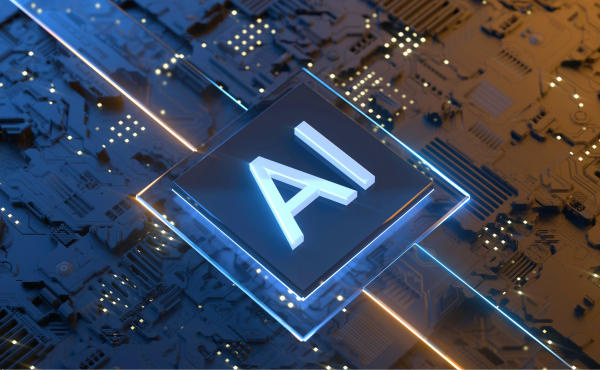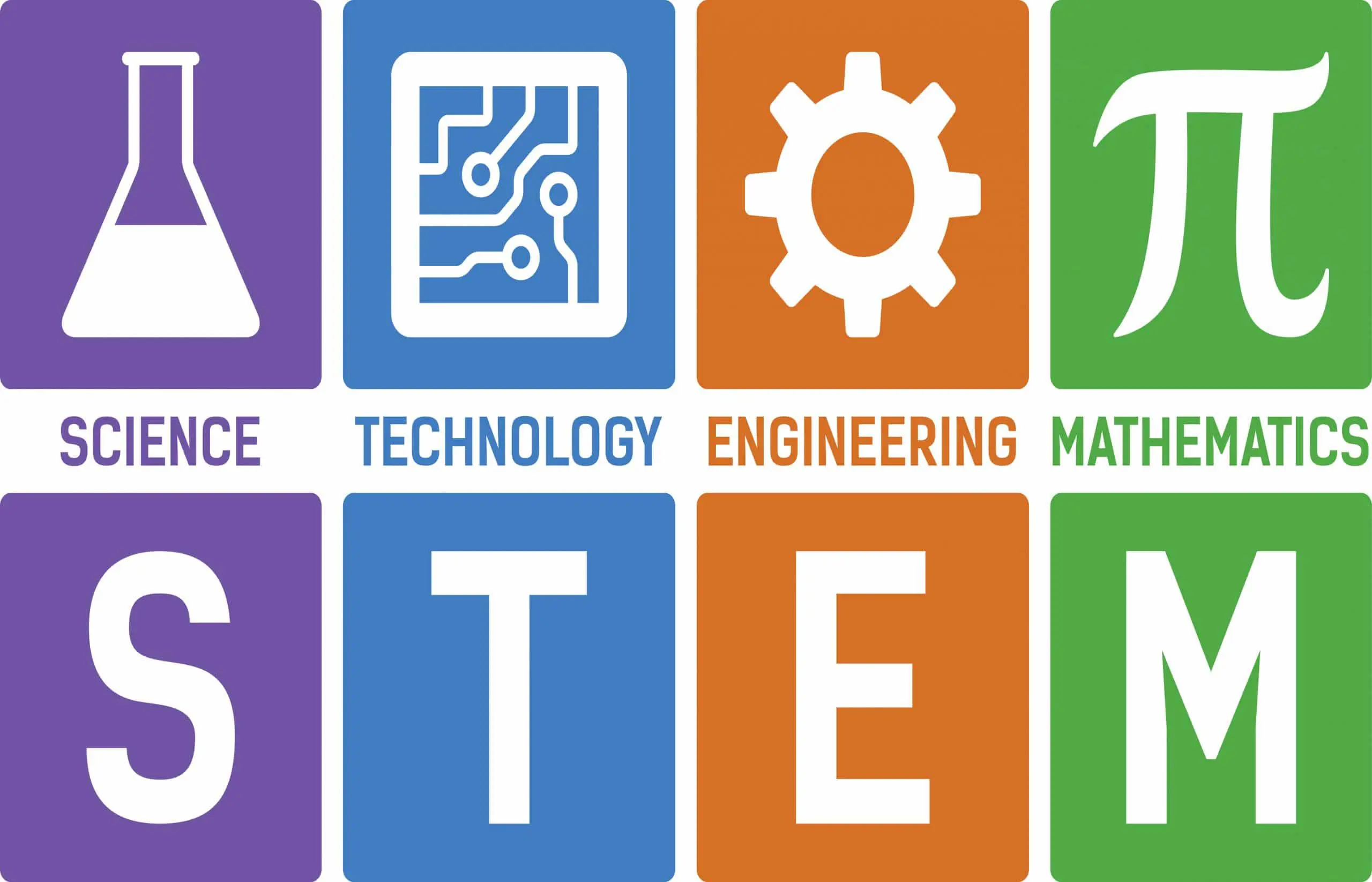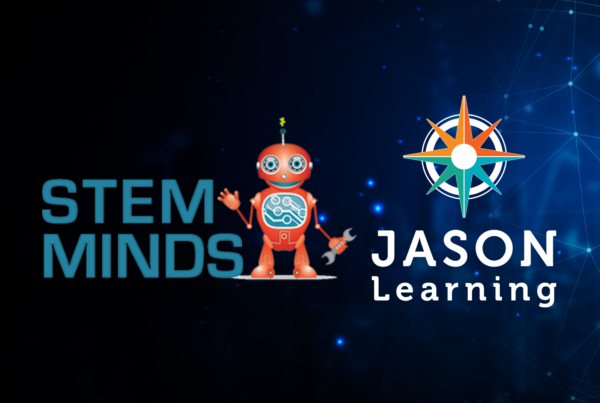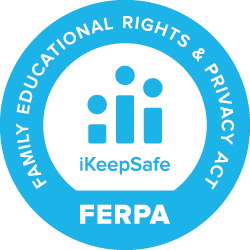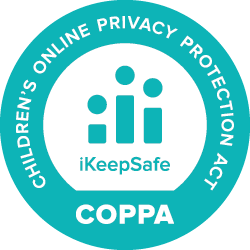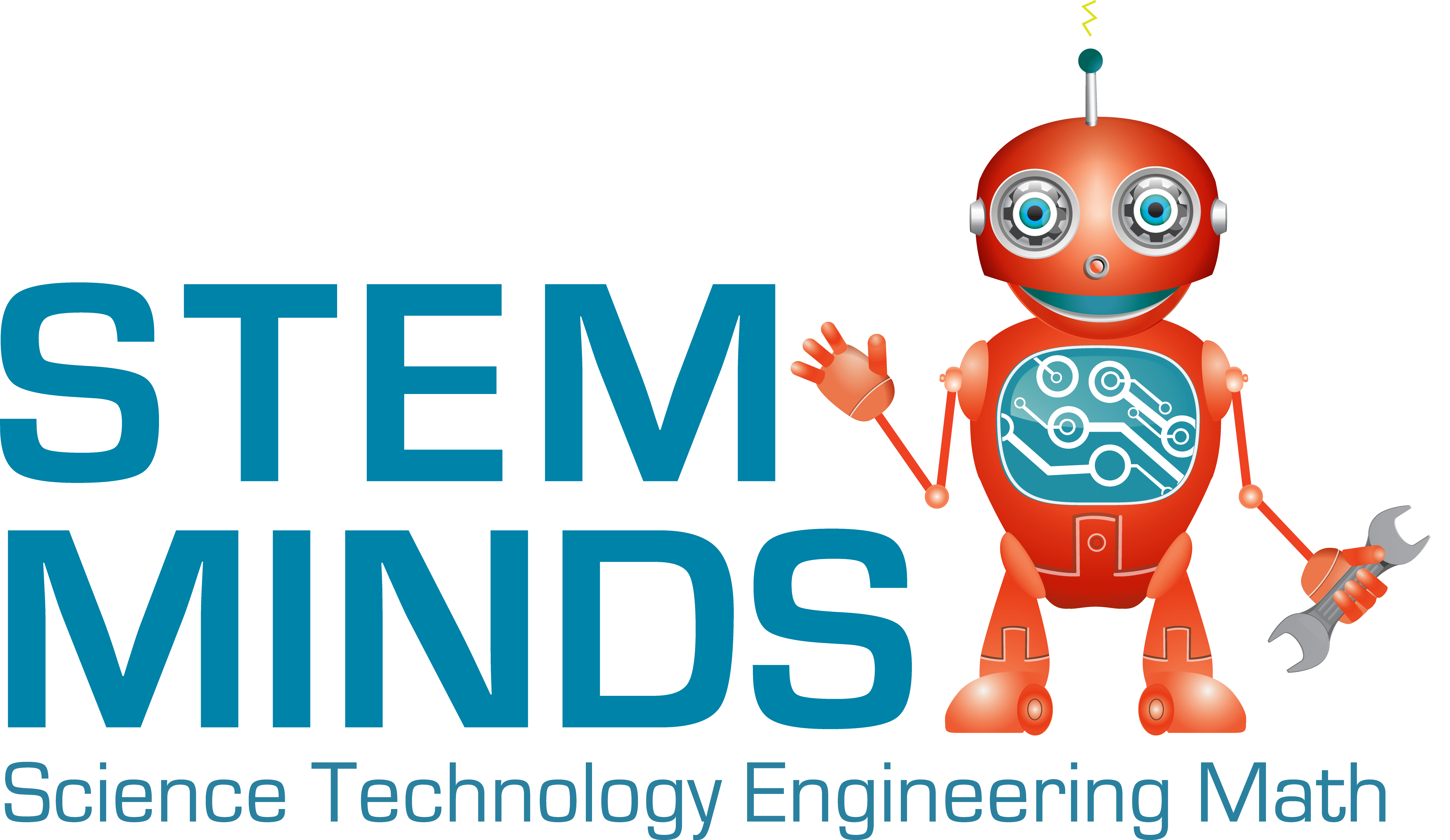

New Curricula
Databases
Technology and Well Being
Microplastics
Coding with Javascript
Advanced STEM – Cloud Computing
Advanced STEM – Chatbots
JASON Learning & STEM Minds — A Partnership to Revolutionize Access to STEM Education Nationwide in the USA
JASON Learning, a leading provider of STEM education resources, and STEM Minds, an organization dedicated to empowering students with hands-on STEM learning experiences, have joined forces to help more teachers and students access quality STEM resources.
As part of this partnership, STEM Minds’ content will now be available on the JASON Digital Platform. Together, JASON Learning & STEM Minds will revolutionize access to STEM education by making engaging, high-quality programs and resources accessible to students across the nation in the US.
This partnership will provide users with more technology resources to engage students in STEM learning, prepare the next generation for future careers in STEM fields, and equip them with the skills needed to thrive in a rapidly changing technological landscape.

“At STEM Minds, we are passionate about empowering students with hands-on learning experiences that foster creativity, critical thinking, problem-solving, and more. By joining forces with JASON and integrating our cutting-edge STEM content into the JASON Digital Platform, we are expanding access to high-quality STEM resources and making learning engaging and accessible for students of all backgrounds.”
Anu BidaniFounder & CEO, STEM Minds
About STEM Minds
STEM Minds was founded in March 2016 based on a personal need identified by the founding partners, Anu and Yash Bidani. With aspirations to introduce their two bright boys to STEM-based learning and career opportunities, they knew they couldn’t leave it to the schools alone.
Anu recognized she could create unique STEM education programs for youth ages 4-18 to unlock their full potential. Beginning in the summer of 2016 with just a handful of students to now having reached more than 40,000+ students by 2020, Anu’s dream of empowering youth through STEM education has been made a reality.
The STEM Minds resources offer comprehensive, creative STEAM education courses that include a variety of arts-focused classes taught through a tech lens, supplementing our core STEM curriculum. Their on-demand course platform, STEAM Hub, blends technology, narrative writing, public speaking, photography, and videography to create a holistic learning experience.
With STEM Minds, students across North America are getting the hands-on, personalized STEM experiences they deserve from an expert team of licensed educators and STEM professionals. Students build their skills and confidence as they explore the amazing world of STEM.
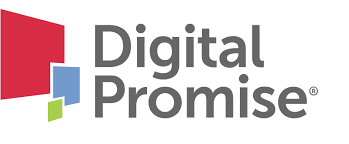
STEM Minds Microcredentialing provided by Digital Promise
Personalize and get recognized for your learning with micro-credentials! Fully backed by Digital Promise, STEM Minds Student Micro-Credentials are designed to support students in showcasing their learning through research-based competency-building. “Micro-credentials are competency-based, on-demand, personalized, and shareable.” They empower students to drive their learning and earn recognition for their efforts.
Available Microcredentialing
Coding Mastery Pathway
Entrepreneurship Mastery Pathway
Video Game Design Mastery Pathway
Advanced STEM Mastery Pathway
Digital Art & Media Mastery Pathway
Computer Science & Hardware Mastery Pathway (Coming Soon!)
Robotics Mastery Pathway
STEM Minds Curricula
- Learning Foundations
- Coding
- Game Design
- Robotics
- Digital Art & Media
- Computer Science & Hardware
- Entrepreneurship
- Financial Literacy
- Environment & Climate
- Advanced STEM
Courses in this pathway will help students...
In the Learning Foundations Mastery Pathway, students will explore a range of basic skills related to language, math, and computers through courses that address the following learning goals:
- Understand the fundamentals of math and language
- Be able to use a computer independently to perform basic functions
- Understand the evolution of the world, society, and technology over the last hundred years
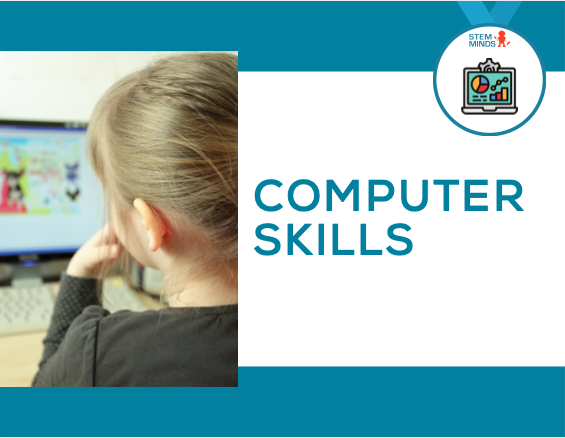
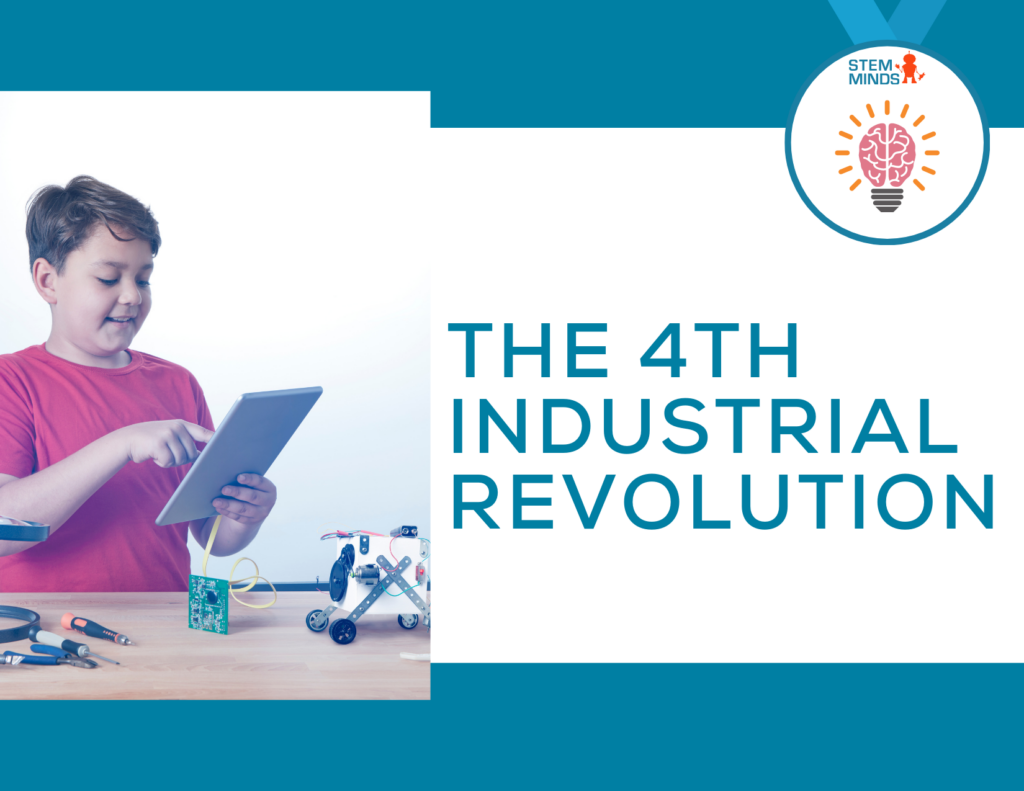
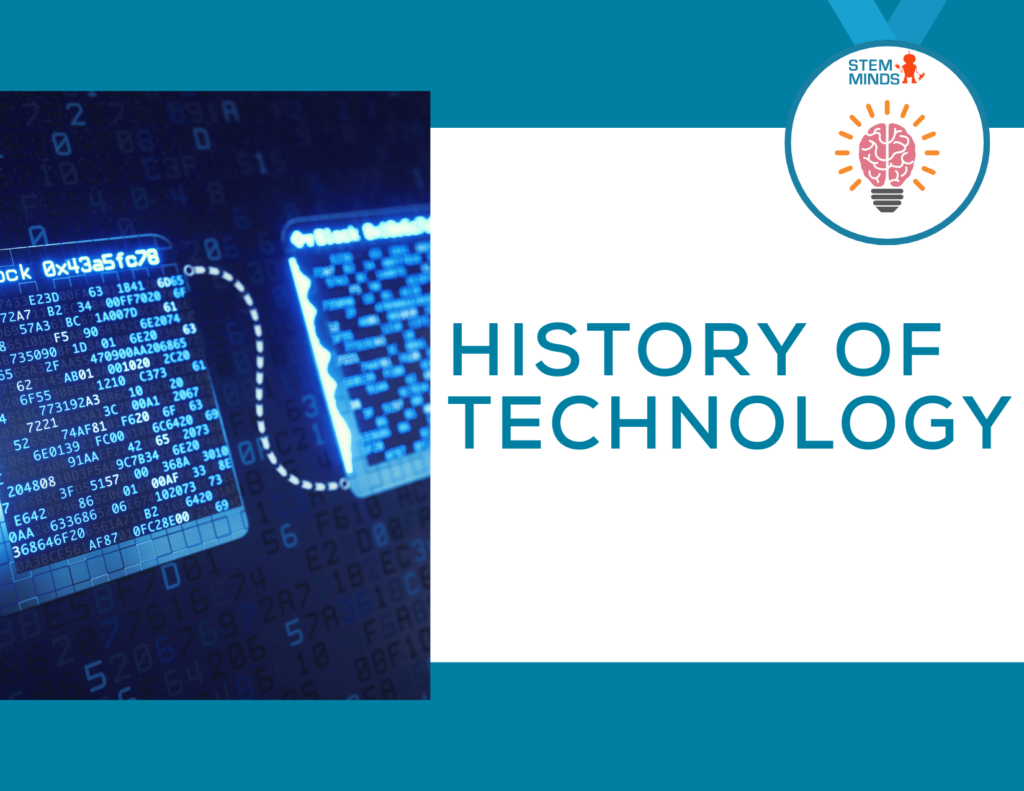
Module 2: Technology & Industry
Module 3: Technology & Society
Module 4: Technology & the Environment
Module 5: Technology & Culture
Courses in this pathway will help students...
In the Coding Mastery Pathway students are able to explore a range of coding languages through courses that address the following learning goals:
- Understand the fundamental concepts of coding (e.g. sequence, conditionals, etc.) across a range of programming languages
- Be able to create a working program that meets desired specifications through “remixing” projects and the creation of unique projects
- Develop and use troubleshooting strategies to refine and iterate projects
- Understand the real-world applications of coding, related careers, and opportunities for personal growth through programming
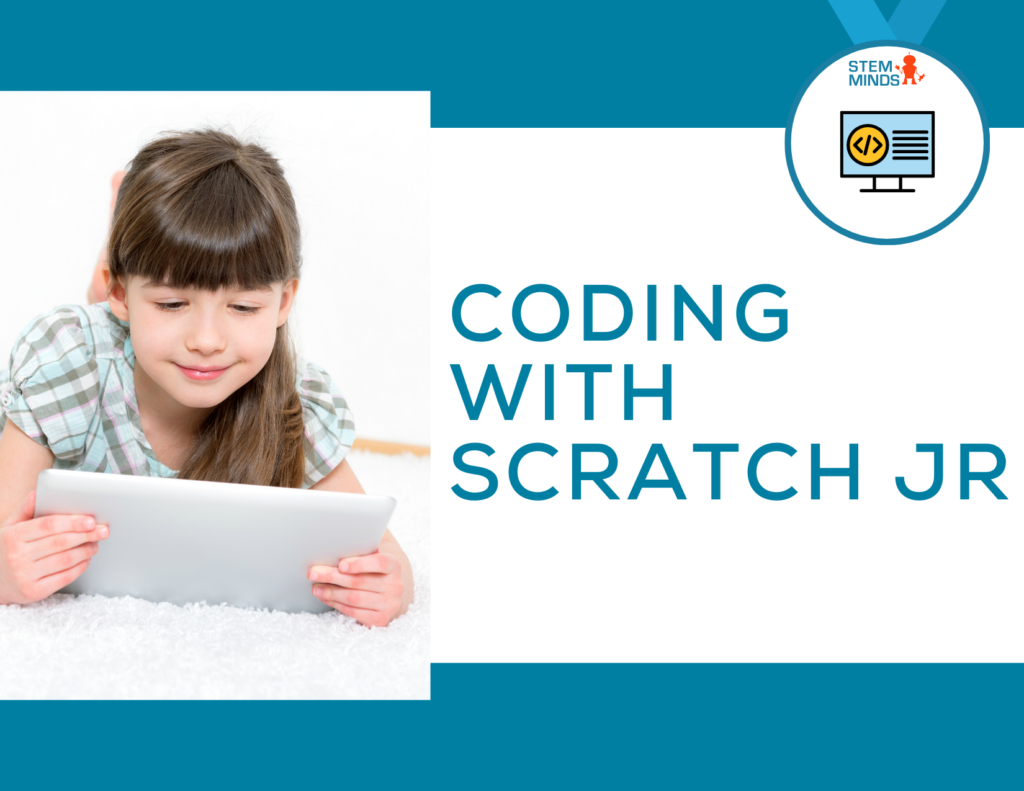
Module 1: Intro to Coding
Module 2: Scratch Jr. Basics
Module 3: Concurrent Events
Module 4: Advanced Blocks
Module 5: Project Feedback
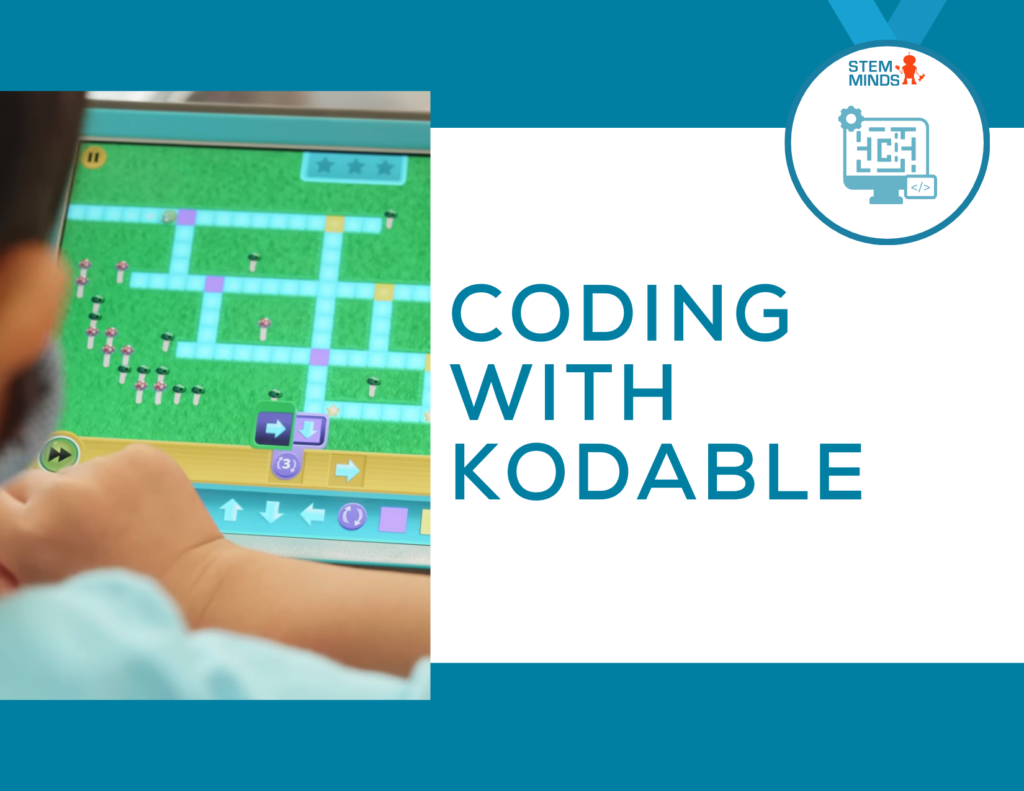
Module 1: Intro to Coding
Module 2: Getting Started & Sequences
Module 3:Conditions
Module 4: Loops & Nested Events
Module 5: Functions
Module 6: Maze Creation
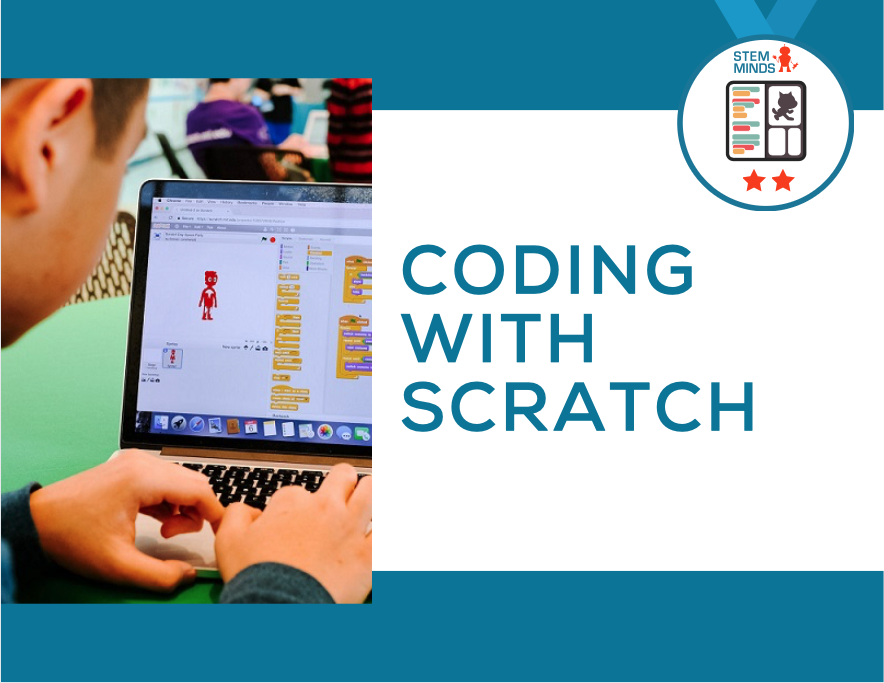
Module 1: Intro to Coding
Module 2: Digital Stories with Scratch – Getting Started with Scratch
Module 3: Digital Stories with Scratch – Multiple Characters & Scenes
Module 4: Digital Stories with Scratch – Advanced Code Blocks
Module 5: Digital Stories with Scratch – Final Submission
Module 6: Video Games with Scratch – Planning & Creating Game Sprites
Module 7: Video Games with Scratch – Main Character Movement
Module 8: Enemies & Collectibles
Module 9: Video Games with Scratch – New Levels
Module 10: Playtesting & Peer Feedback
Module 11: Final Game Submission
Module 12: Course Wrap Up
Module 13: End of Course Badge and Certificate
Module 14: Global Goals Challenges
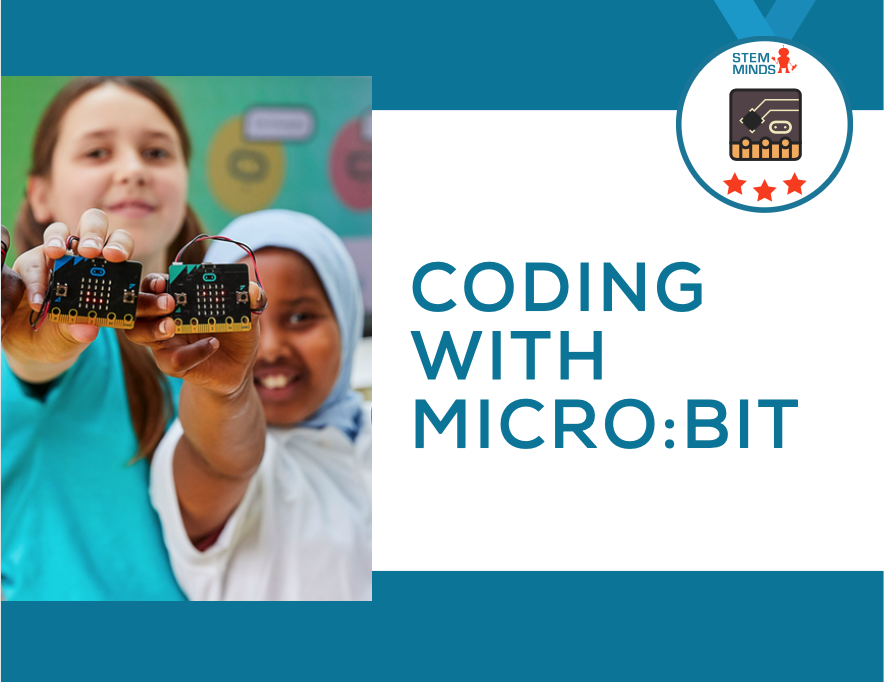
Module 1: Intro to Computer Science
Module 2: Intro to Micro:Bit
Module 3: Using Buttons
Module 4: Using Loops
Module 5: Decision Making & Conditionals
Module 6: Using Accelerometer, Temperature & Light Sensors
Module 7: Communicating with the Radio
Module 8: Final Project
Module 9: Playtesting & Peer Feedback
Module 10: Course Wrap Up
Bonus Module: Using Pins & DIY Sensors
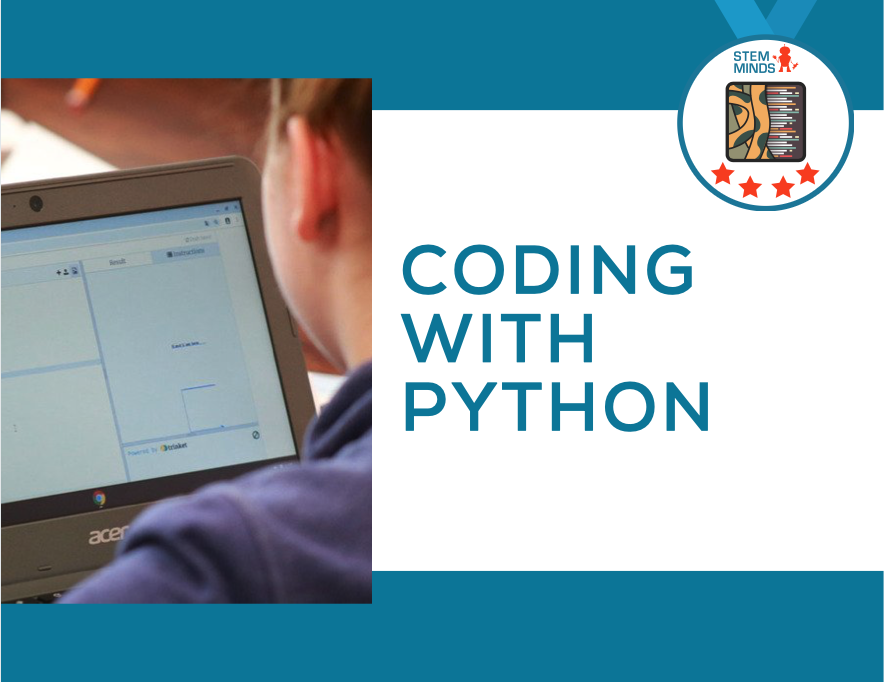
Module 1: Intro to Computer Science & Working with Print
Module 2: Using Variables
Module 3: Using Turtles & Libraries
Module 4: Using Inputs
Module 5: Using Conditionals
Module 6: For & While Loops
Module 7: Using Lists
Module 8: Using Functions
Module 9: Using Random
Module 10: Final Project & Planning
Module 11: Testing & Peer Feedback
Module 12: Course Wrap Up
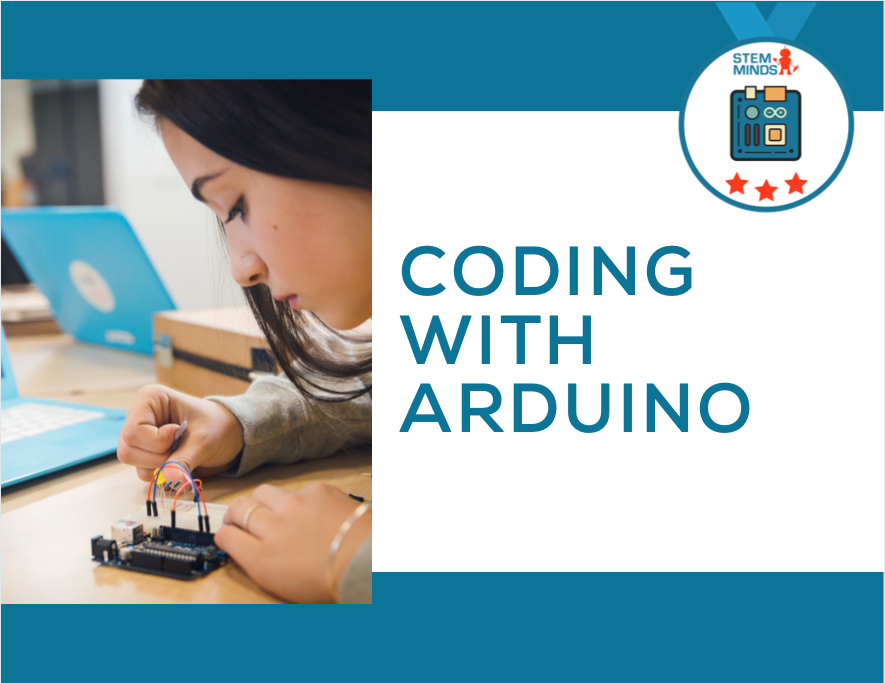
Module 1: Intro to Computer Science
Module 2: Intro to Arduino
Module 3: Buttons and Conditions
Module 4: analogWrite
Module 5: RGB LEDs
Module 6: Servo Motors
Module 7: Randomness
Module 8: Intro to the Final Project
Module 9: Peer Feedback
Module 10: Course Wrap Up
Module 11: End of Course Badge & Certificate
Bonus Module: Using Potentiometers
Module 12: Global Goals Challenges
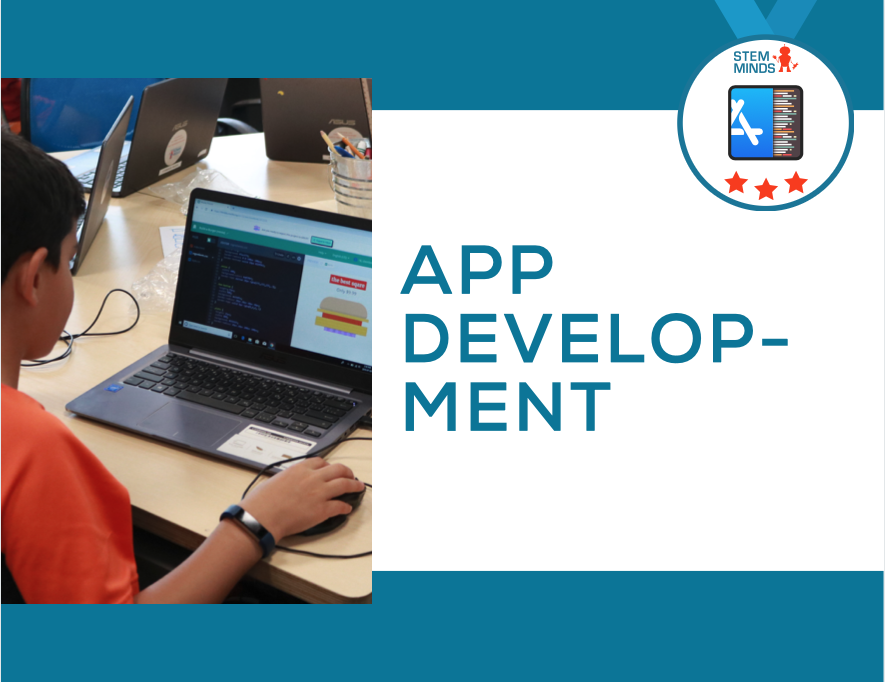
Module 1: Intro to App Development
Module 2: Design Thinking
Module 3:Intro to Thunkable & Creating Great Home Pages
Module 4: Content Pages & User Input
Module 5: Artistry & Multimedia
Module 6: Advanced Design
Module 7: Testing & Peer Feedback
Module 8:Incorporating Feedback
Module 9: Pitching Your App
Module 10: Course Wrap Up
Module 11: End of Course Badge and Certificate
Module 12: Global Goals Challenges
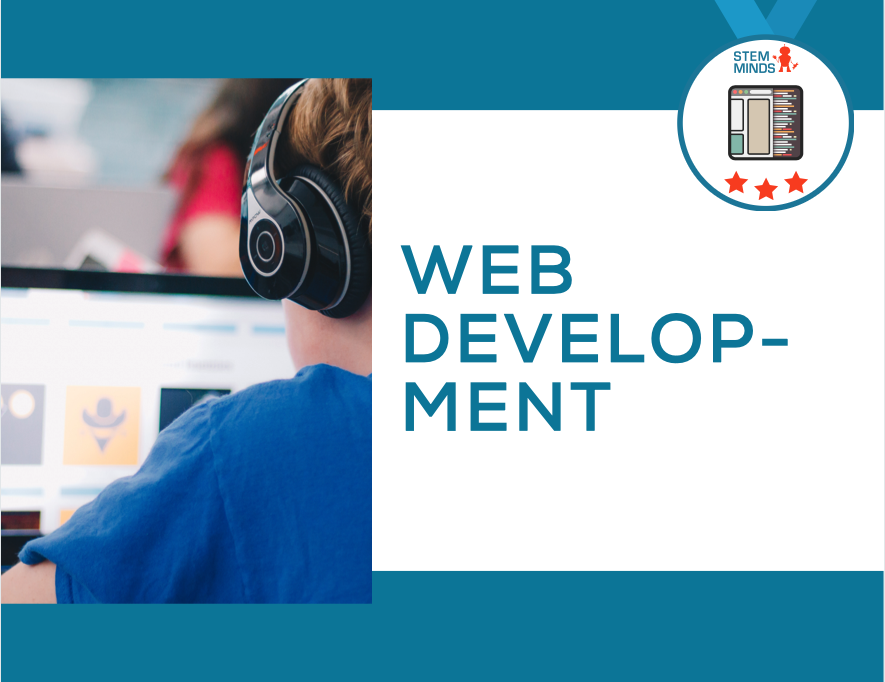
Module 1: Intro to Web Development
Module 2:HTML Basics
Module 3: CSS Basics
Module 4: Web Design & Advanced Tags
Module 5: Challenge 1
Module 6: Remix Challenge
Module 7: Fix This Page Challenge
Module 8: Design Thinking
Module 9: Final Project
Module 10: Testing & Peer Feedback
Module 11: Course Wrap Up
Module 12: Global Goals Challenges
Module 13: End of Course Badge and Certificate
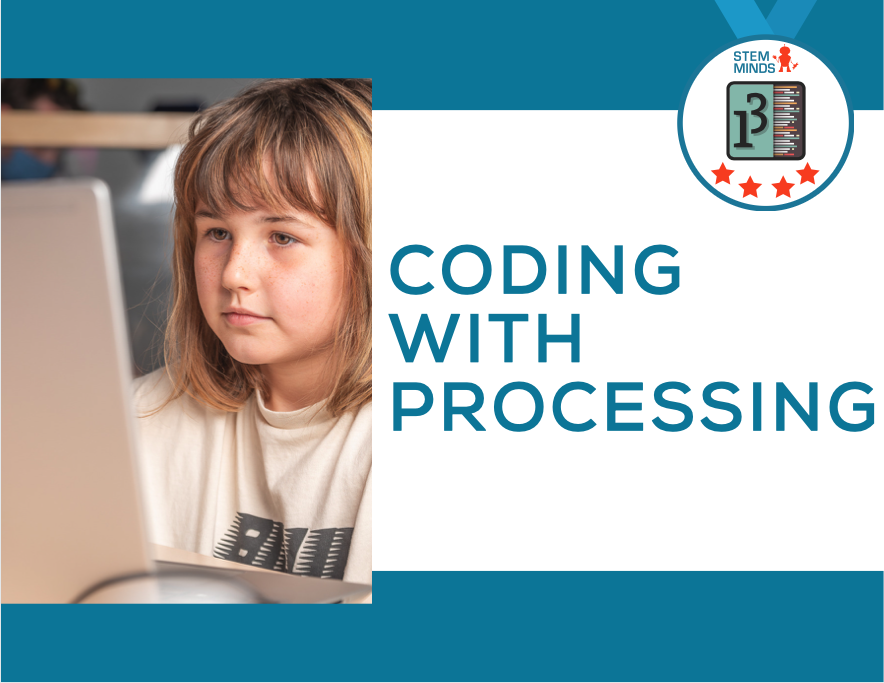
Module 1: Intro to Computer Science
Module 2: Intro to Processing
Module 3: Using Color and Generative Art
Module 4: Decision Making and Conditionals
Module 5: Using Loops
Module 6: Using Keyboard and Mouse Inputs
Module 7: Using External Media
Module 8: Intro to Final Project
Module 9: Testing & Peer Feedback
Module 10: Course Wrap Up
Module 11: End of Course Badge & Certificate
Module 12: Global Goals Challenges
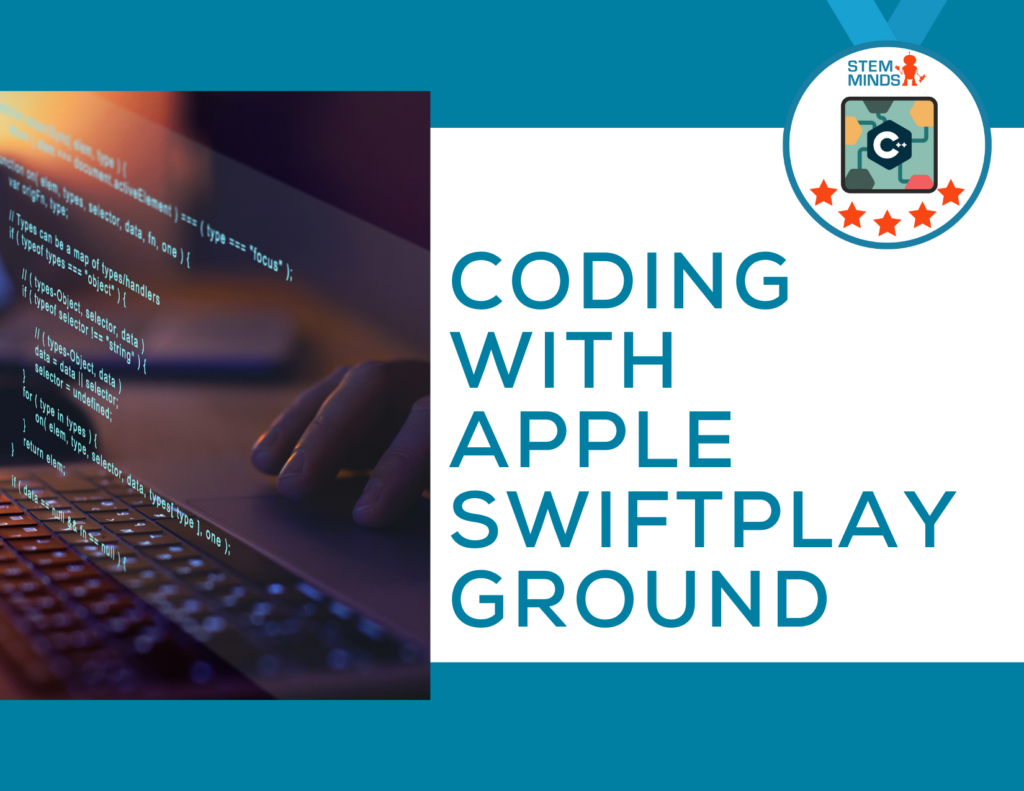
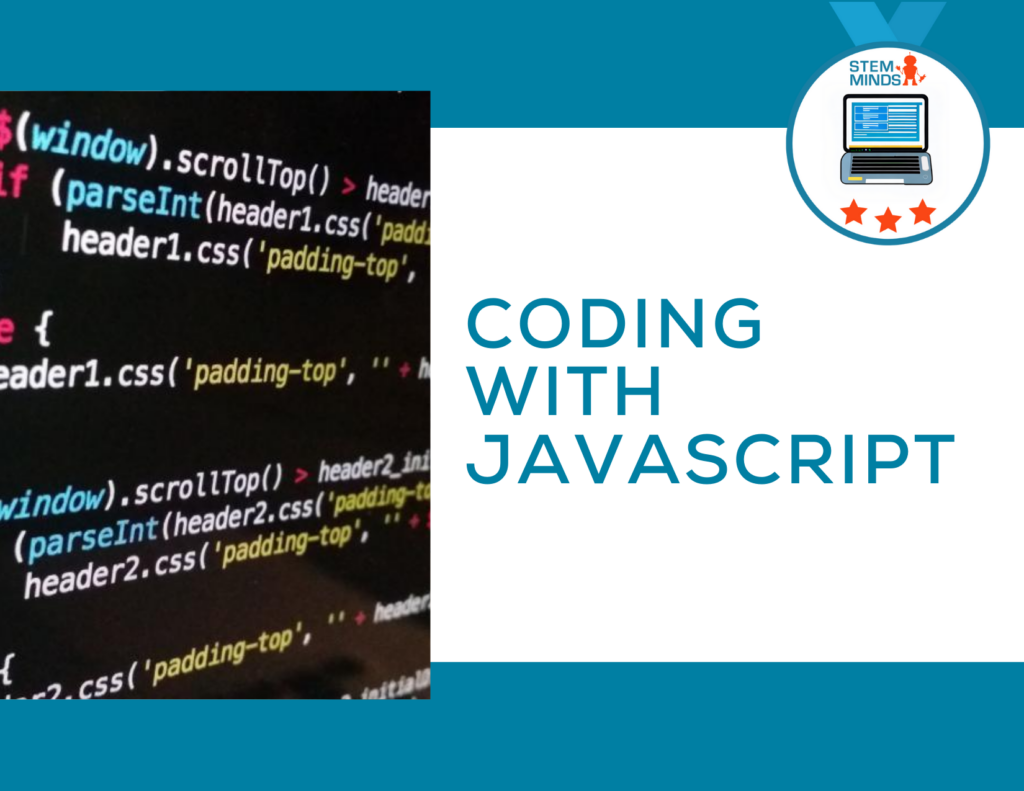
Module 2: Introduction to JavaScript
Module 3: Fundamentals of Functions
Module 4: Control Flow
Module 5: Loops, Maps, Dictionaries
Module 6: Basics of HTML and CSS
Module 7: Document Object Model
Module 8: Object-Oriented Programming
Module 9: Other Parts of JavaScript
Module 10: Using External Libraries
Module 11: Course Wrap Up
Module 12: End of Course Survey & Course Certificate
Module 13: Global Goals Challenges
Courses in this pathway will help students...
In the Game Design Mastery Pathway, students are able to create a variety of fully playable video games through a range of courses that address the following learning goals:
- Understand the fundamental concepts of coding (e.g. sequence, conditionals, etc.) across a range of programming languages
- Be able to create a working video game that meets desired specifications through “remixing” projects and the creation of unique projects
- Develop and use troubleshooting strategies to refine and iterate projects
- Understand the real-world applications of game design, related careers, and opportunities for personal growth through game design
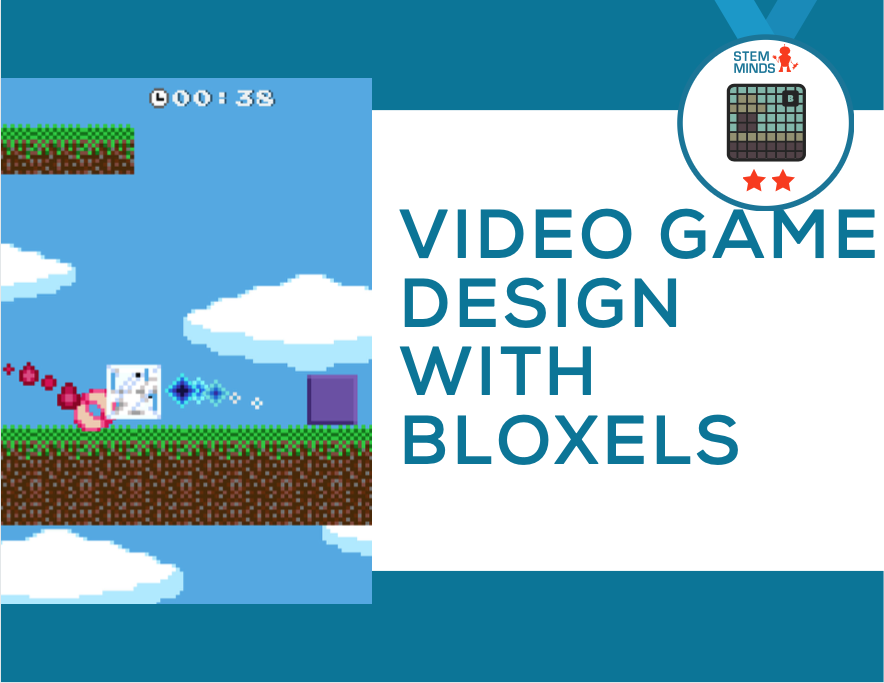
Module 1: Intro to Video Game Design
Module 2: Design Thinking & Video Game Design
Module 3: Level Design
Module 4: Art Design &Animations
Module 5: Enemy Design
Module 6: Character Design
Module 7: Mid Background
Module 8: Background
Module 9: Music & Final Edits
Module 10: Playtesting & Peer Feedback
Module 11: Final Submission
Module 12: Course Wrap Up
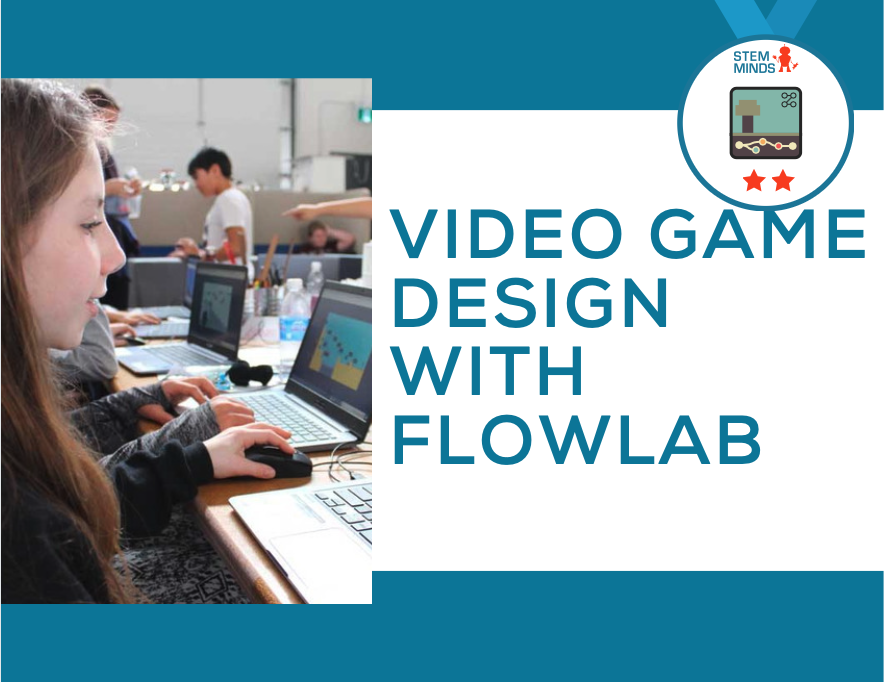
Module 1: Intro to Video Game Design
Module 2: Design Thinking & Video Game Design
Module 3: Creating Sprites
Module 4: Creating Animations
Module 5: Collision Part 1
Module 6: Collisions Part 2
Module 7: Creating Game Levels
Module 8: Additional Game Levels Part 2
Module 9: Playtesting & Peer Feedback
Module 10: Pitching Your Game
Module 11: Final Submission
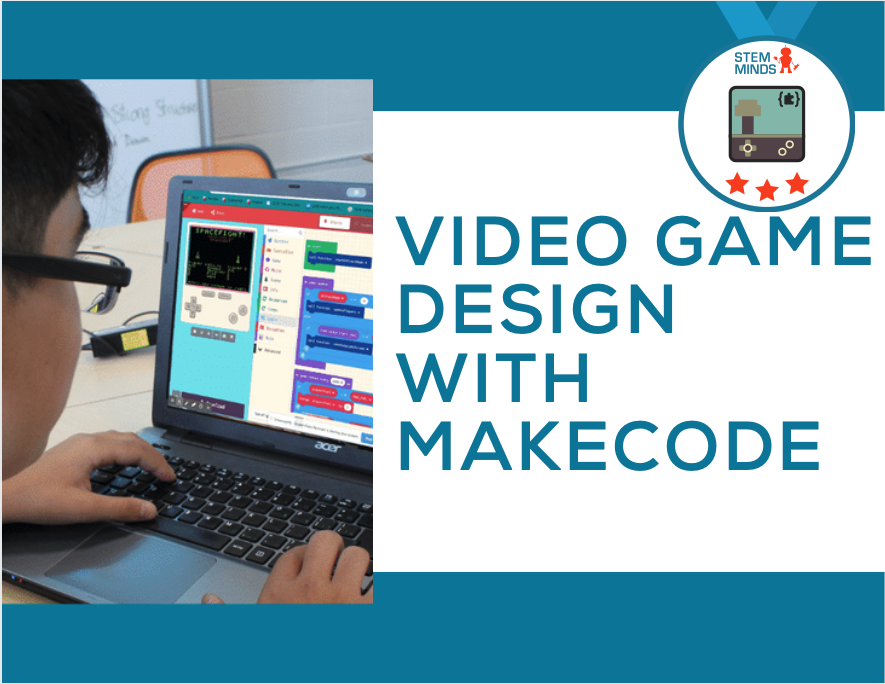
Module 1: Chase Game
Module 2: Catch Game
Module 3: Blaster Game
Module 4: Maze Game
Module 5: Platformer Game Part 1
Module 6: Platformer Game Part 2
Module 7: Platformer Game Part 3
Module 8: Intro to the Final Project
Module 9: Playtesting & Peer Feedback
Module 10: Course Wrap Up
Module 11: End of Course Badge & Certificates
Module 12: Global Goals Challenges
Courses in this pathway will help students...
In the Robotics Design Mastery Pathway students are able to explore programming with several robots intended for elementary-aged students through a range of courses that address the following learning goals:
- Understand the fundamental concepts of coding (e.g., sequence, conditionals, etc.) across a range of programming languages
- Be able to write code to meet desired specifications and address real world constraints
- Develop and use troubleshooting strategies to refine and iterate projects
- Understand the real world applications of robotics, related careers, and opportunities for personal growth through robotics
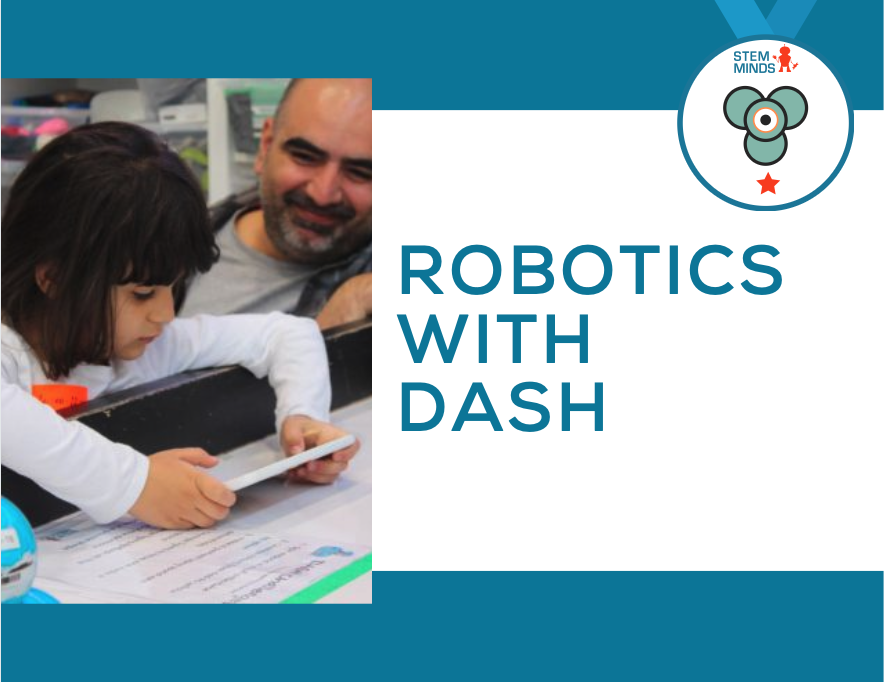
Module 1: The World of Coding & Robotics
Module 2: Drive
Module 3: Look & Animations
Module 4: Wait
Module 5: Lights
Module 6: Repeat
Module 7: Sounds
Module 8: Function & Events
Module 9: Conditions
Module 10: Final Challenge
Module 11: Course Wrap Up
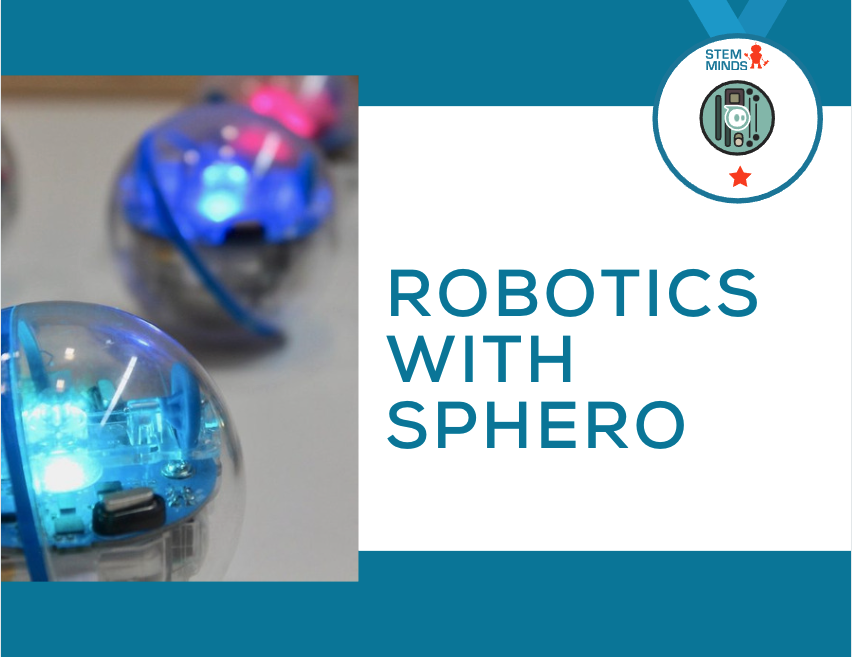
Module 1: The World of Coding & Robotics
Module 2: Movement Basics
Module 3: Loops & Delays
Module 4: Lights & Sounds
Module 5: Operators & Comments
Module 6: Variables
Module 7: Functions
Module 8: Events
Module 9: Final Challenge
Module 10: Course Wrap Up
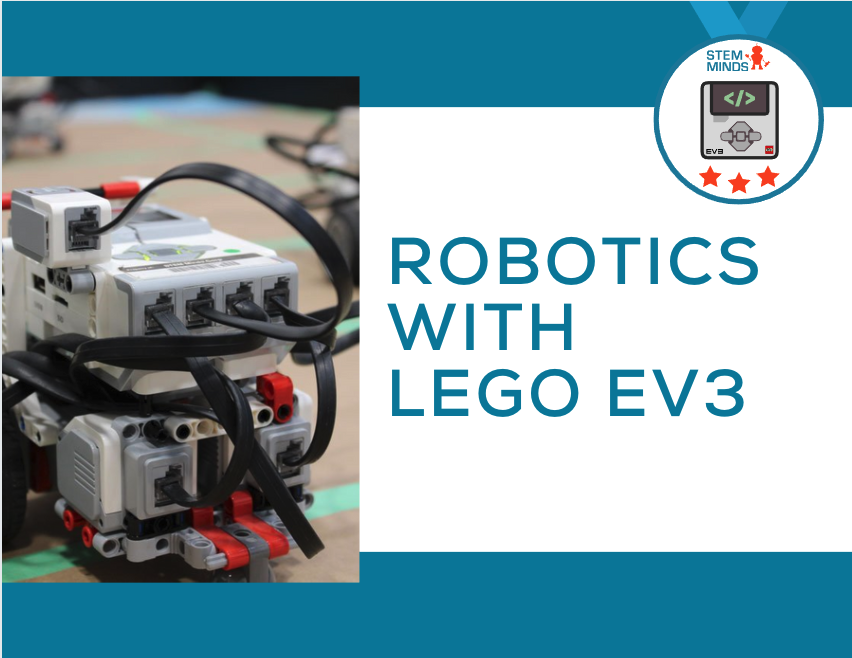
Module 1: Intro to Coding & Robotics
Module 2: Intro to EV3 & Moving Straight
Module 3: Turning
Module 4: Medium Motor/Arm
Module 5: Loops, Wait & Brick Light
Module 6: Multitasking & Comments
Module 7: Touch Sensor
Module 8: Ultrasonic Sensor
Module 9: Color Sensor
Module 10: Gyro Sensor
Module 11: Final Challenge
Module 12: Course Wrap Up
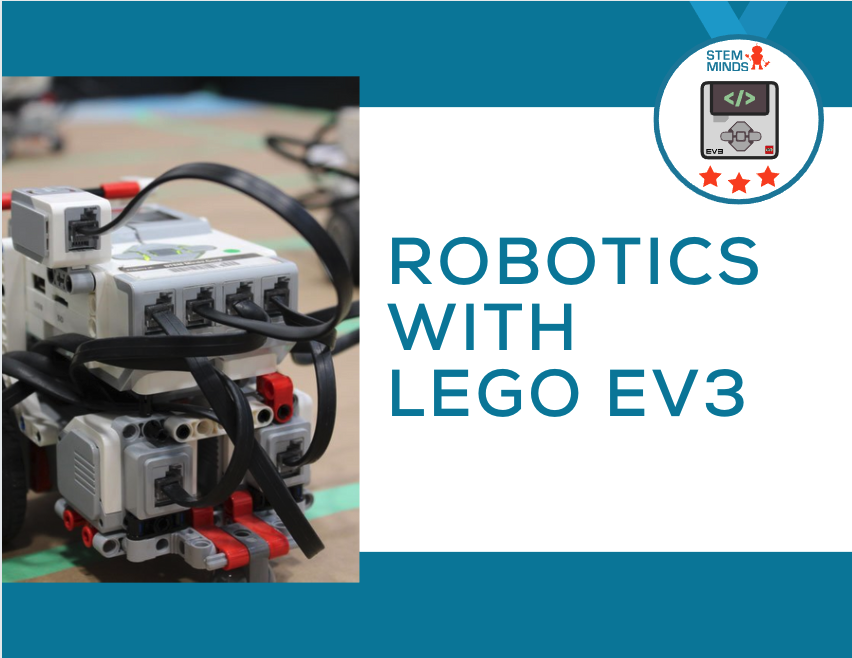
Module 1: Intro to Coding & Robotics
Module 2: Intro to EV3 & Moving Straight
Module 3: Turning
Module 4: Medium Motor/Arm
Module 5: Loops, Wait & Brick Light
Module 6: Multitasking & Comments
Module 7: Touch Sensor
Module 8: Ultrasonic Sensor
Module 9: Color Sensor
Module 10: Gyro Sensor
Module 11: Final Challenge
Module 12: Course Wrap Up
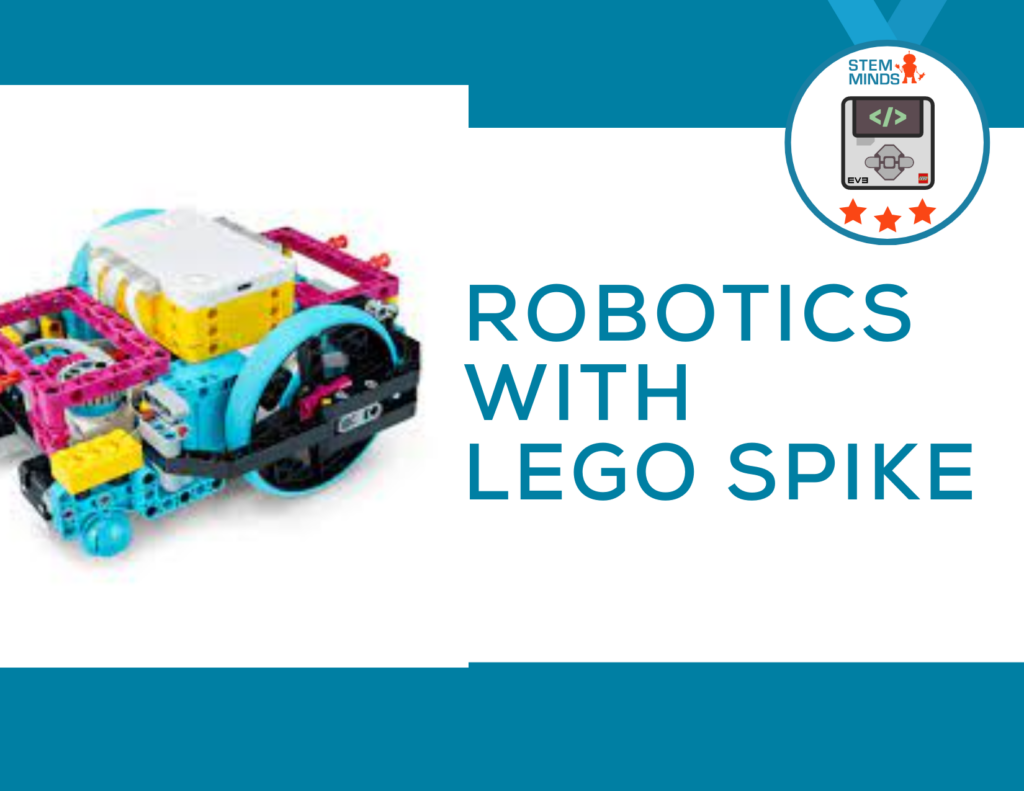
Module 1: Intro to Coding & Robotics
Module 2: Intro to SPIKE & Moving Straight
Module 3: Turning
Module 4: Medium Motor/Arm
Module 5: Loops, Wait & Brick Light
Module 6: Multitasking & Comments
Module 7: Force Sensor
Module 8: Distance Sensor
Module 9: Color Sensor
Module 10: Gyro Sensor
Module 11: Final Challenge
Module 12: Course Wrap Up
Courses in this pathway will help students...
In the Digital Art & Media Mastery Pathway, students explore a variety of arts-based courses and create a range of projects that address the following learning goals:
- Understand the elements and principles of art and design
- Be able to create a range of creative projects that incorporate fundamental art and design concepts
- Refine and iterate projects over time with feedback
- Understand the real world applications of digital art and media, related careers, and opportunities for personal growth through digital art and media
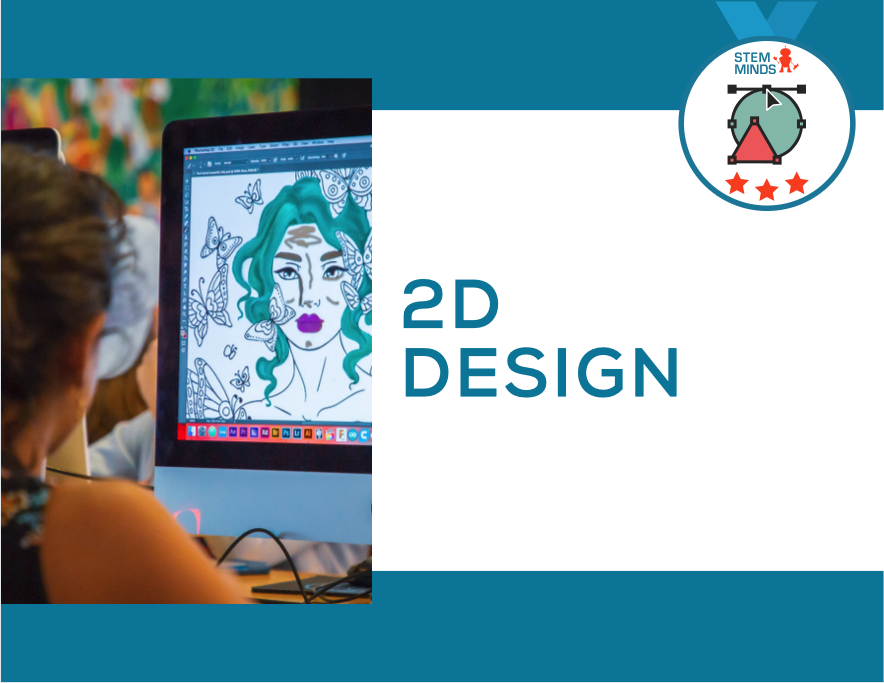
Module 1: Intro to 2D Design
Module 2: Graphic Design Part 1
Module 3: Graphic Design Part 2
Module 4: CNC Machines
Module 5: Laser Cutting
Module 6: Vinyl Cutting
Module 7: Animation
Module 8: Final Project
Module 9: Peer Feedback
Module 10: Course Wrap Up
Module 11: End of Course Bage and Certificate
Module 12: Global Goals Challenges
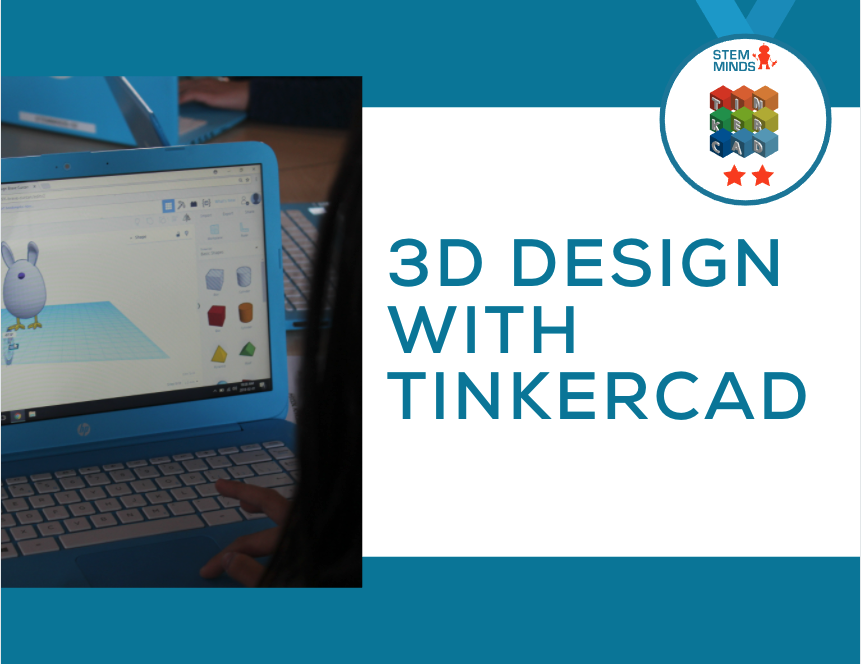
Module 1: Let’s Get Started
Module 2: Intro to 3D Design and Printers
Module 3: 3D Design Basics with TinkerCad
Module 4: Intro to Design Thinking
Module 5: Dream House Project
Module 6: Layered Shapes
Module 7: Holes & Hollow Shapes
Module 8: Interlocking Parts
Module 9: 3D Design in the Real World – Ancient Artifacts
Module 10: 3D Design in the Real World – Prototypes and Models
Module 11: Final Project
Module 12: Peer Feedback
Module 13: Course Wrap Up
Module 14: End of Course Badge and Certificate
Module 15: Global Goals Challenge
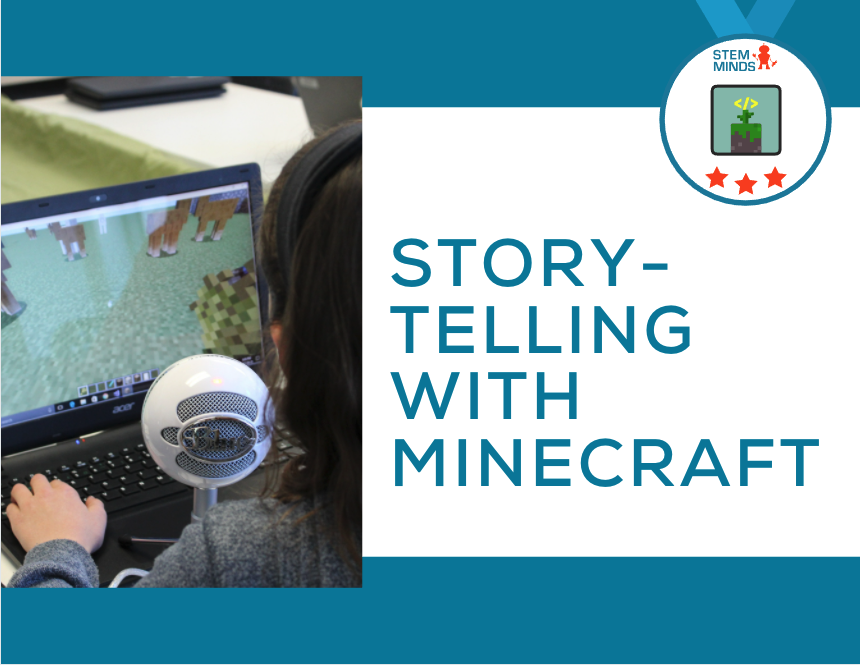
Module 1: Minecraft Basics/Controls
Module 2: Narrative Arcs
Module 3: Building Your Story Setting
Module 4: World Management
Module 5: Story Elements with Minecraft
Module 6: Adding NPCs/Narrators/Dialogue
Module 7: Using Redstone
Module 8: Playtesting & Peer Feedback
Module 9: Final Submission
Module 10: Course Wrap Up
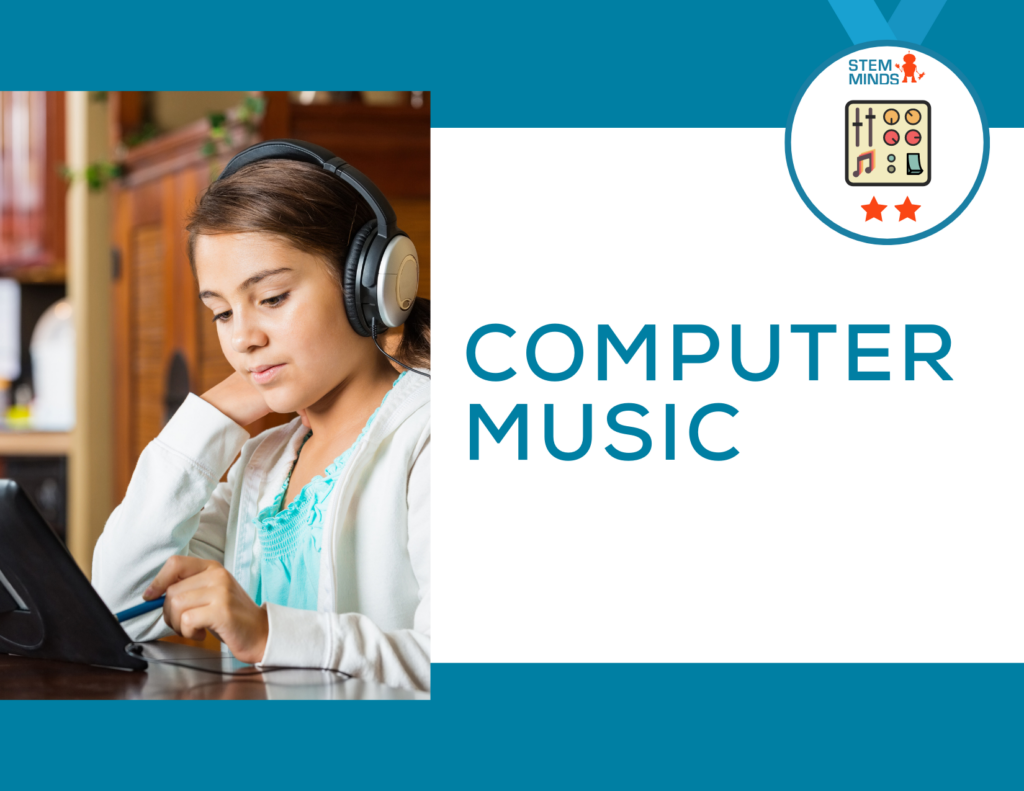
Module 1: Intro to Computer Music
Module 2: Melody
Module 3: Harmony
Module 4: Song Form & Structure
Module 5: Rhythm
Module 6: Texture
Module 7: Timbre
Module 8: Using Synth & Sound Effects
Module 9: Conditions
Module 10: Peer Feedback
Module 11: Course Wrap Up
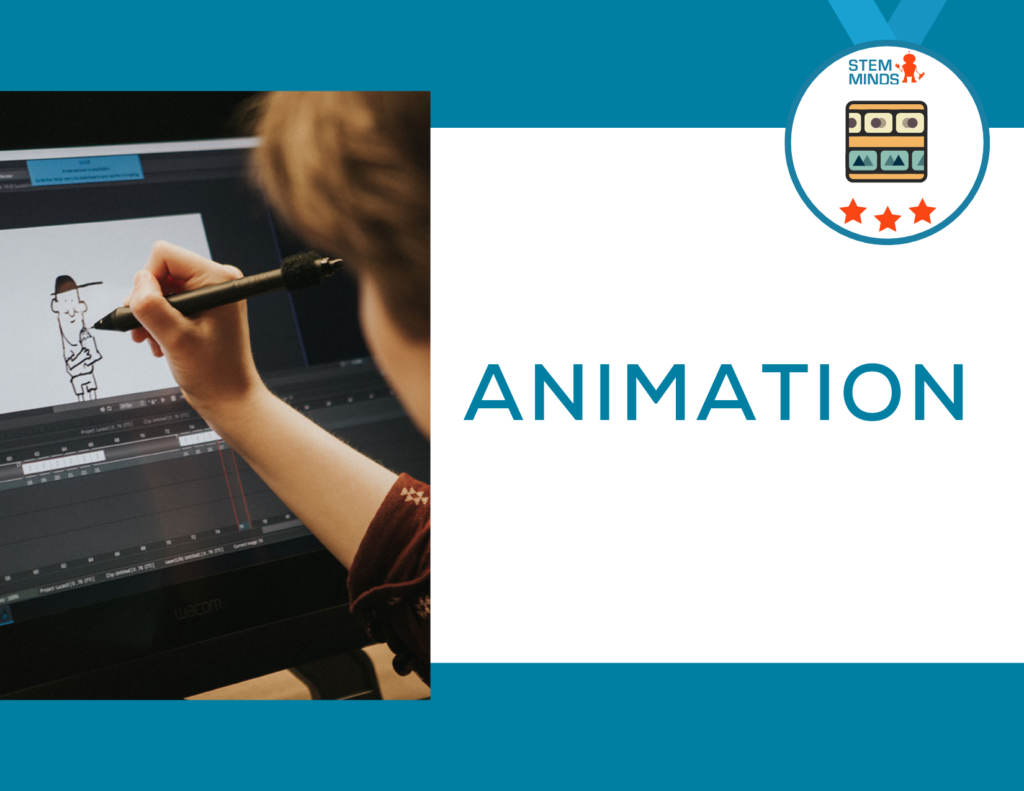
Module 1: Intro to Animation
Module 2: Intro to Wick Editor
Module 3: Anticipation & Staging
Module 4: Slow-in & Slow-out
Module 5: Follow Through & Overlapping Action
Module 6: Arc & Timing
Module 7: Straight Ahead & Pose to Pose
Module 8: Secondary Action & Solid Drawing
Module 9: Design Thinking & Storyboarding
Module 10: Final Project
Module 11: Peer Feedback
Module 12: Course Wrap Up
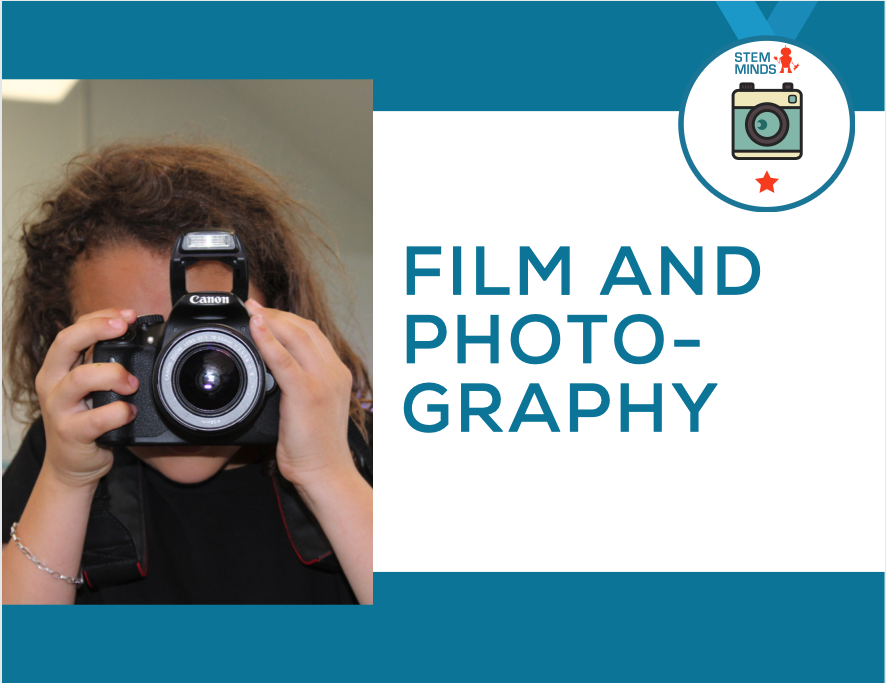
Module 2: Focal Point & the Rule of Thirds
Module 3: Design Elements Part 1
Module 4: Design Elements Part 2
Module 5: Angles & Perspective
Module 6: Lighting
Module 7: Stop Motion Animation Part 1
Module 8: Stop Motion Animation Part 2
Module 9: Final Project
Module 10: Peer Feedback
Module 11: Course Wrap Up
Courses in this pathway will help students...
In the Computer Science & Hardware Pathway, students will explore a range of core concepts and projects that address the following learning goals:
- Understand the fundamental workings of computers and their parts
- Analyze and display data in a variety of contexts
- Understand the core principles. of cybersecurity and digital citizenship and apply them in everyday computer use
- Understand the real world applications of computer science, related careers, and opportunities for personal growth through computer science
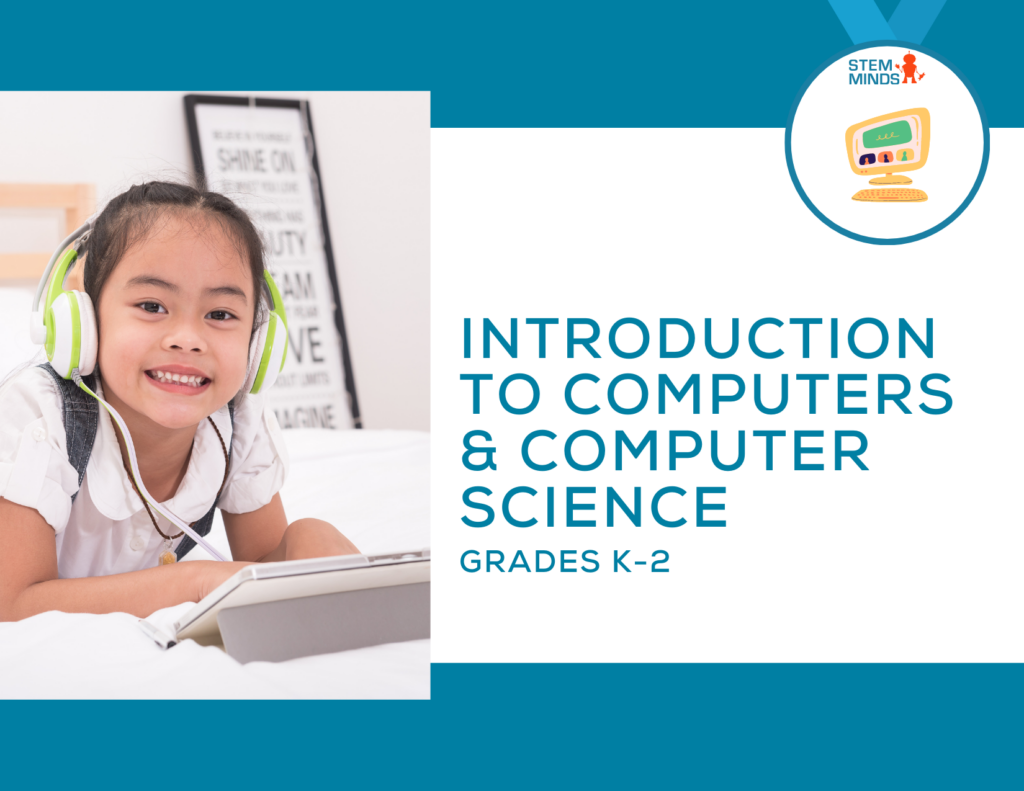
Module 1: Intro to Computers & Networks
Module 2: Computers & Troubleshooting
Module 3: Excel Basics
Module 4: Excel Formulas
Module 5: Sorting & Filtering in Excel
Module 6: Pivot Tables & Charts
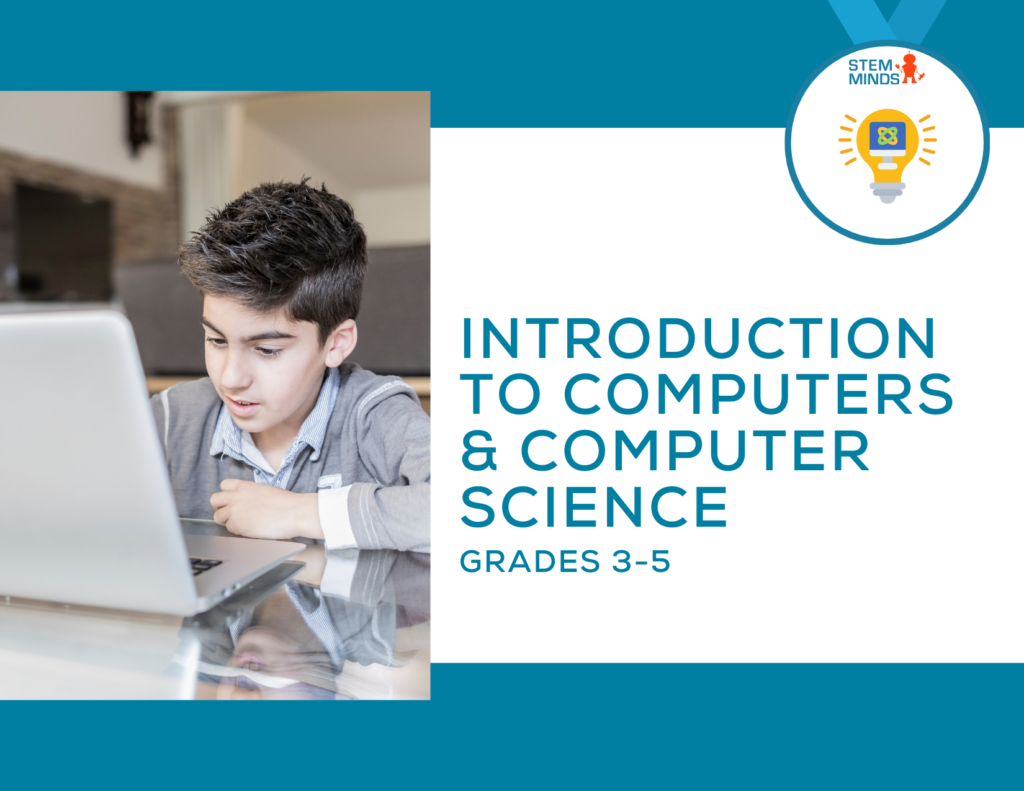
Module 1: Intro to Computers & Networks
Module 2: Computers & Troubleshooting
Module 3: Excel Basics
Module 4: Excel Formulas
Module 5: Sorting & Filtering in Excel
Module 6: Pivot Tables & Charts
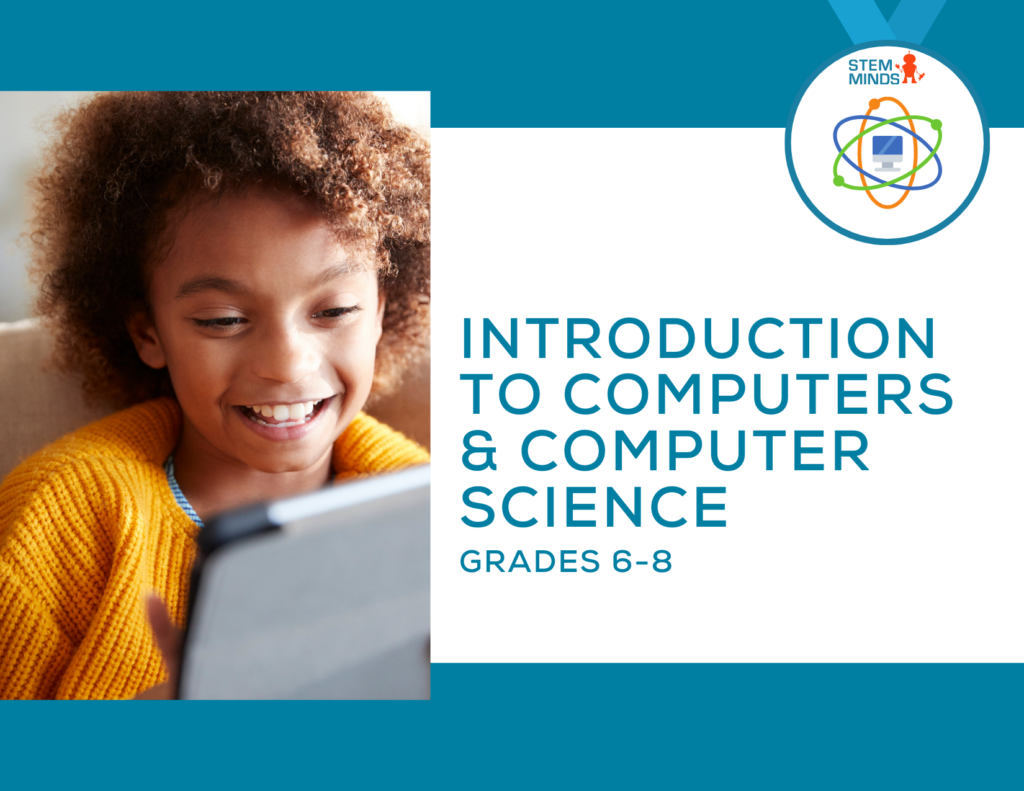
Module 1: Intro to Computers & Networks
Module 2: Computers & Troubleshooting
Module 3: Excel Basics
Module 4: Excel Formulas
Module 5: Sorting & Filtering in Excel
Module 6: Pivot Tables & Charts
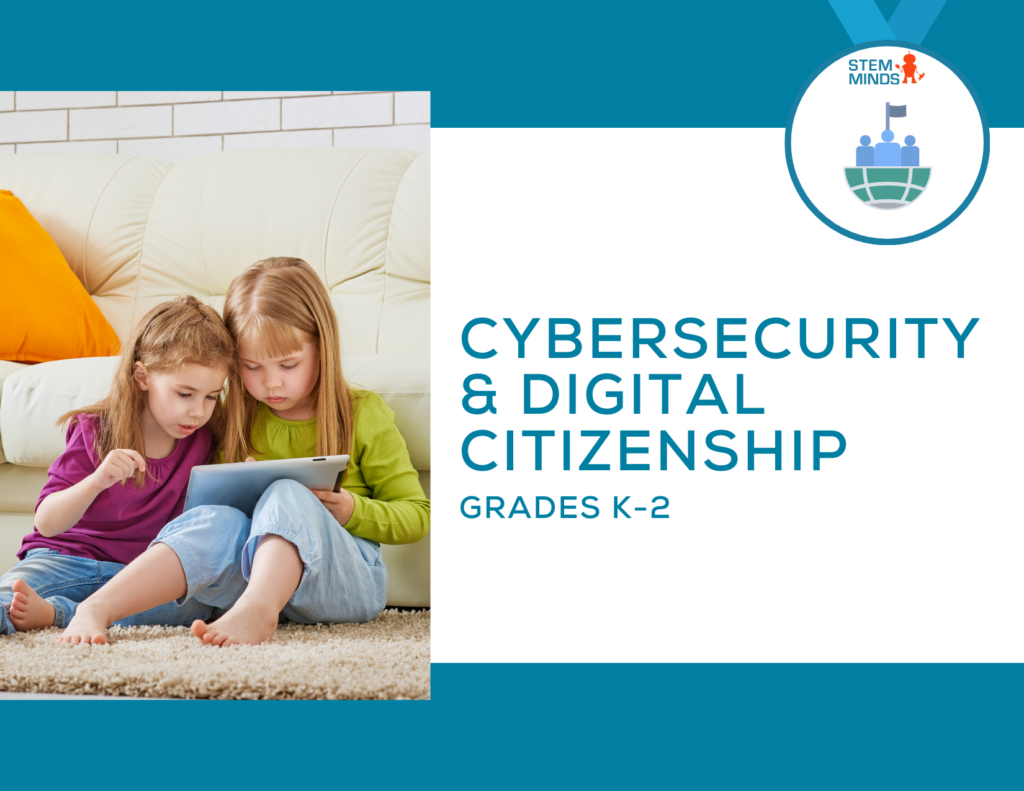
Module 1: Computers & Us
Module 2: Is It Kind?
Module 3: Is It Safe?
Module 4: Is It Healthy?
Module 5: Is It True?
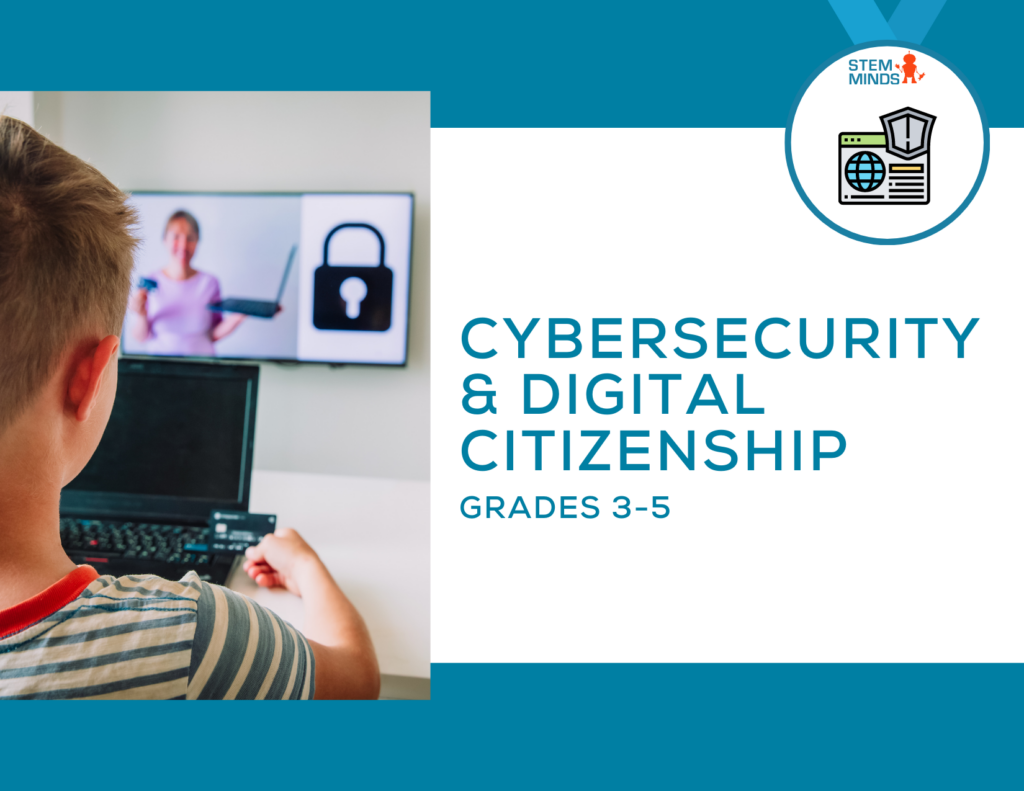
Module 1: Computers & Us
Module 2: Is It Kind?
Module 3: Is It Safe?
Module 4: Is It Healthy?
Module 5: Is It True?
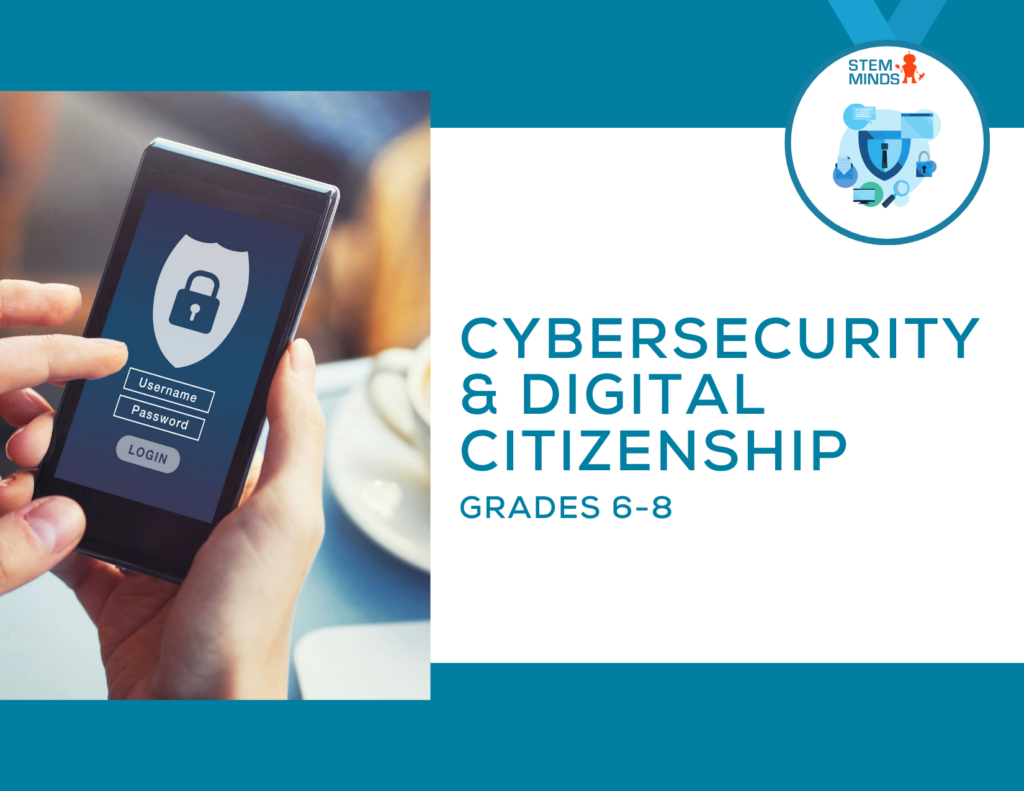
Module 1: Computers & Us
Module 2: Is It Kind?
Module 3: Is It Safe?
Module 4: Is It Healthy?
Module 5: Is It True?
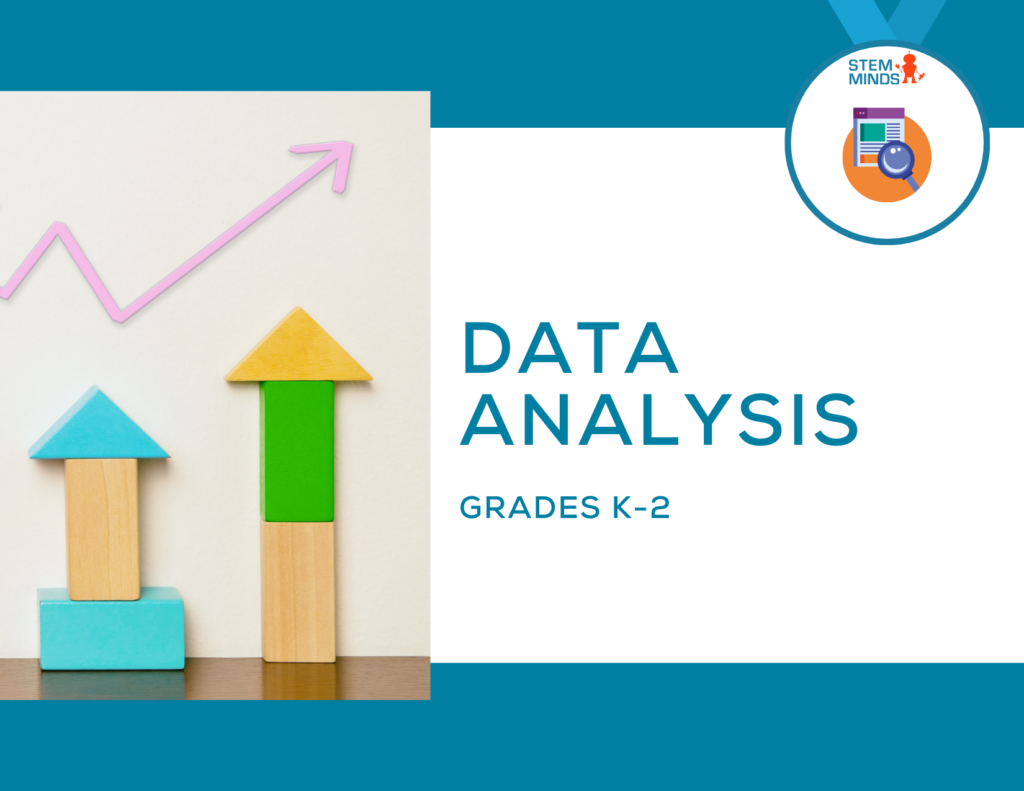
Module 1: What is Data?
Module 2: Collecting Data
Module 3: Representing Data
Module 4: Patterns in Data
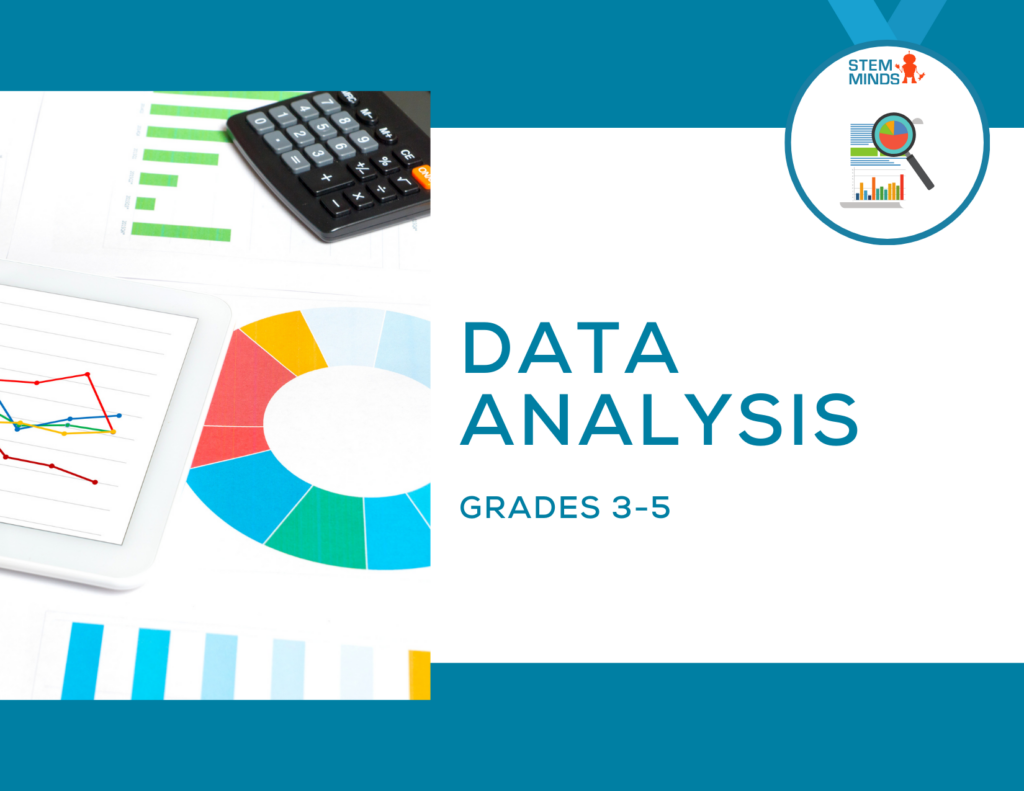
Module 1: What is Data?
Module 2: Collecting Data
Module 3: Representing Data
Module 4: Patterns in Data
Courses in this pathway will help students...
In the Entrepreneurship Mastery Pathway, students will explore a range of skills and concepts across the world of communication, design thinking, and business through courses that address the following learning goals:
- Understand the fundamental concepts of design thinking and audience
- Be able to create ideas and prototypes that meet desired specifications for an intended audience/user
- Understand the principles of business and communication to develop and communicate ideas
- Understand the real world applications of entrepreneurship, related careers, and opportunities for personal growth through entrepreneurship
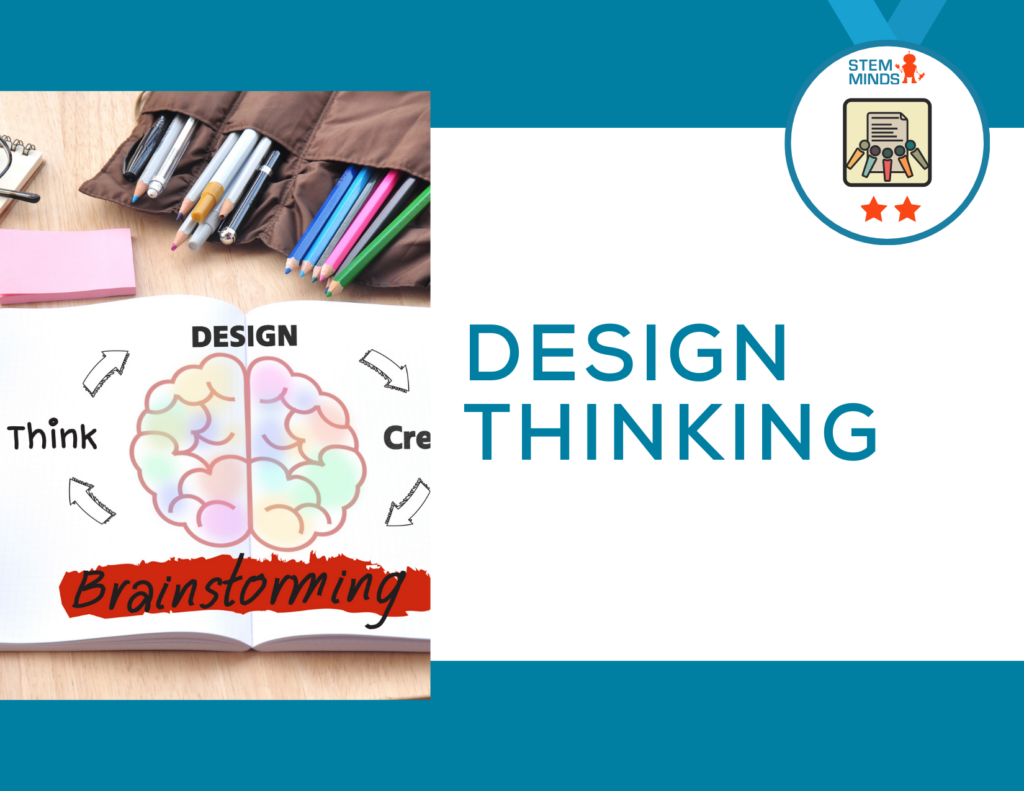
Module 1: Intro to Design Thinking
Module 2: Empathy in Design Thinking
Module 3: The Ask Stage
Module 4: Imagine Part 1
Module 5: Imagine Part 2
Module 6: The Planning Stage
Module 7: The Create Stage
Module 8: The Improve Stage
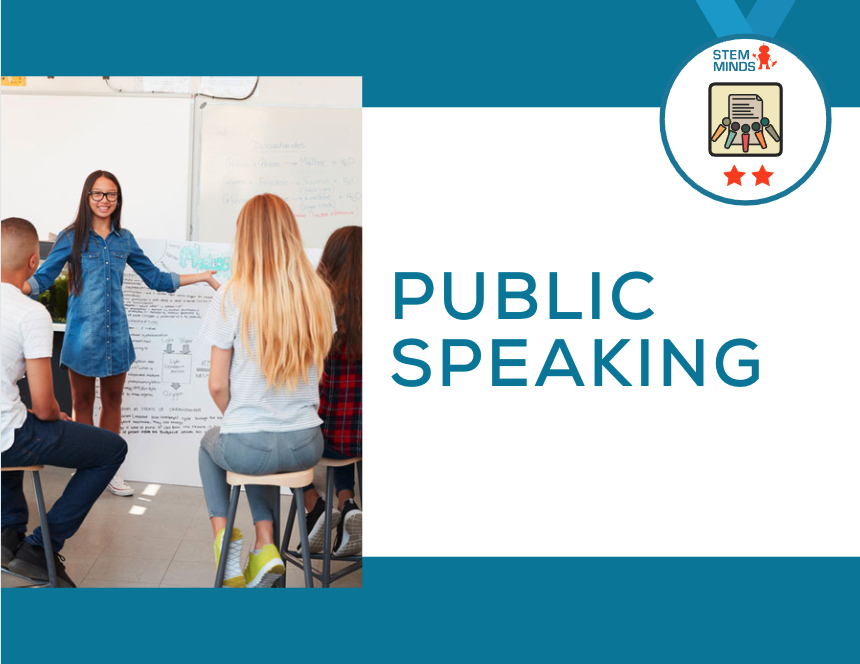
Module 1: The Secret to Great Public Speaking
Module 2: Understanding Your Audience
Module 3: Developing An Idea
Module 4: Script-Writing Part 1
Module 5: Script-Writing Part 2
Module 6: Visuals and Slide Decks
Module 7: Body Language
Module 8: Final Project
Module 9: Peer Feedback
Module 10: Course Wrap Up

Module 1: Intro to Entrepreneurship
Module 2: Skills & Characteristics
Module 3: Goods & Services
Module 4: Needs vs. Wants
Module 5: Design Thinking
Module 6: Market Research
Module 7: Feasibility
Module 8: Ethics, Permits, & Social Responsibility
Module 9: Marketing
Module 10: Final Project
Module 11: Peer Feedback & Project Update
Module 12: Course Wrap Up
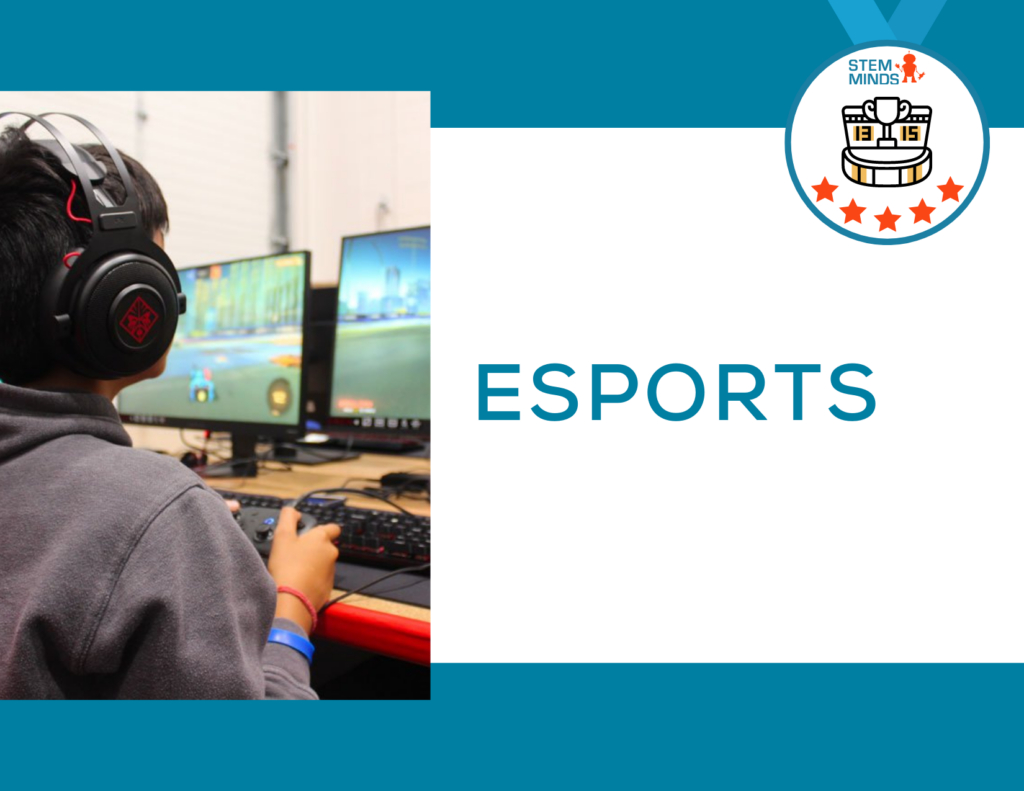
Module 1: Creating an eSports Team
Module 2: Teams & Branding
Module 3: Streaming & Content Creation
Module 4: Health in eSports
Module 5: Coaching in eSports
Module 6: Video On Demand and Player Feedback
Module 7: Game Design for eSports
Module 8: The Technology for eSports
Module 9: eSports Events
Module 10: Careers in eSports
Module 11: Course Wrap Up
Courses in this pathway will help students...
In the Financial Literacy Mastery Pathway, students will explore a range of skills and concepts across the world of financial literacy, money, savings, credit/loans, and more through courses that address the following learning goals:
- Understand the fundamental concepts of money and finances
- Be able to use financial literacy to meet the needs of themselves and their communities
- Understand the real-world applications and impacts of financial literacy and opportunities for personal growth
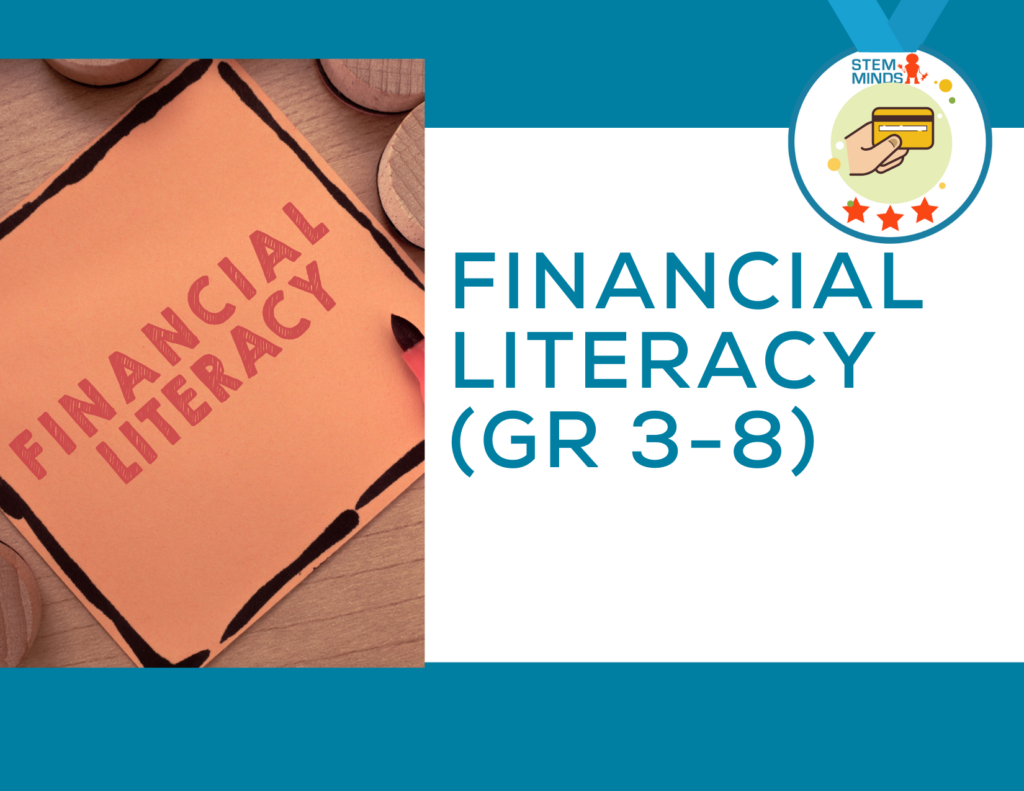
Module 1: Financial Decision Making
Module 2: Income & Careers
Module 3: Budgeting & Spending
Module 4: Credit & Borrowing
Module 5: Future Planning
Module 6: Consumer Awareness & Civic Engagement
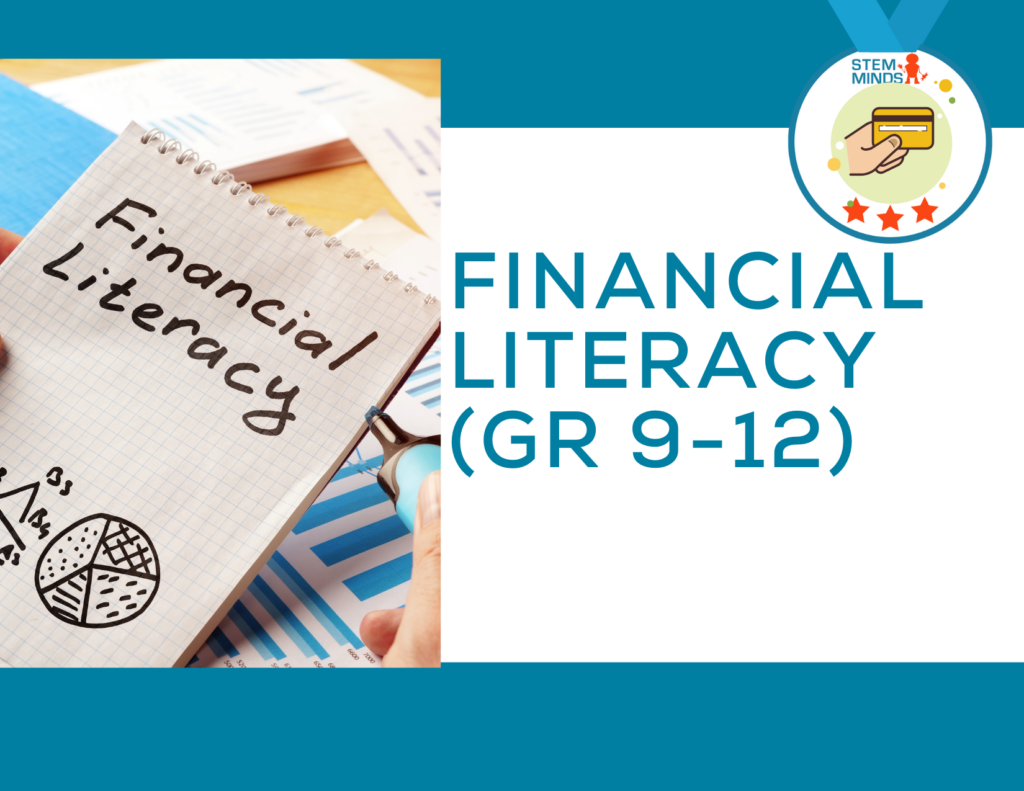
Module 1: Personal Finances Part 1
Module 2: Personal Finances Part 2
Module 3: Credit & Borrowing
Module 4: Consumer Awareness
Module 5: Technology & Finance
Module 6: Civic Engagement
Module 7: Finance & Entrepreneurship Part 1
Module 8: Finance & Entrepreneurship Part 2
Courses in this pathway will help students...
In the Environmental Mastery Pathway, students will explore a range of skills and concepts across the world of environmental ethics, stewardship, conservation, and green technology through courses that address the following learning goals:
- Understand the fundamental concepts of environmental advocacy, stewardship, conservation, and sustainability
- Be able to create ideas and prototypes that meet the needs of communities across the globe
- Understand the real-world applications of environmental tech, related careers, and opportunities for personal growth through stewardship and sustainability
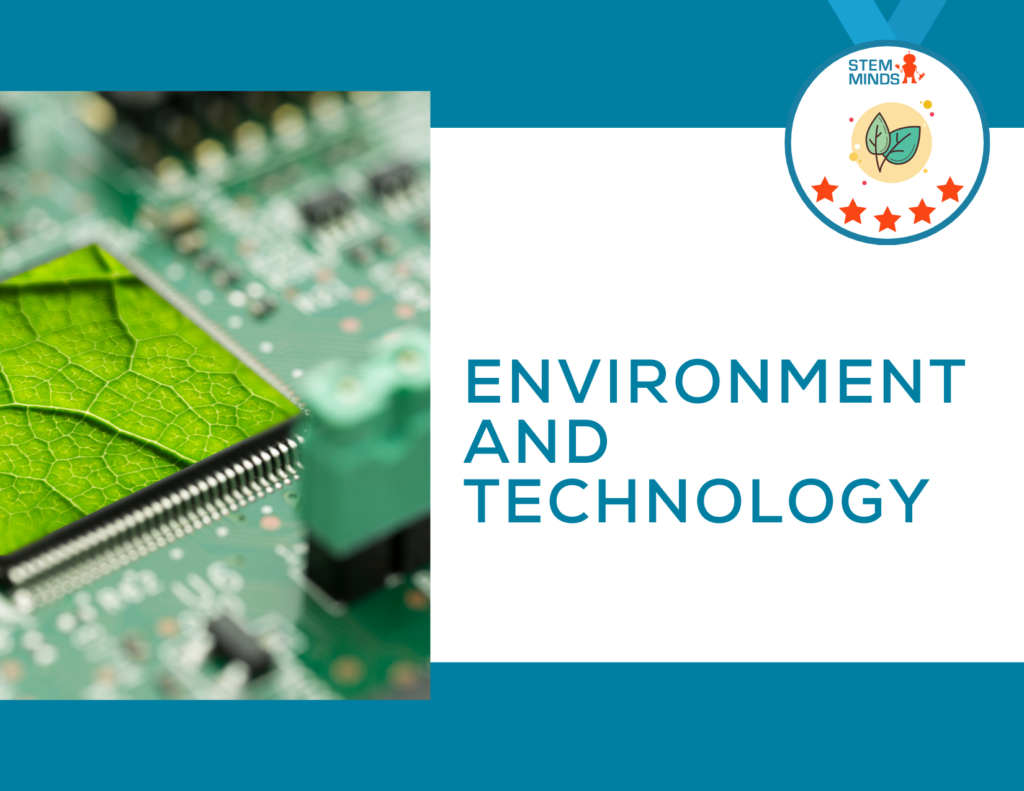
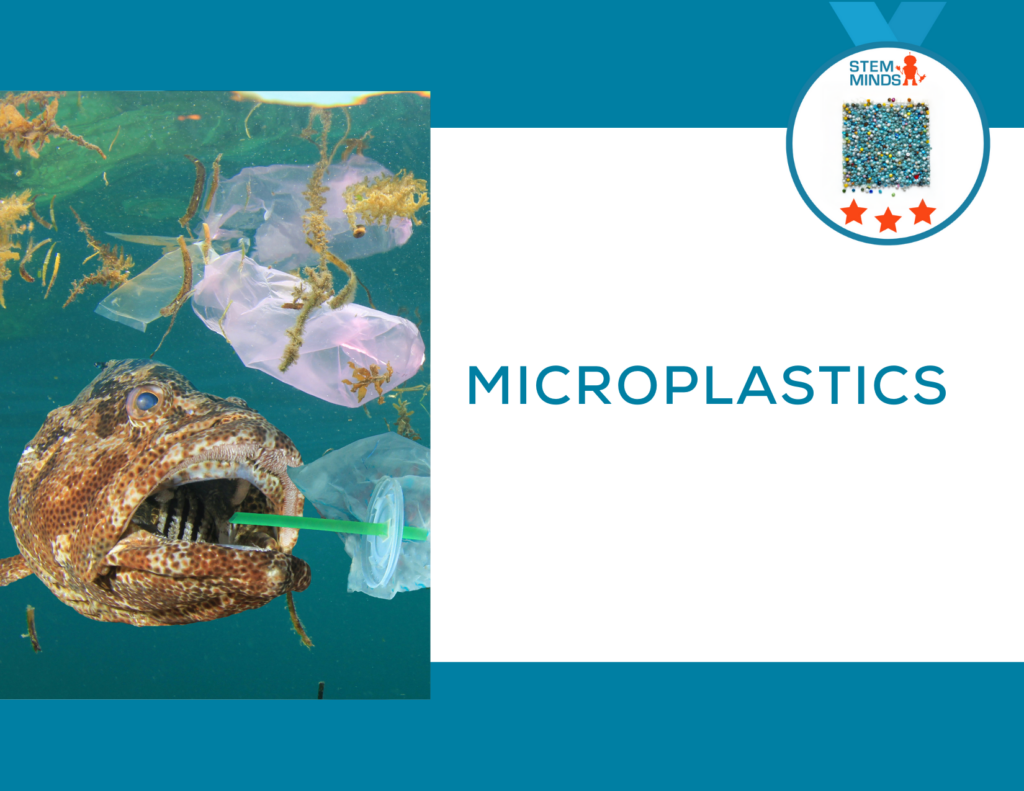
Module 2: Chemistry of Plastics
Module 3: Microplastic Pollution
Module 4: Environmental & Human Health Impacts
Module 5: Mitigation & Remediation Strategies
Module 6: Policy & Legislation
Module 7: End of Course Survey & Course Certificate
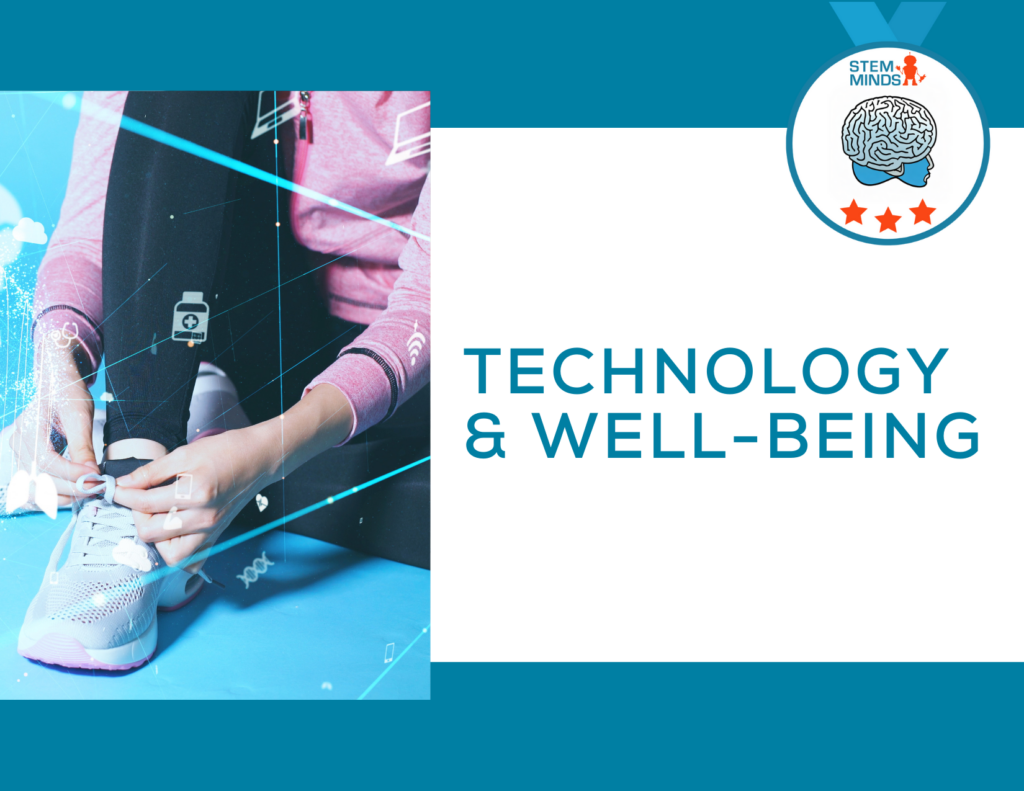
Module 2: Technology & Physical Health
Module 3: Sustainable Technology Solutions
Module 4: Environmental Monitoring & Sensing Technologies
Module 5: Sustainable Urban Design & Smart Cities
Module 6: Ethics, Equity, & Inclusive Technology Design
Courses in this pathway will help students...
In the Advanced STEM Mastery Pathway, students are able to explore a range of advanced STEM topics through courses that address the following learning goals:
- Understand the fundamental concepts of computers and computer engineering, artificial intelligence, and machine learning
- Be able to use advanced coding languages and concepts to create working programs that meet desired specifications
- Develop and use troubleshooting strategies to refine and iterate projects
- Understand the real world applications of various advanced STEM technologies, related careers, and opportunities for personal growth through technology
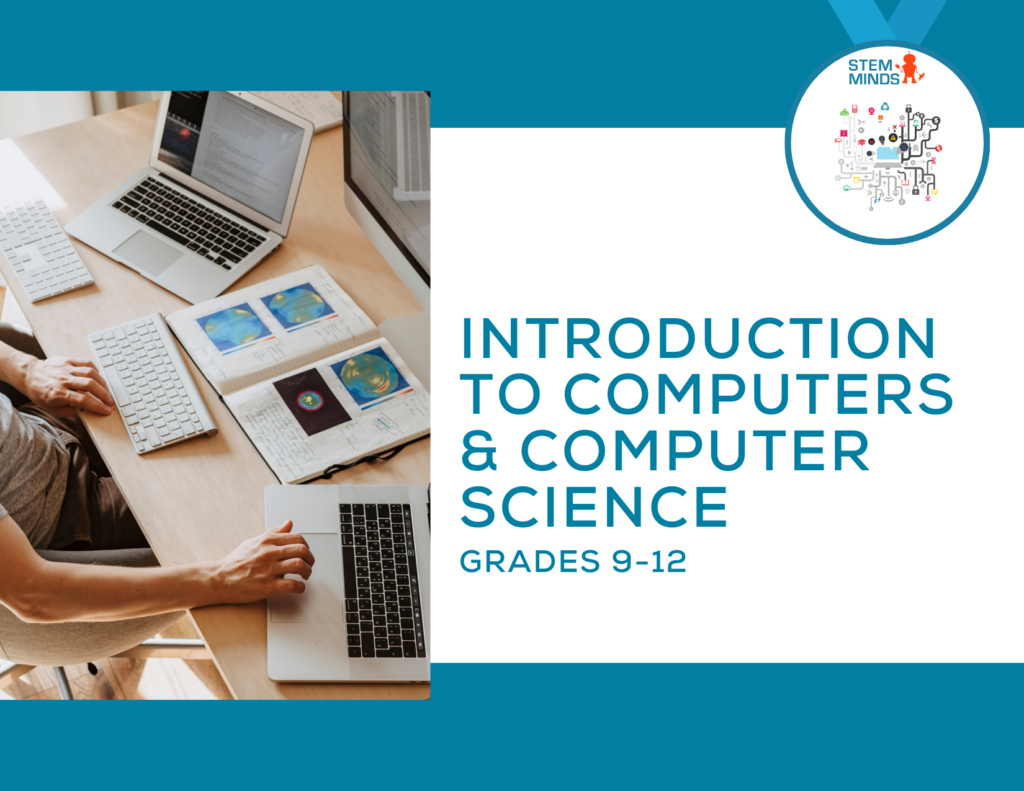
Module 1: History of Computing
Module 2: Hardware
Module 3: Software
Module 4: Networks, Visualization, and Cloud Computing
Module 5: Security
Module 6: Hardware, Software, and Network Troubleshooting
Module 7: Final Project
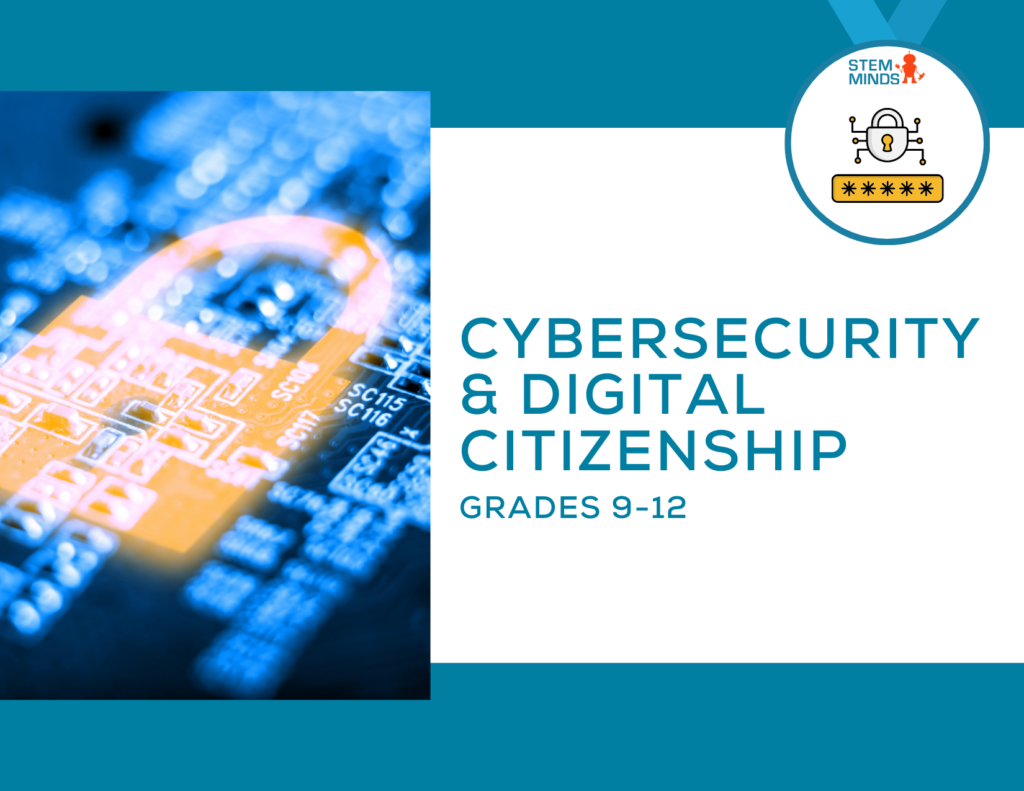
Module 1: What is Cybersecurity?
Module 2: Balancing Security & Usability
Module 3: Malware & Attacks
Module 4: Principals of Digital Citizenship
Module 5: Computers & Culture
Module 6: Digital Law & Ethics
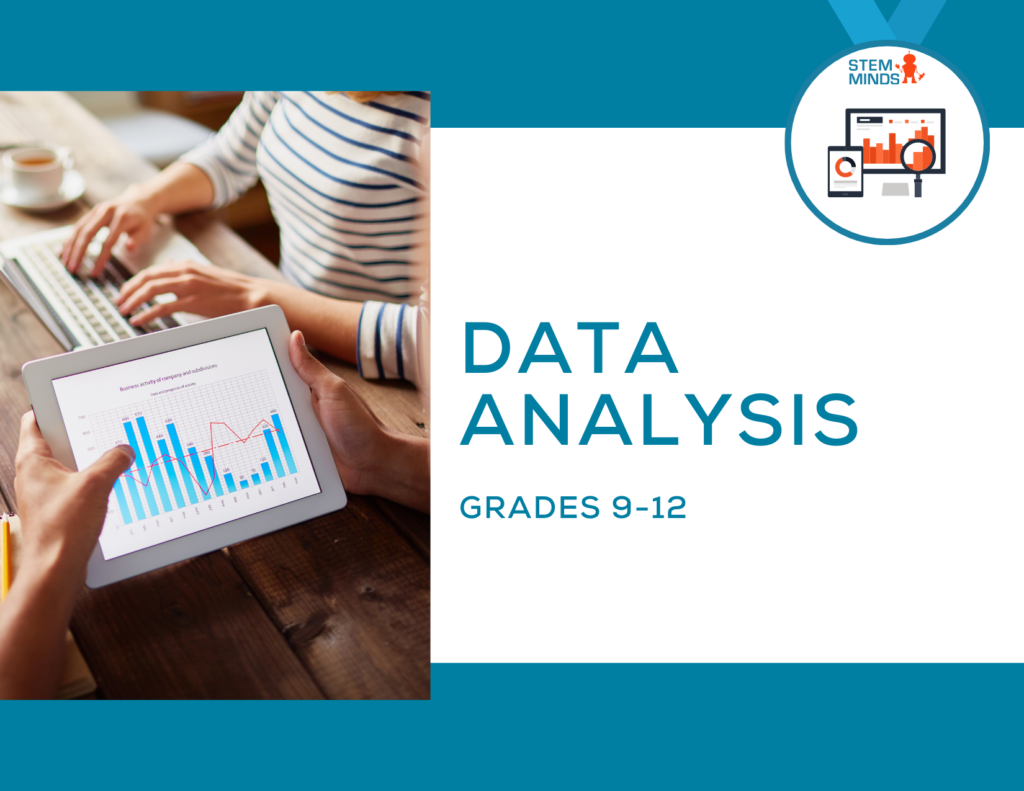
Module 1: Introduction to Data
Module 2: Data Acquisition and Cleaning
Module 3: Data Visualization
Module 4: Data Relationships
Module 5: Business Intelligence
Module 6: Industry & Tools
Module 7: Final Project
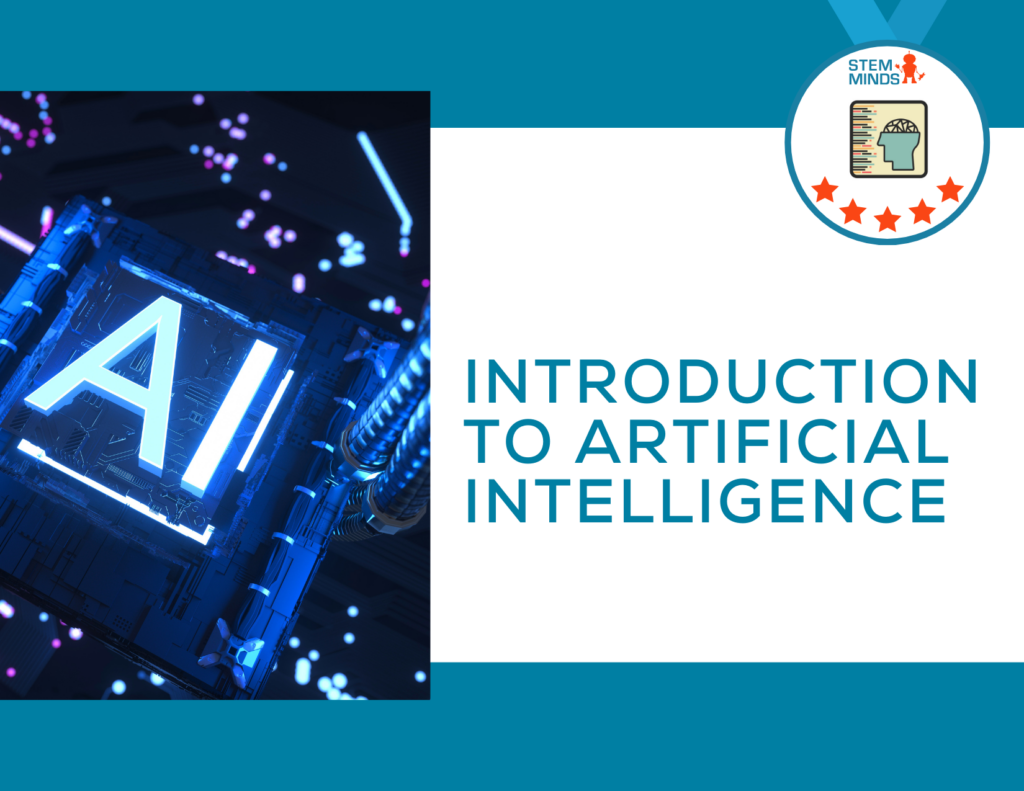
Module 1: What is Artificial Intelligence?
Module 2: Types of AI
Module 3: Ethics & AI
Module 4: Tic Tac Toe with AI
Module 5: Final Project
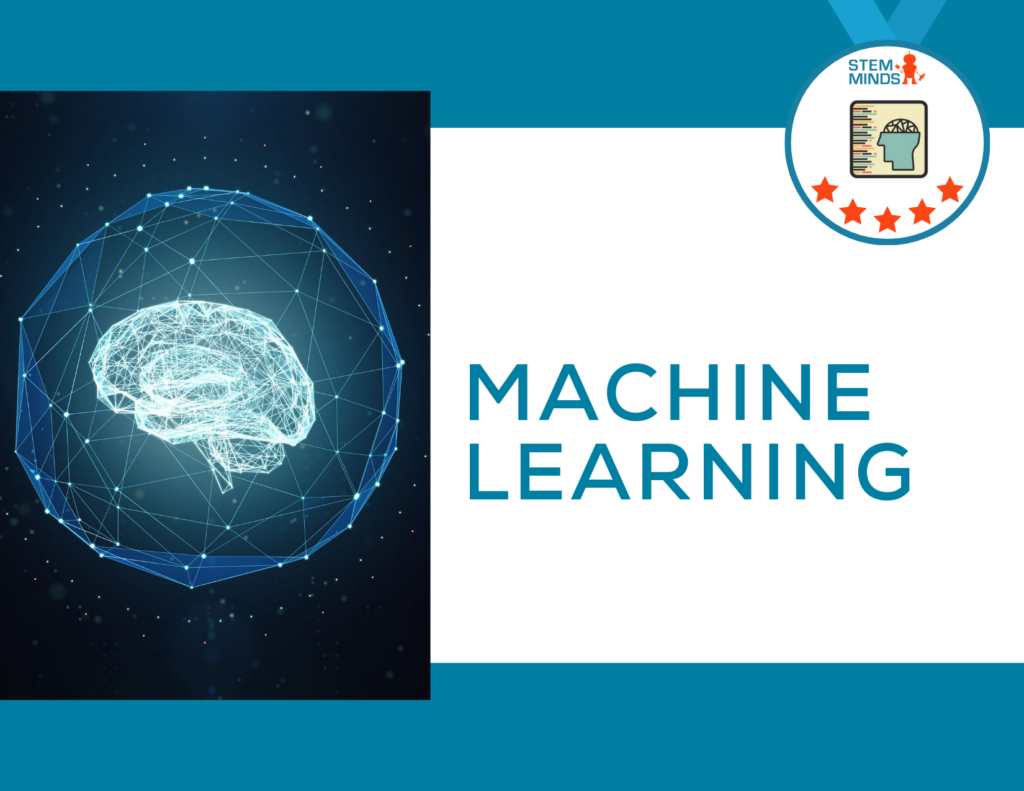
Module 1: What is Machine Learning?
Module 2: Intro to Python
Module 3: Python Data Structures & Algorithms
Module 4: ML in Python with Libraries
Module 5: Neural Networks
Module 6: Industry Applications of Machine Learning
Module 7: Final Project
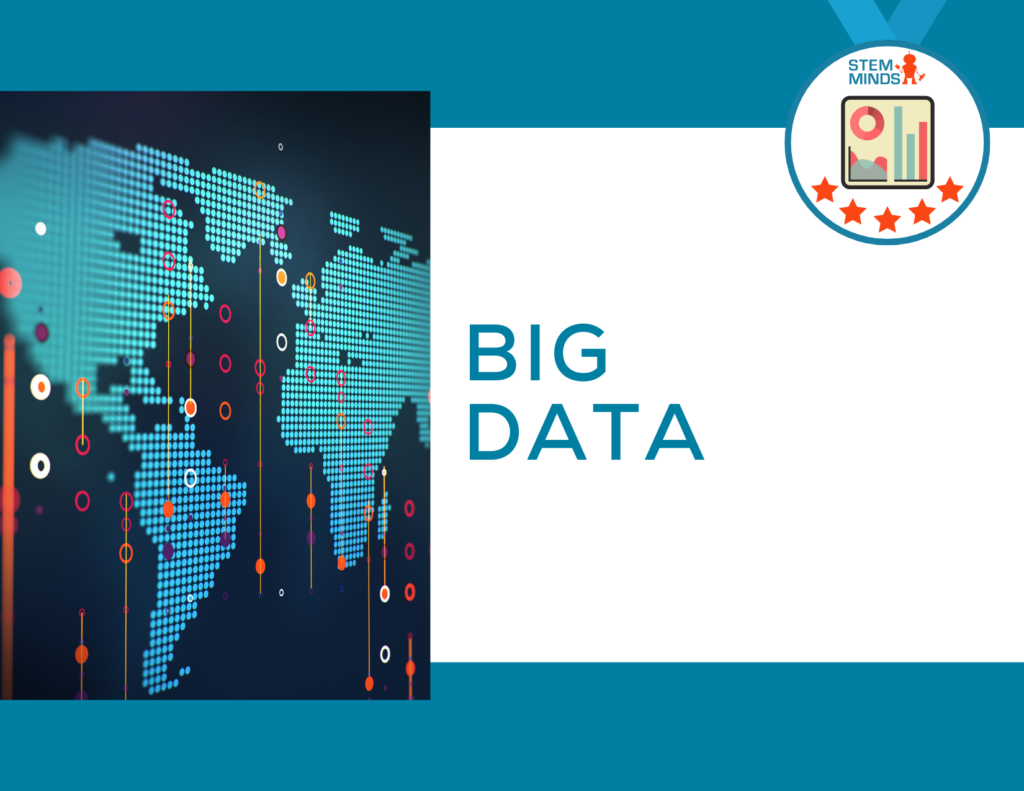
Module 1: Intro to Big Data
Module 2: Scientific Method in Big Data
Module 3: Statistics for Big Data
Module 4: Data Sets
Module 5: Data Visualization
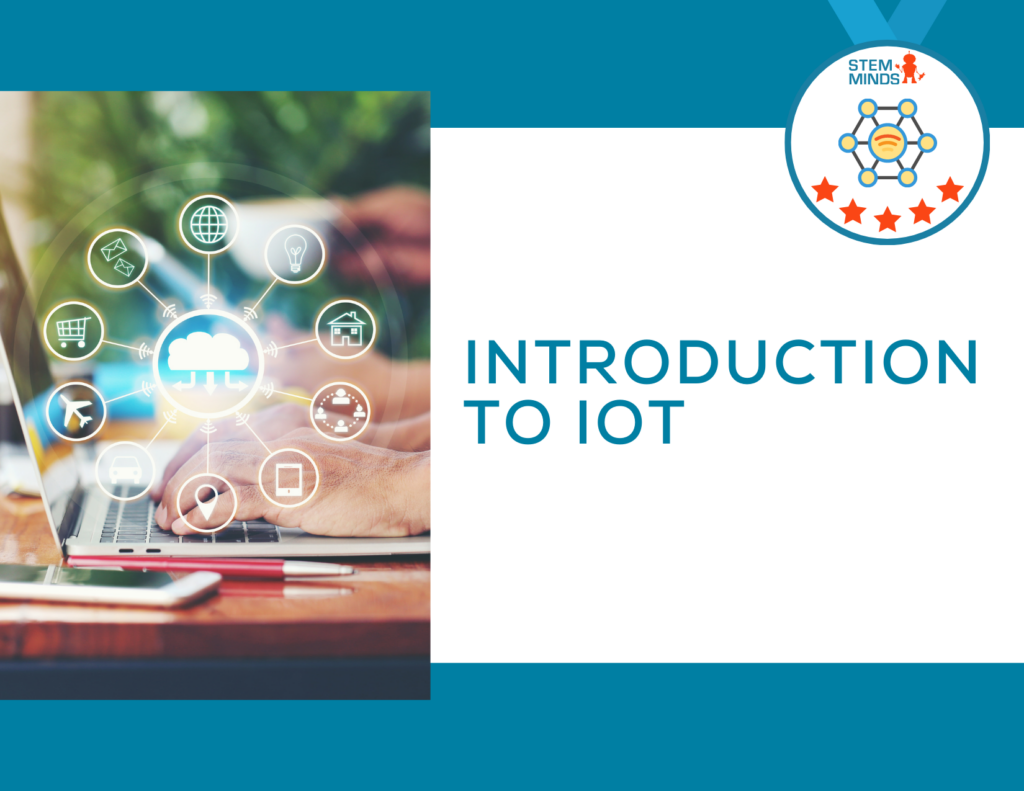
Module 1: Intro to IOT
Module 2: Foundations of AWS
Module 3: AWS IOT Core
Module 4: Deploying IOT
Module 5: Managing IOT Deployments
Module 6: Technical and Societal Changes
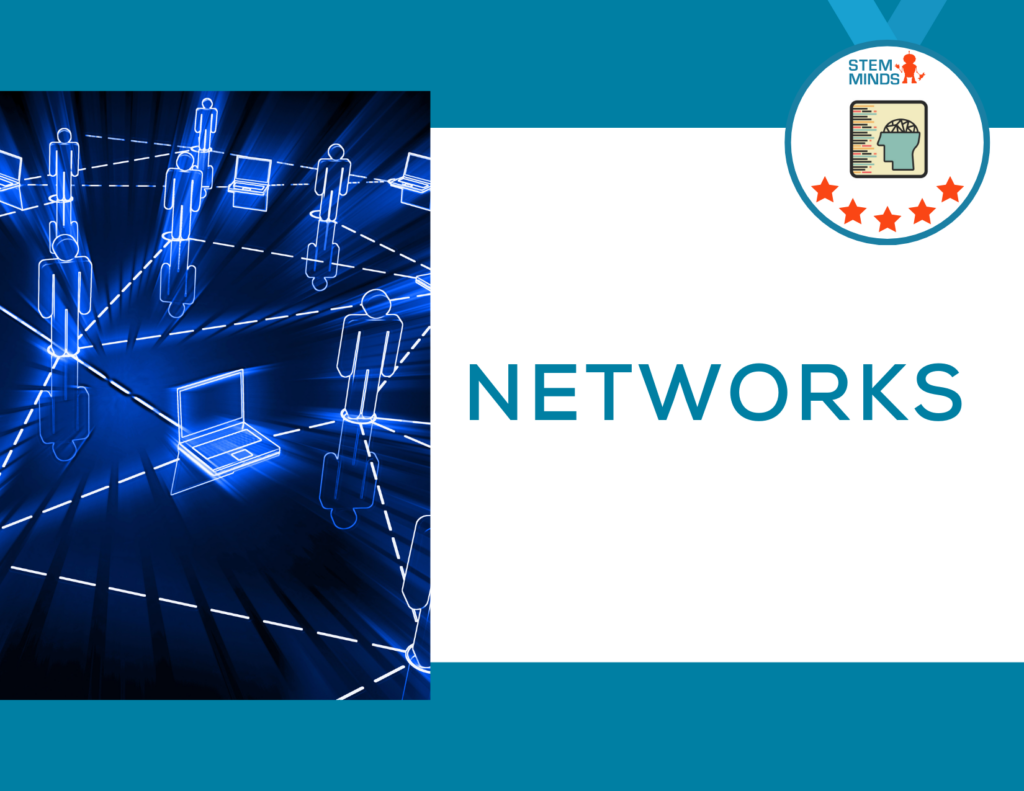
Module 1: What is a Network?
Module 2: Types of Network Devices
Module 3: Network Topologies
Module 4: Network Communications
Module 5: Network Performance
Module 6: Network Security
Module 7: Final Project
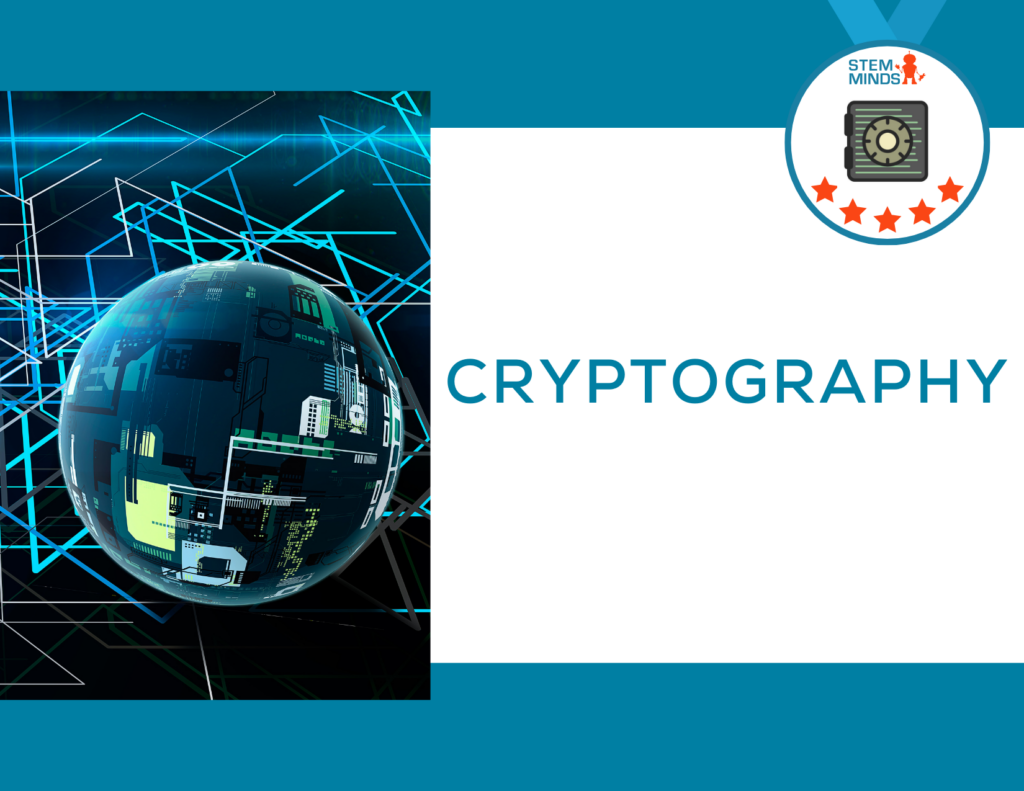
Module 1: What is Cryptography?
Module 2: Block-Based Ciphers
Module 3: Hash Functions
Module 4: Rainbow Tables
Module 5: Password Security & Salting
Module 6: Hash Collisions Attacks
Module 7: Final Project
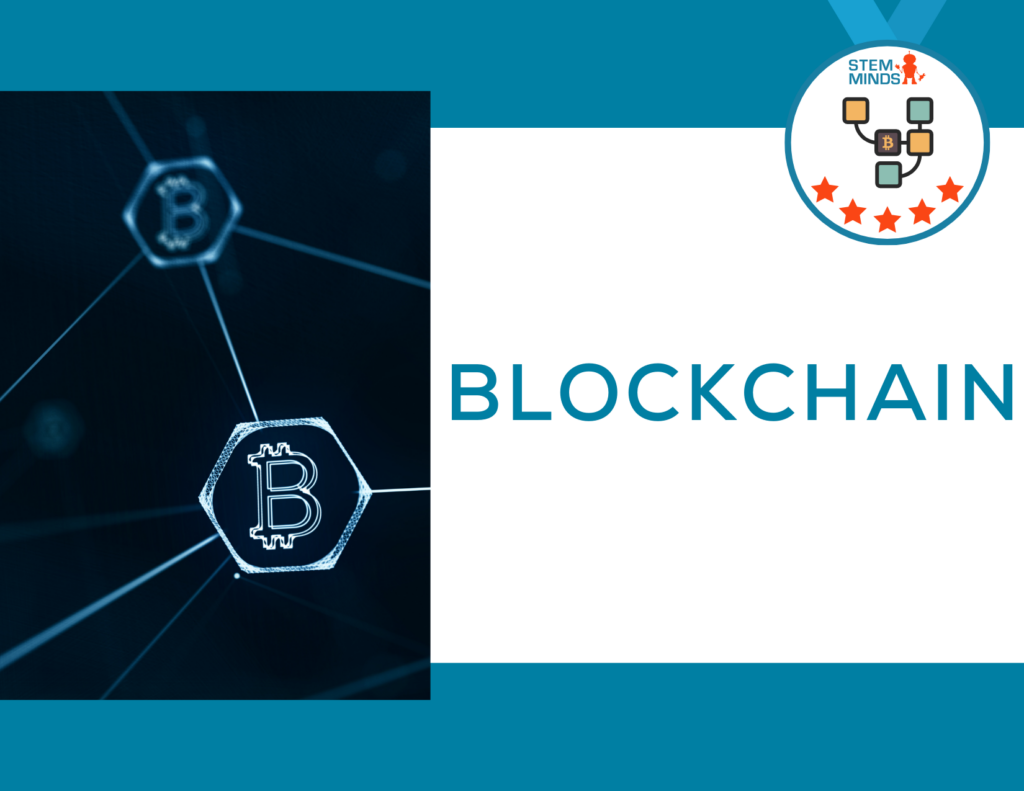
Module 1: What is Blockchain?
Module 2: Ethereum and Bitcoin
Module 3: Smart Contracts
Module 4: Trust Essentials
Module 5: Decentralized Apps
Module 6: FinTech
Module 7: Final Project

Module 1: Creating an eSports Team
Module 2: Teams & Branding
Module 3: Streaming & Content Creation
Module 4: Health in eSports
Module 5: Coaching in eSports
Module 6: Video On Demand and Player Feedback
Module 7: Game Design for eSports
Module 8: The Technology for eSports
Module 9: eSports Events
Module 10: Careers in eSports
Module 11: Course Wrap Up
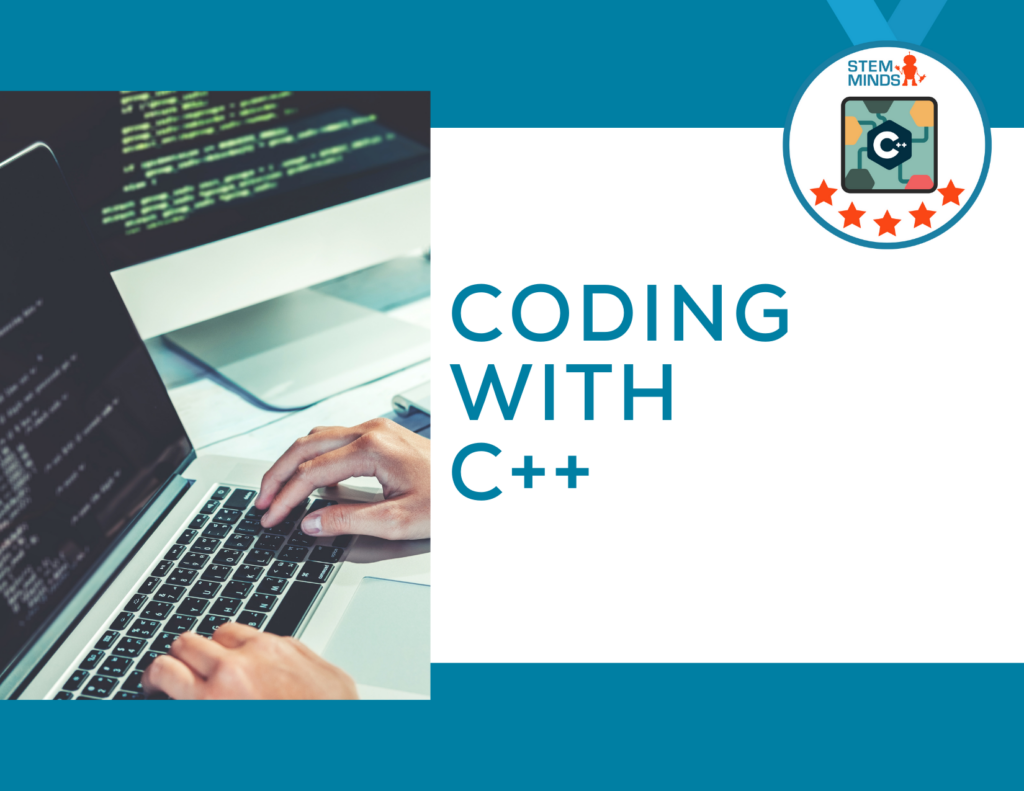
Module 1: Intro to Computer Science
Module 2: Console Outputs
Module 3: Variables & Calculations
Module 4: User Input & Interactive Programs
Module 5: Selection Structures (Conditionals)
Module 6: Repetition Structures (Loops)
Module 7: Arrays
Module 8: Using Random Numbers
Module 9: Functions
Module 10: Final Project
Module 11: Peer Feedback
Module 12: Course Wrap Up
Module 13: End of Course Badge & Certificate
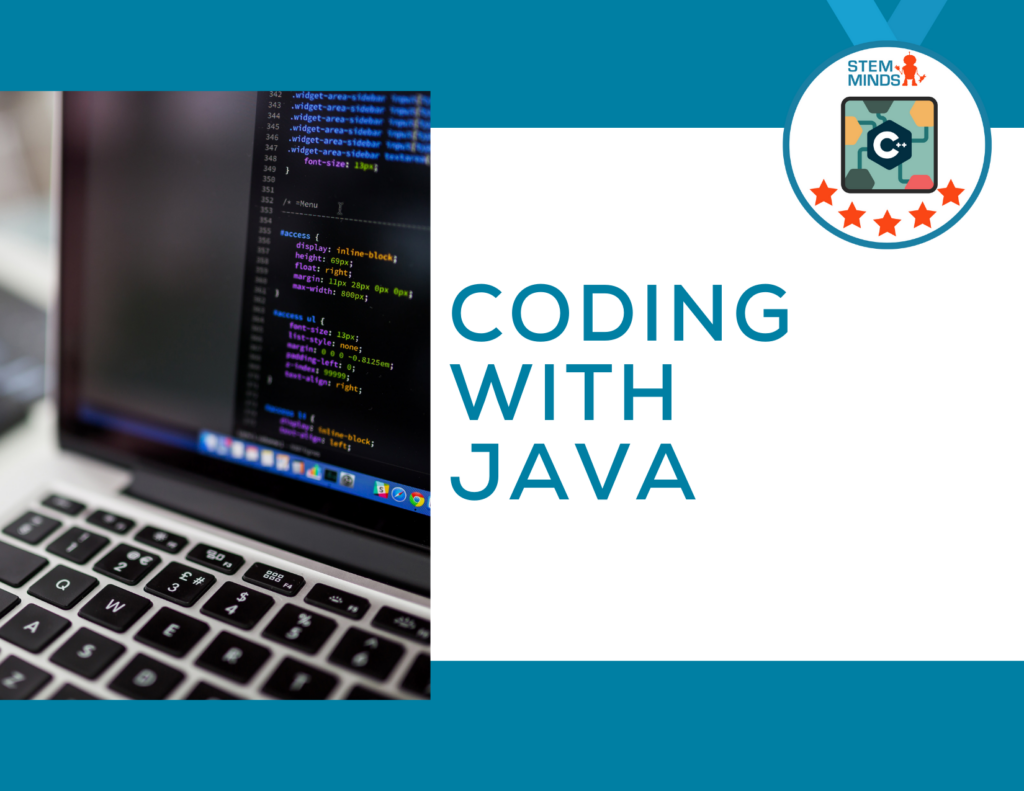
Module 1: Intro to Computer Science
Module 2: Intro to Java
Module 3: Decision-Making & Conditionals
Module 4: Switch Case Conditionals
Module 5: Using Loops
Module 6: Object-Oriented Programming
Module 7: Graphical User Interface
Module 8: Keyboard Controls and Interactivity
Module 9: Intro to the Final Project
Module 10: Testing & Peer Feedback
Module 11: Course Wrap Up
Module 12: End of Course Bage & Certificate
Module 13: Global Goals Challenges
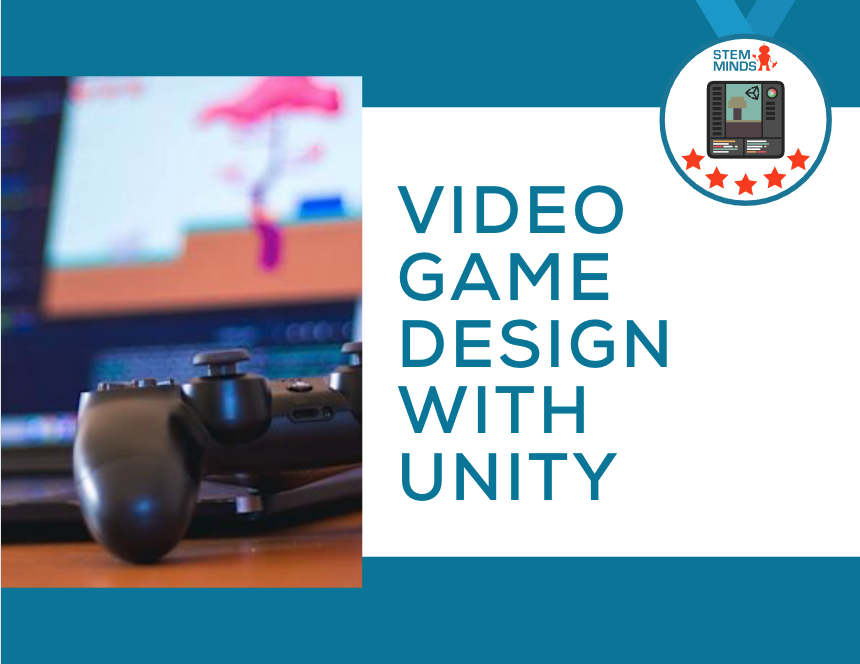
Module 1: Intro to Video Game Design
Module 2: Design Thinking & Game Development
Module 3: Game Objects & Components
Module 4: Scripting
Module 5: Collisions & Triggers
Module 6: Creating Challenge (Lock & Key Puzzles)
Module 7: Creating Challenge (Hazards)
Module 8: Textures, Materials & Animations
Module 9: Game Menus & UI
Module 10: Life Counters & Other Menus
Module 11: Playtesting & Peer Feedback
Module 12: Final Submission
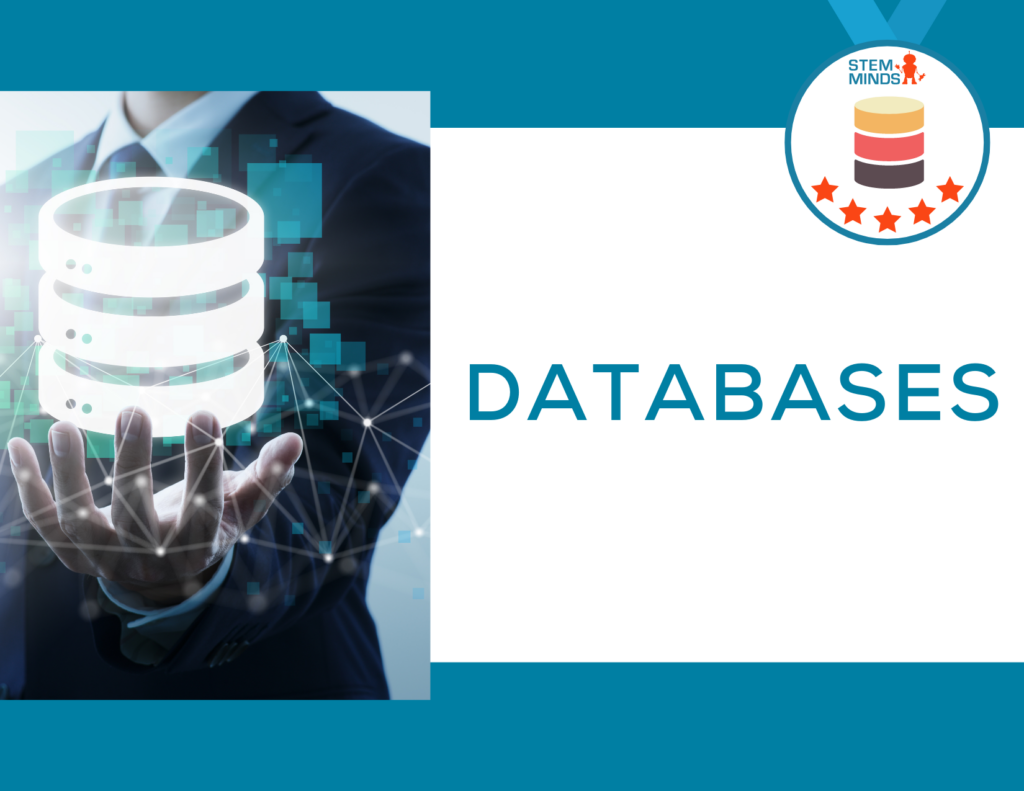
Module 1: Intro to Databases
Module 2: SQL Basics
Module 3: Aggregate Functions and Subqueries
Module 4: Database Normalization
Module 5: End of Course Survey
Module 6: Global Goals Challenges
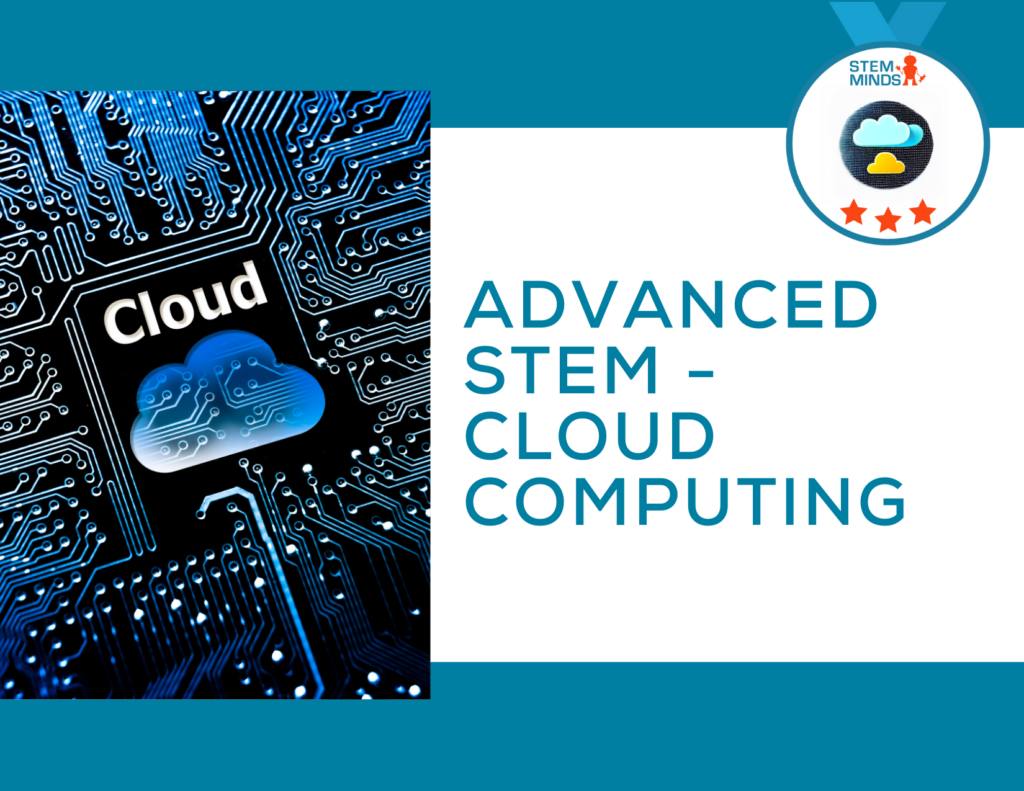
Module 2: Infrastructure of Cloud Computing
Module 3: Cloud Storage and Data Management
Module 4: Cloud-Based Applications and Services
Module 5: Cloud Computing in Business and Industry
Module 6: Cloud Computing and Big Data
Module 7: Cloud Computing and Artificial Intelligence
Module 8: Future of Cloud Computing: Course Wrap-Up
Module 9: Foundations of AWS (Optional)
Module 10: AWS IoT Core (Optional)
Module 11: Deploying IoT (Optional)
Module 12: Managing IoT Deployments (Optional)
STEM Minds Curriculum Bundles
In these Introductory Mastery Pathway Bundles, students have the opportunity to explore everything the world of STEM has to offer. Our mastery-based learning pathways provide options for students to level up their learning and dive deeper into specific areas of STEM.
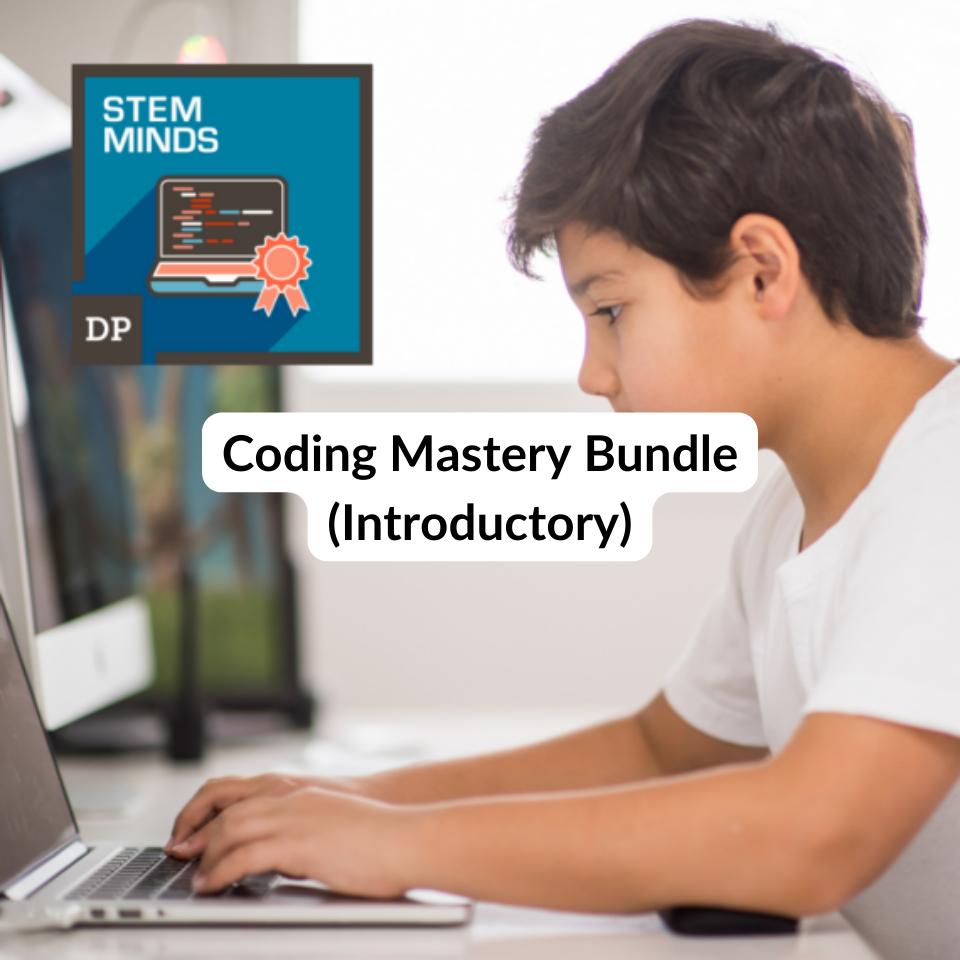
This bundle includes:
- Coding with Scratch
- Coding with Micro:Bit
- Coding with Arduino
- Web Development
- App Development
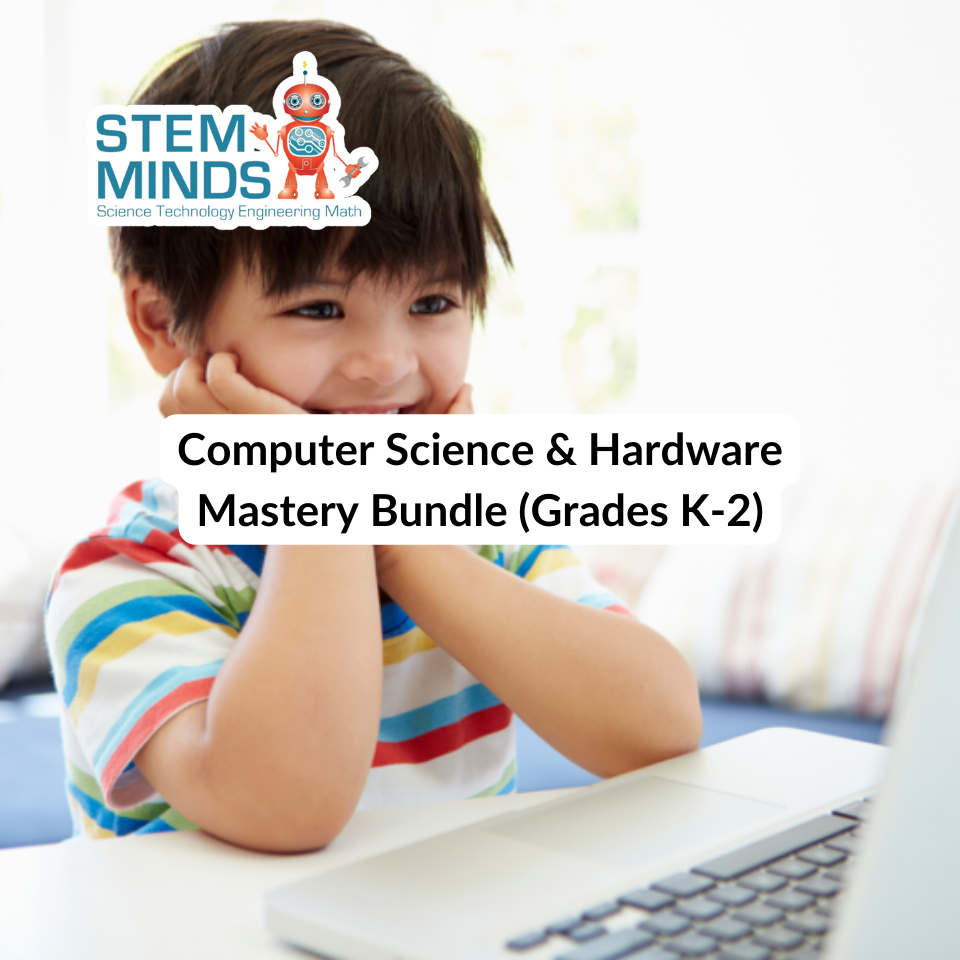
Computers are everywhere these days, so it’s important to understand how they work! In our Computer Science & Hardware Mastery Pathway, we will explore a range of key concepts, including cybersecurity, digital citizenship, the internal workings of computers, data analysis, and more. Get ready to become a computer genius!
This bundle includes:
- Computer Skills
- Introduction to Computers & Computer Science
- Cybersecurity & Digital Citizenship
- Data Analysis
- Coding with Kodable
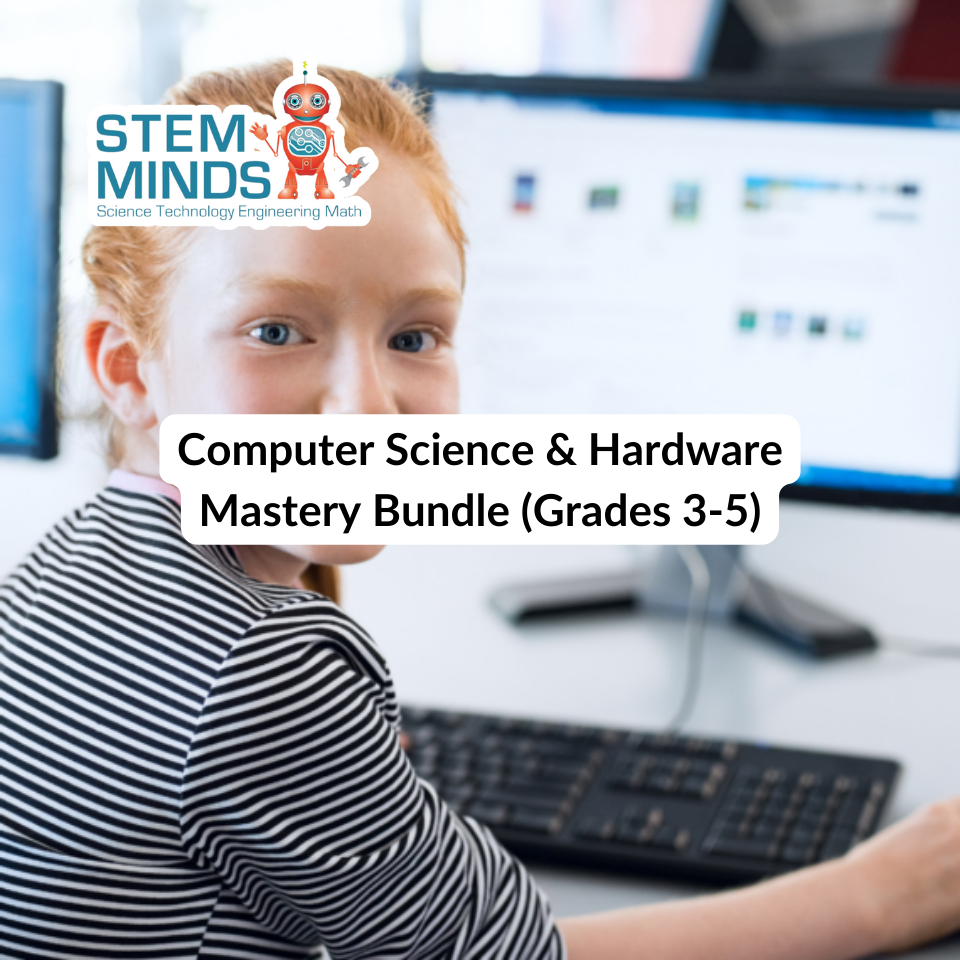
Computers are everywhere these days, so it’s important to understand how they work! In our Computer Science & Hardware Mastery Pathway, we will explore a range of key concepts, including cybersecurity, digital citizenship, the internal workings of computers, data analysis, and more. Get ready to become a computer genius!
This bundle includes:
- Computer Skills
- Introduction to Computers & Computer Science
- Cybersecurity & Digital Citizenship
- Coding with Micro:Bit
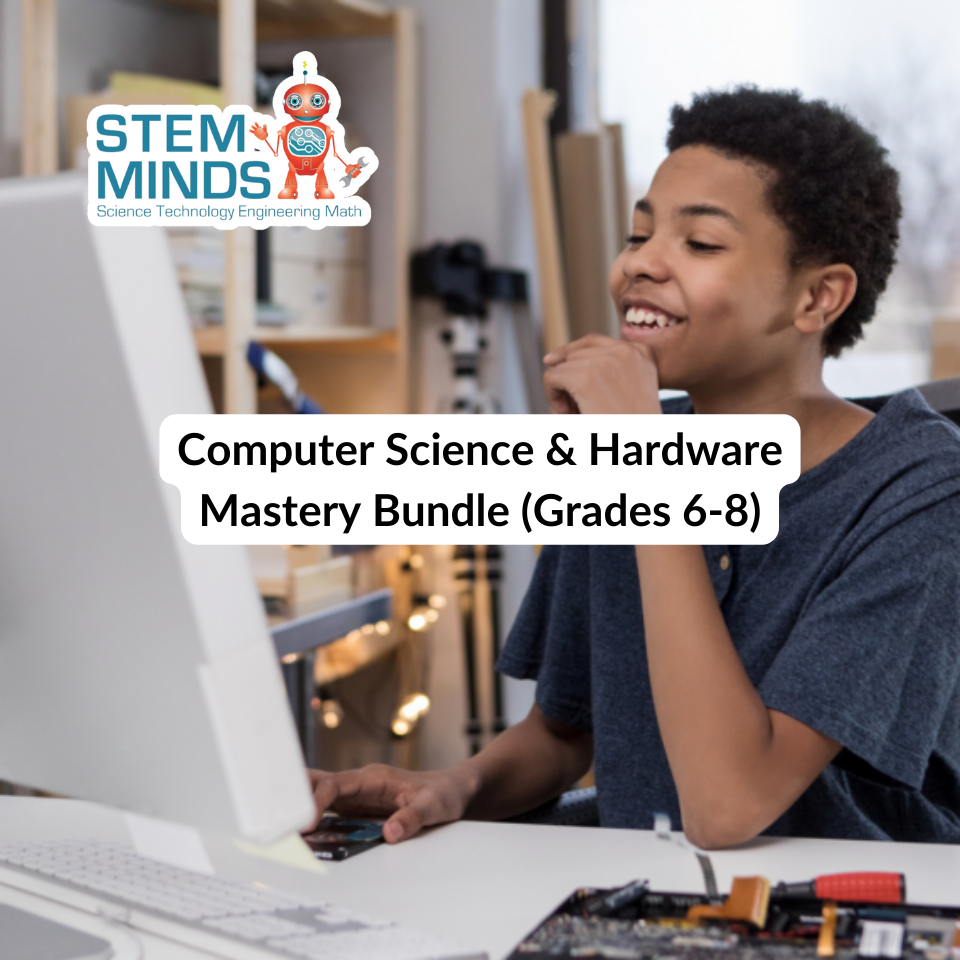
**COMING SOON!**
Computers are everywhere these days, so it’s important to understand how they work! In our Computer Science & Hardware Mastery Pathway, we will explore a range of key concepts, including cybersecurity, digital citizenship, the internal workings of computers, data analysis, and more. Get ready to become a computer genius!
This bundle includes:
- History of Technology
- Introduction to Computers & Computer Science
- Cybersecurity & Digital Citizenship
- Computer Skills
- Coding with Micro:Bit
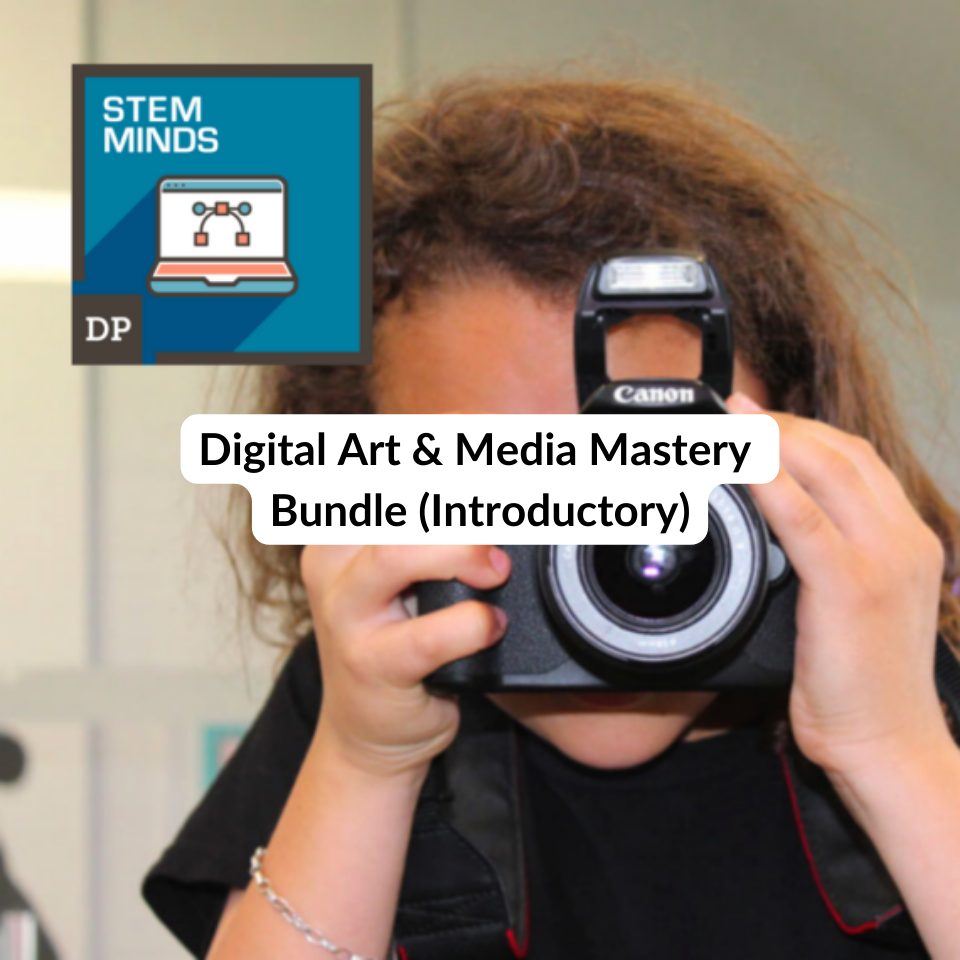
This bundle includes:
- 3D Design
- Computer Music
- Film & Photography
- 2D Design
- Animation
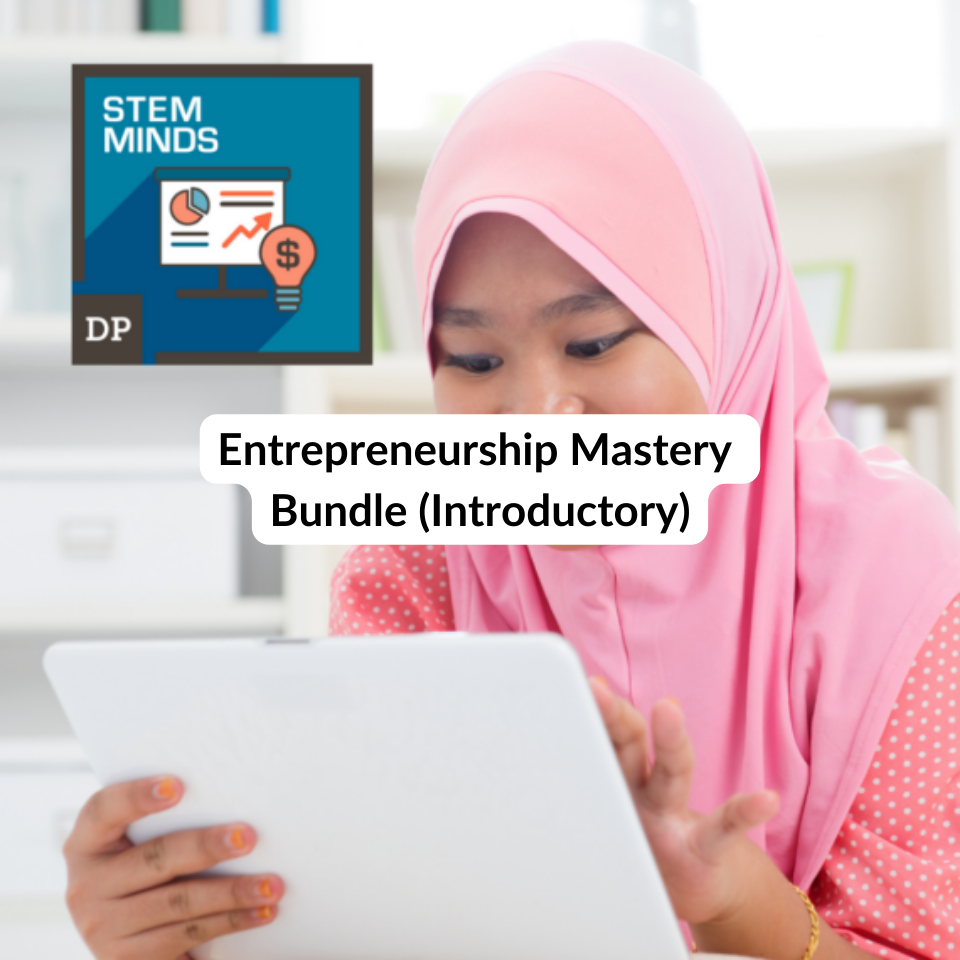
This bundle includes:
- Public Speaking
- Young Entrepreneurs
- Introduction to eSports
- App Development
- 3D Design
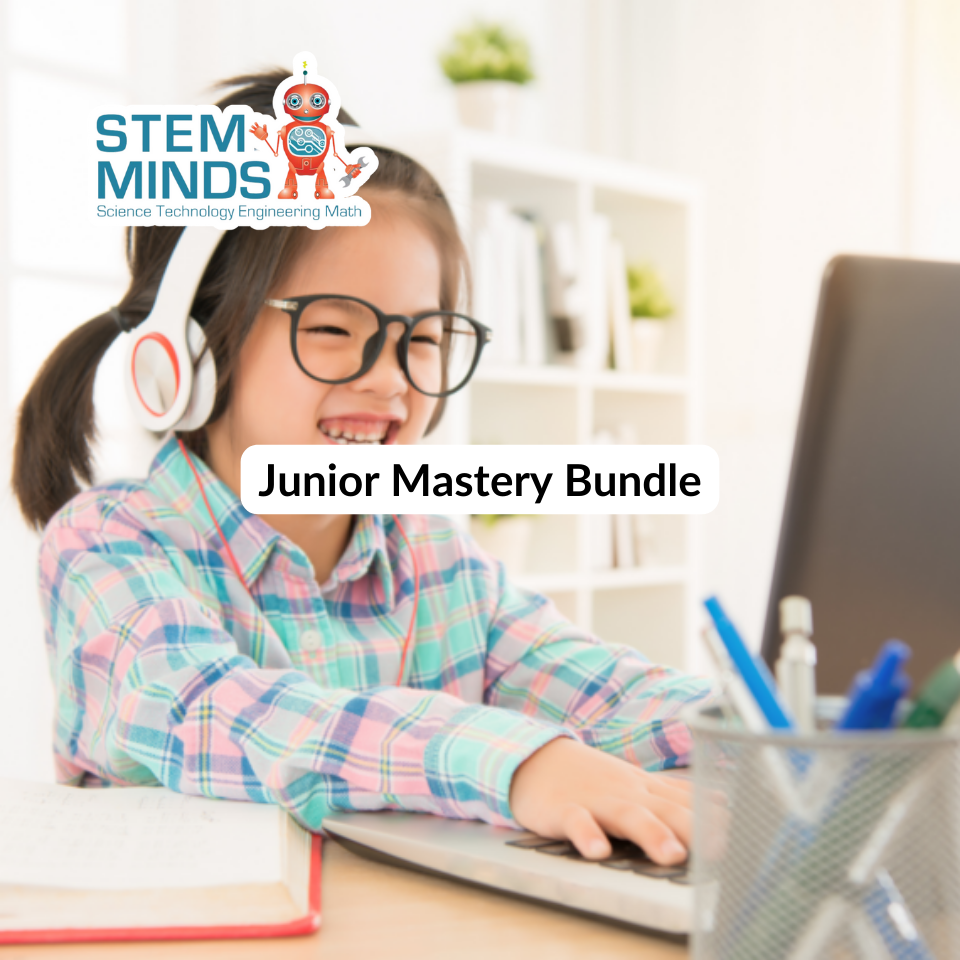
This bundle includes:
- Coding with Kodable
- Coding with Scratch Jr.
- Video Game Design with Bloxels
- Robotics with Dash
- Computer Skills
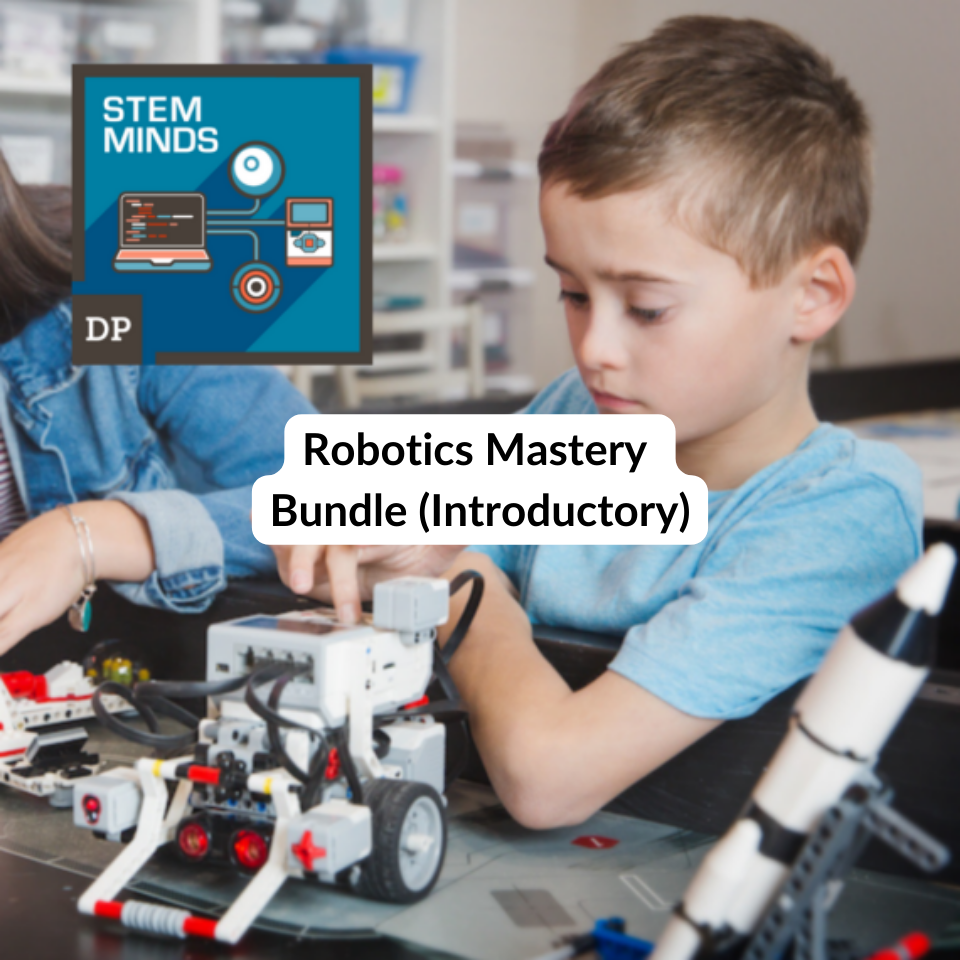
This bundle includes:
- Robotics with Sphero
- Robotics with Dash
- Robotics with LEGO™ EV3
- Coding with Micro:Bit
- Coding with Arduino
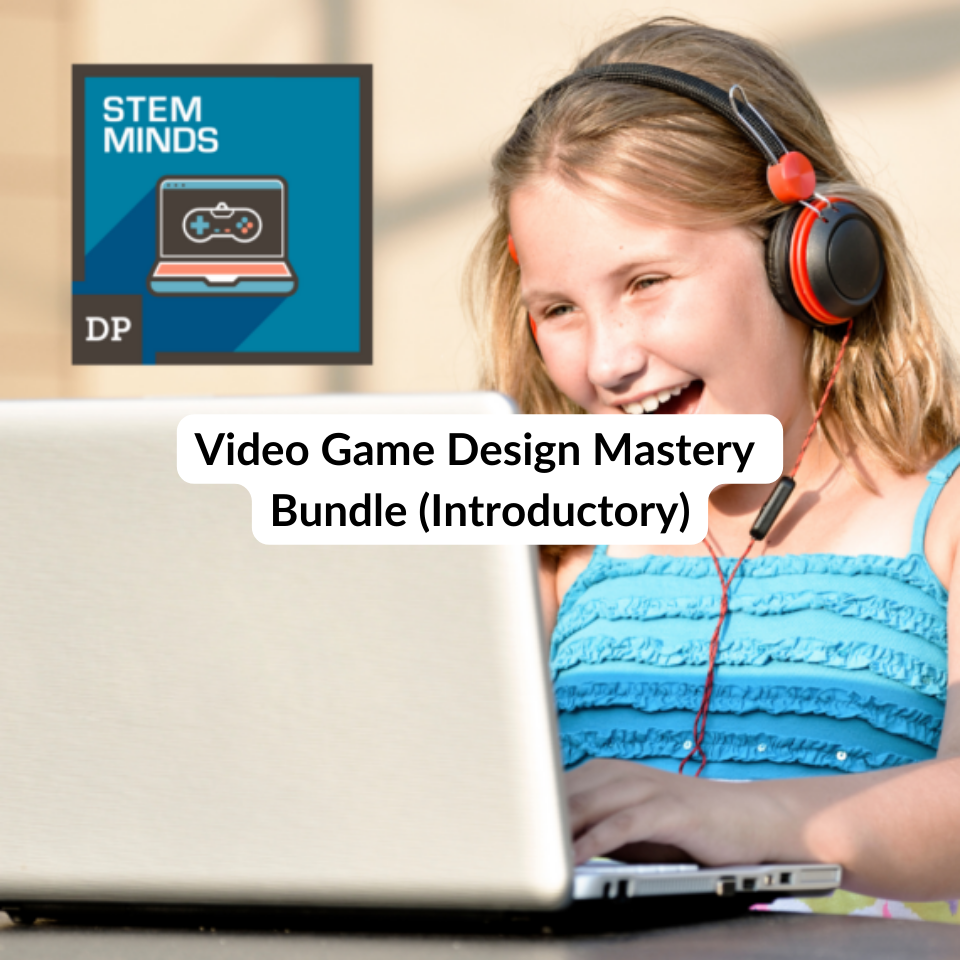
This bundle includes:
- Video Game Design with Bloxels
- Video Game Design with FlowLab
- Video Game Design with MakeCode Arcade
- Storytelling with Minecraft™
- Computer Music
In these Advanced Mastery Pathway Bundles, students have the opportunity to explore everything the world of STEM has to offer. Our mastery-based learning pathways provide options for students to level up their learning and dive deeper into specific areas of STEM.
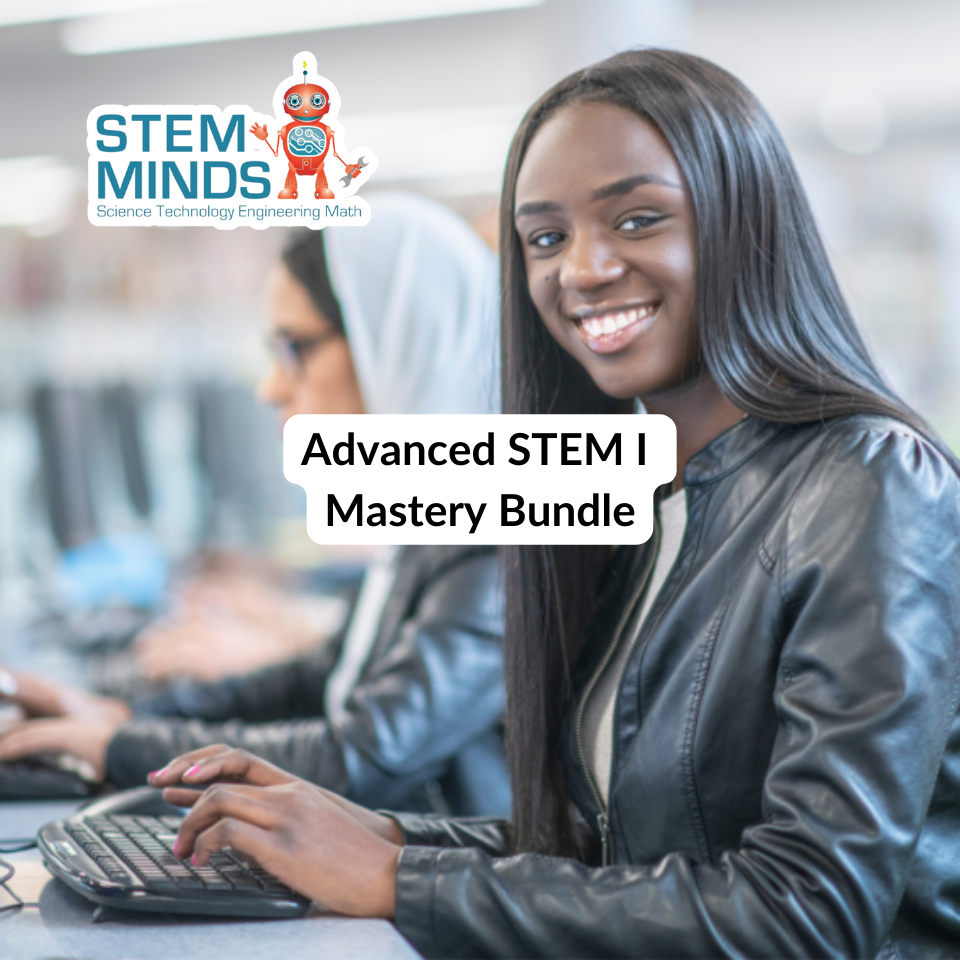
This bundle includes:
- Introduction to Blockchain
- Introduction to Cryptography
- Introduction to Artificial Intelligence
- Introduction to Machine Learning
- Big Data
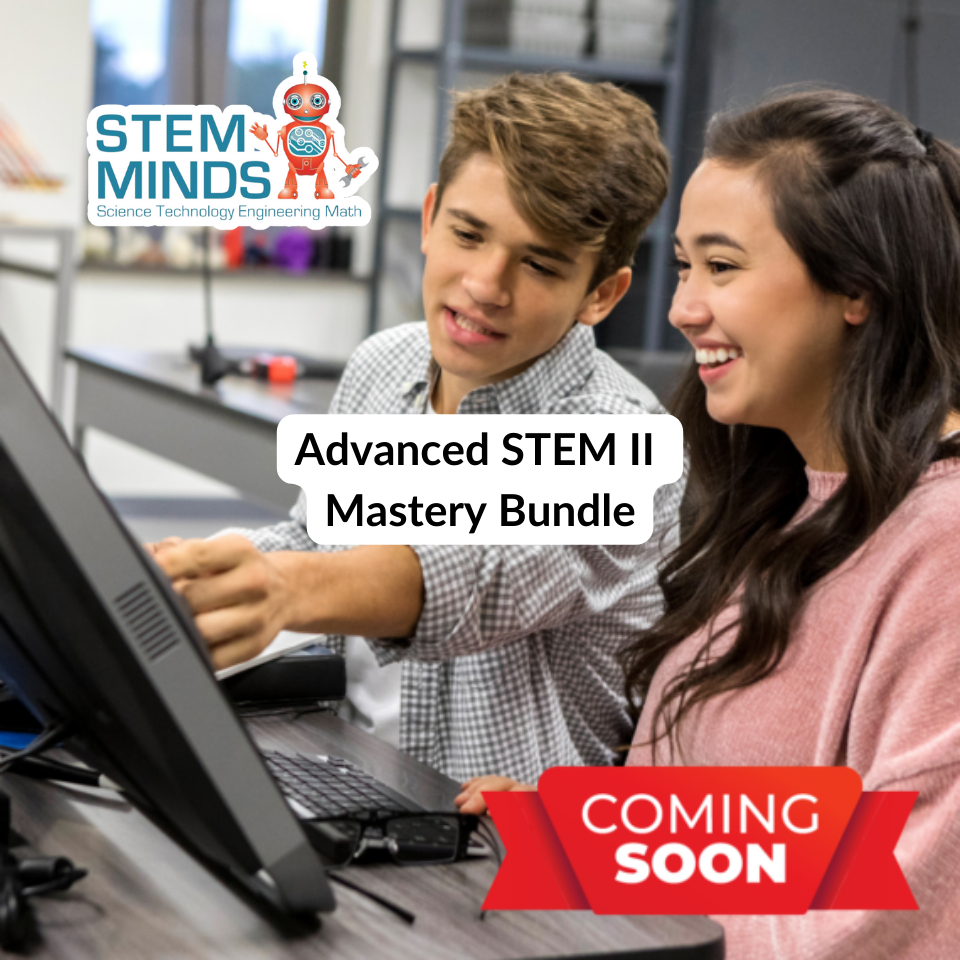
Technology is everywhere, but do we really understand it? From networks, databases, IOT, and more, these advanced STEM topics can be a challenge to untangle. In our Advanced STEM Mastery Pathway, you will get hands-on experience with the future of tech and level up your learning.
This bundle includes:
- Computer Skills
- Introduction to Computers & Computer Science
- Cybersecurity & Digital Citizenship
- Data Analysis
- Coding with Kodable
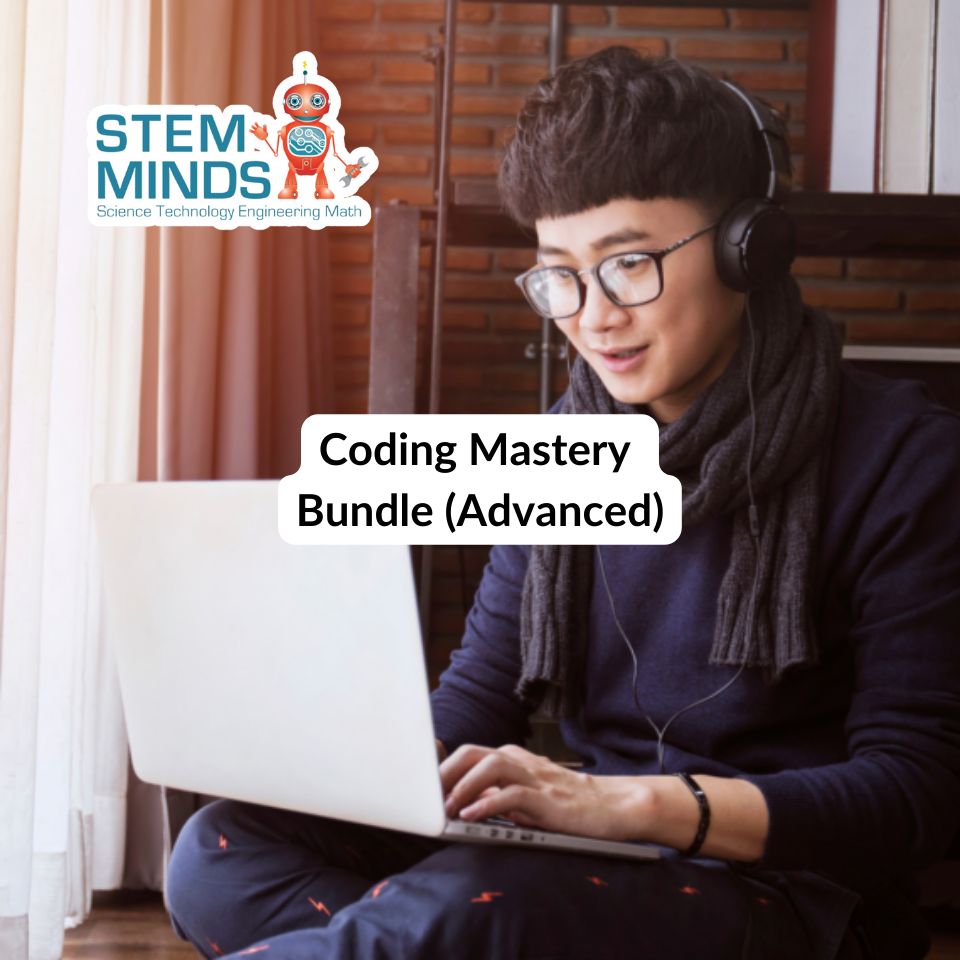
Let’s learn a new language: the language of coding! To put it simply, coding is the language that computers speak. In order for us humans to be able to use computers to their full potential, we need to learn how to code. With our Advanced Coding Mastery Pathway, you will expand your knowledge of coding and explore a range of text-based programming languages!
This bundle includes:
- Coding with Python
- Coding with C++
- Coding with Java
- Coding with Processing
- Video Game Design with Unity
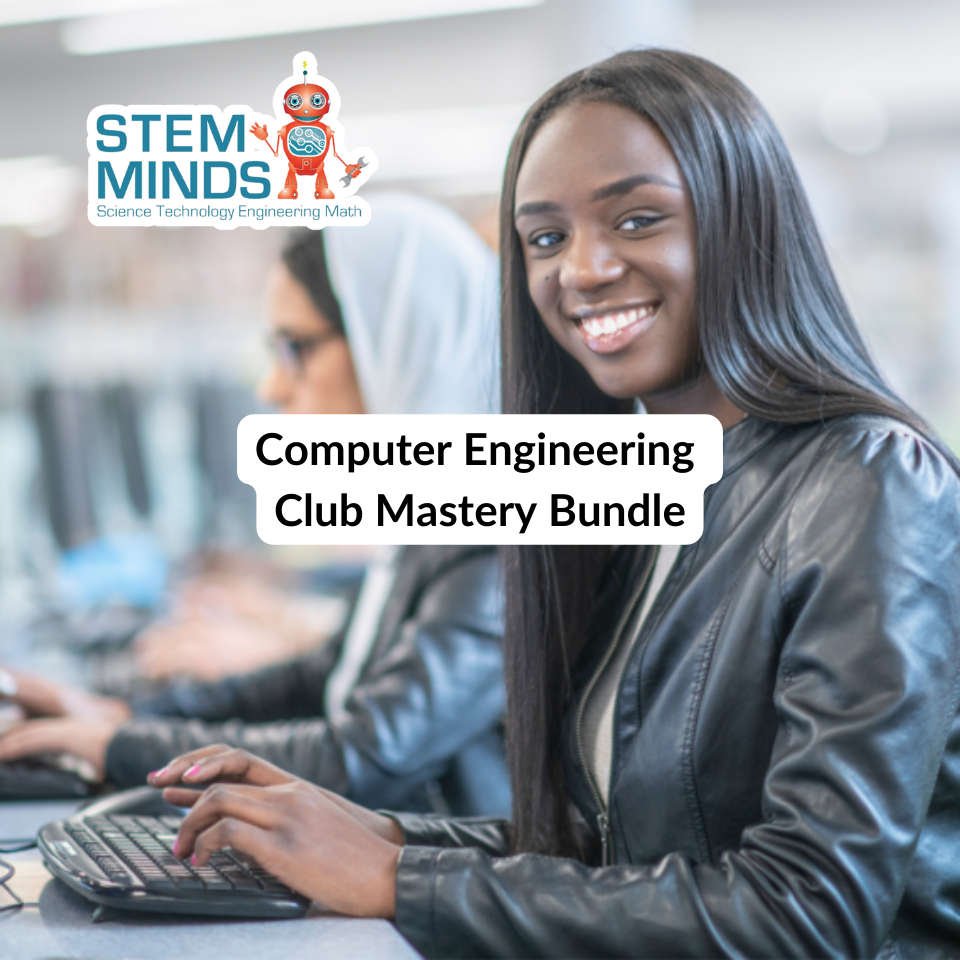
Technology is everywhere, but do we really understand it? From AI, cybersecurity, cryptography, big data, blockchain, and more, these advanced STEM topics can be a challenge to untangle. In our Advanced STEM Mastery Pathway, you will get hands-on experience with the future of tech and level up your learning.
This bundle includes:
- Cryptography
- Cybersecurity
- Network
- Databases
- Artificial Intelligence
- Machine Learning
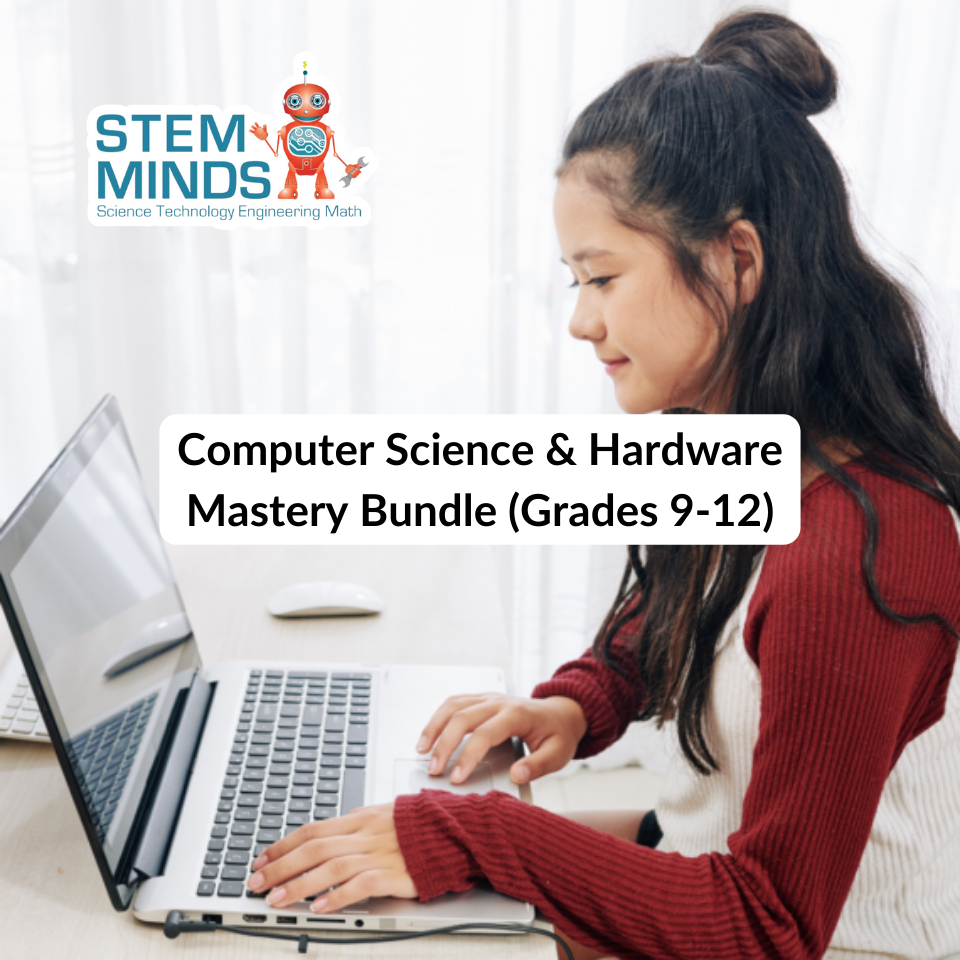
This bundle includes:
- History of Technology
- Introduction to Computers & Computer Science
- Cybersecurity & Digital Citizenship
- Data Analysis
- Coding with Python

This bundle includes:
- Introduction to the Environment & Technology
- Environmental Design
- Green Technology
- Environmental Ethics
- AI & the Environment
- Microplastics
- BioTech
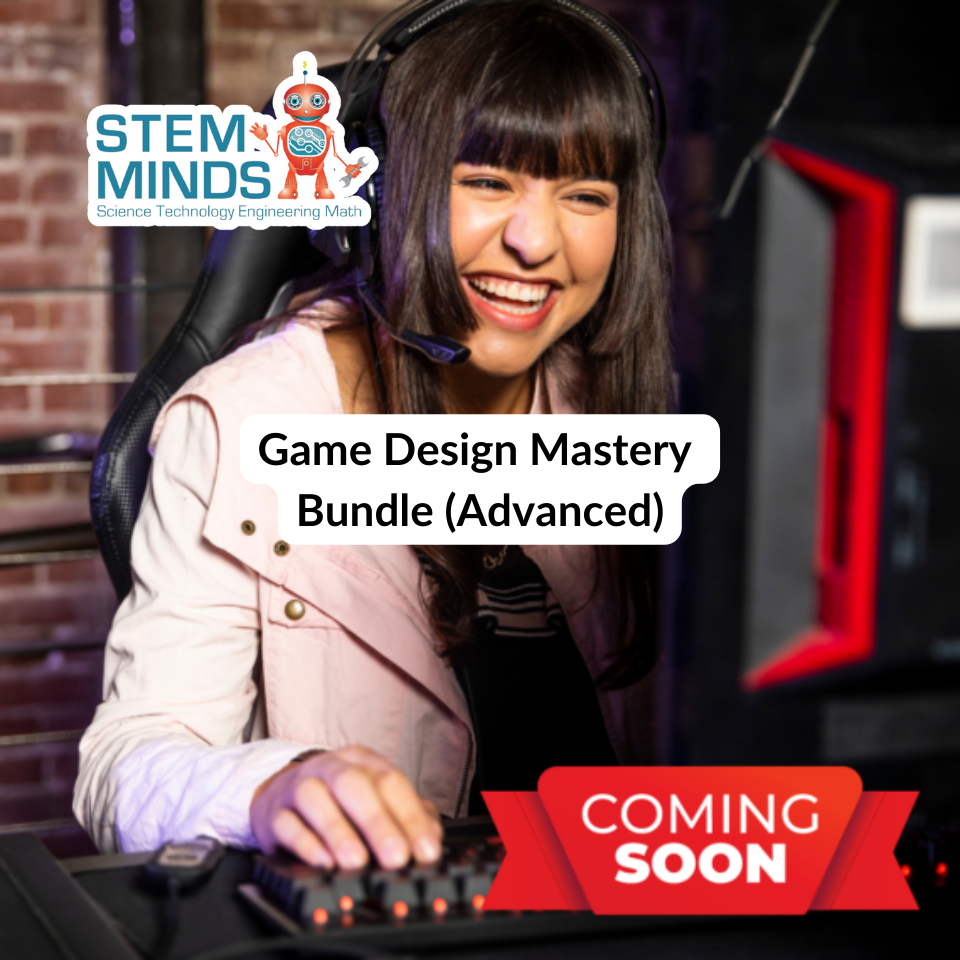
We all love to play video games, so let’s learn to create our own! From coding, art and design, storytelling and communication, and more, there is a lot that goes into creating an awesome game. In our Game Design Mastery Pathway, you will learn to create fully playable video games with a range of software, whether you are a newbie game creator or are ready to turn pro. Get ready to become the next big thing in gaming!
This bundle includes:
- Video Game Design with Unity
- Introduction to eSports
- Video Game Design with MakeCode Arcade
- Video Game Design with FlowLab (Intermediate)
- Video Game Design with Bloxels
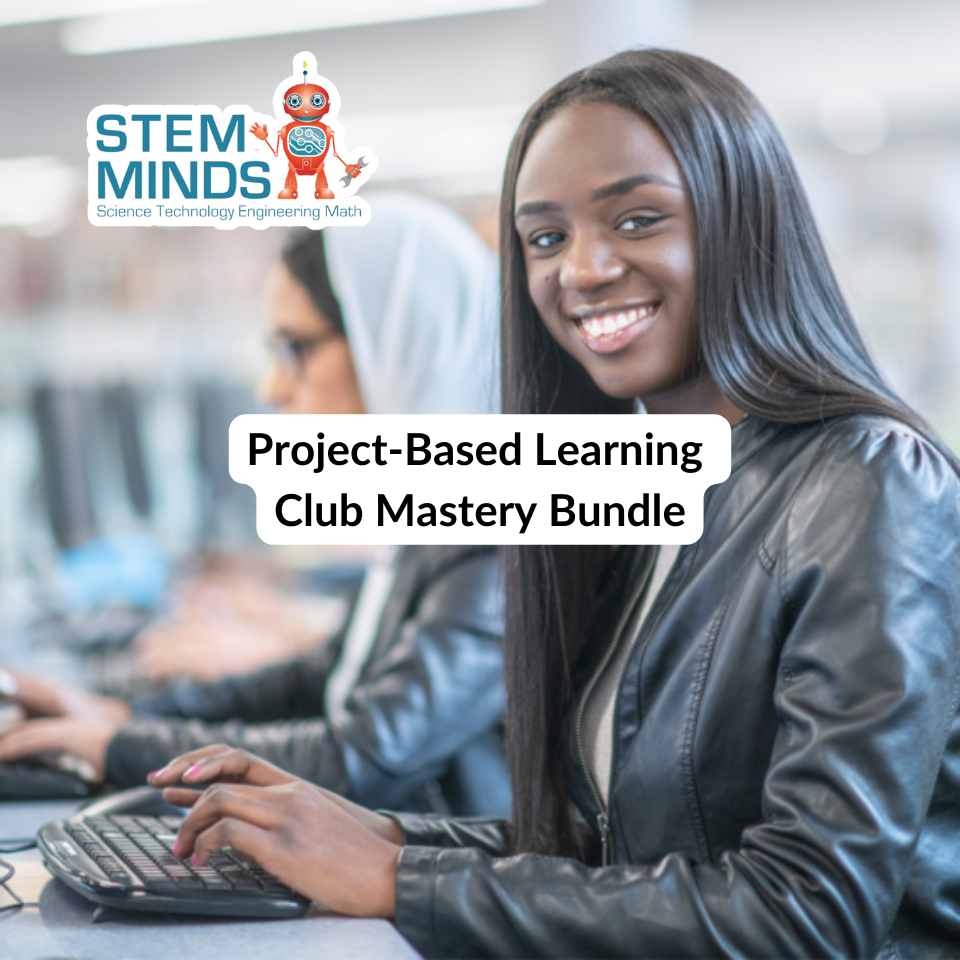
This bundle includes:
- Coding with Arduino
- 3D Design
- 2D Design
- Coding with Micro:Bit
Keep Up with the Latest STEM Minds News!

